#quote from an old and epic role play
Explore tagged Tumblr posts
Text
During campaign 1 Scanlan left the campaign. Just stood up and left the table, the rest of the cast was shook and furious, but it ended up working into a great storyline and introducing a new beloved character.
Keyleth fucking yeeted herself off a cliff because she though she was, and I quote, "basicaly a god". Instantly died what to this day one may consider the stupidiest death in critical role history, puting Vex (and Laura Bailey) in an awful situation that she must have hated but at the end of the day it was extremely funny and a moment to remember.
The campaign was over, Matt was preparing to close it all and have them live happily ever after, and Grog decides to pull a card from the fucking DECK OF MANY THINGS, JUST FOR FUNSIES!! Because it made sense to his character and also bc he was curious. Died in the act. All the characters had to press pause on their grief for Vax and their relief of it all being over to address the situation and a whole ass one-shot was made to bring him back. It was great.
Campaign 2, Jester went an pulled the fuckery of the century by attempting to modify the memory of an old, extremely powerful hag. The probability of that going south was real and for all we know, if the hag had succeded that wisdom save characters could have ended up dead. But it worked and I don't need to remind you how epic that was.
Also a lot of Mighty Nein shenanigans that were reckless and irresponsible and ended up turning out great, I'm just writting the ones at the top of my head.
What I'm trying to say is that maybe D&D is a game and maybe taking awfuly calculated risks pays off sometimes and others they don't, but maybe players have the right to be messy and reckless and even selfish sometimes, especially if it makes sense to their character. Yeah, what Ashton did was dumb and inconsiderate to the rest, especially Fearne. That happens. They are humans playing humans (or other races but you get where i'm going), it's bound to get messy and complicated and even ugly sometimes, that's what creates great storytelling, so be mad all you want but insulting Taliesin, calling him stuff and just attacking the cast in any way the moment they make a choice you don't like is dumb and unfair. I haven't forgotten the treatment Marisha got from the fandom during the entirety of Campaign 1 and I wont stand for any more of that shit. Learn to fucking behave yourselves.
171 notes
·
View notes
Note
(1/7) You know @rose-of-red-lake's theory about Dany being eaten by one of her dragons? The imagery used in these passages reminded me of these in AGoT, Arya III and Arya IV where she stumbles upon the dragons skulls under the Red Keep:
(7) I wonder if it could foreshadow Arya being the one killing the last living dragon(s?) after it goes fully wild and kills even its own “mother”. It would tie nicely with her training amongst the Faceless Men who were originally slaves working under the Fourteen Flames of Valyria and may be behind the Doom but also with Brandon Snow who wanted to assassinate Balerion Vhagar and Meraxes but was talked out of it by his brother. Arya the Dragonslayer sounds like quite the epic tale. Any thoughts?
Hi anon!
I left out the in-between messages, as they contained the relevant book quotes here, for ease of reading:
By the time she had reached eighty-seven, the room had begun to lighten as her eyes adjusted to the blackness. Slowly the shapes around her took on form. Huge empty eyes stared at her hungrily through the gloom, and dimly she saw the jagged shadows of long teeth. She had lost the count. She closed her eyes and bit her lip and sent the fear away. When she looked again, the monsters would be gone. Would never have been. She pretended that Syrio was beside her in the dark, whispering in her ear. Calm as still water, she told herself. Strong as a bear. Fierce as a wolverine. She opened her eyes again. The monsters were still there, but the fear was gone. Arya got to her feet, moving warily. The heads were all around her. She touched one, curious, wondering if it was real. Her fingertips brushed a massive jaw. It felt real enough. The bone was smooth beneath her hand, cold and hard to the touch. She ran her fingers down a tooth, black and sharp, a dagger made of darkness. It made her shiver. "It's dead," she said aloud. "It's just a skull, it can't hurt me." Yet somehow the monster seemed to know she was there. She could feel its empty eyes watching her through the gloom, and there was something in that dim, cavernous room that did not love her. She edged away from the skull and backed into a second, larger than the first. For an instant she could feel its teeth digging into her shoulder, as if it wanted a bite of her flesh. Arya whirled, felt leather catch and tear as a huge fang nipped at her jerkin, and then she was running. Another skull loomed ahead, the biggest monster of all, but Arya did not even slow. She leapt over a ridge of black teeth as tall as swords, dashed through hungry jaws, and threw herself against the door. (AGOT, Arya III)
and
This time the monsters did not frighten her. They seemed almost old friends. Arya held the candle over her head. With each step she took, the shadows moved against the walls, as if they were turning to watch her pass. "Dragons," she whispered. She slid Needle out from under her cloak. The slender blade seemed very small and the dragons very big, yet somehow Arya felt better with steel in her hand. (AGOT, Arya IV)
There is definitely a strong association between Arya and a confrontation with dragons. Whether that is simply being present during the burning of King's Landing, or whether this involves more is something I am not sure of.
I've moved away a bit from the idea of Arya killing Dany directly, but I don't doubt that her Faceless Man training, Syrio's training, her experiences in tunnels and darkness, warging, spying and deception will play a significant role.
I felt curiously reminded of this scene from ADWD, where Quentyn enters the dragon lair in the basement of the pyramid:
It was black beyond the doors, a sullen stygian darkness that seemed alive and threatening, hungry. Quentyn could sense that there was something in that darkness, coiled and waiting. Warrior, grant me courage, he prayed. He did not want to do this, but he saw no other way. Why else would Daenerys have shown me the dragons? She wants me to prove myself to her. Gerris handed him a torch. He stepped through the doors. The green one is Rhaegal, the white Viserion, he reminded himself. Use their names, command them, speak to them calmly but sternly. Master them, as Daenerys mastered Drogon in the pit. The girl had been alone, clad in wisps of silk, but fearless. I must not be afraid. She did it, so can I. The main thing was to show no fear. Animals can smell fear, and dragons … What did he know of dragons? What does any man know of dragons? They have been gone from the world for more than a century. (ADWD, The Dragontamer)
Darkness. No fear. Animals. Courage. Something you simply have to do. Something a girl can do.
Maybe, maybe not.
#rouka queue#asoiaf speculation#arya stark#dragonslayer#anti daenerys targaryen#<- for filtering#rouka ask
15 notes
·
View notes
Text
A conversation/interview video with Casey Hudson called "Casey Hudson Interview: Mass Effect Director on New Studio Humanoid Origin and His Next Game": [source and watch link] In the video they discuss topics like previous BioWare games and the early days at BioWare.
Part of video description:
"In this career-spanning interview, I talk to Mass Effect creator Casey Hudson about his philosophy on game development, projects like Star Wars: KotOR, and his new remote-friendly studio, Humanoid Origin, which is hard at work on an all-new sci-fi game IP."
Some quotes/notes under the cut:
Covid was a strange time for everyone. Casey was a studio head at BioWare when the pandemic and lockdown hit; everyone went home. this was very surreal, but he "was sitting in [his] home office as the General Manager for a studio of several hundred people", and "it kind of worked pretty well, and then it just makes you realize that if that's possible, then maybe you don't need the big infrastructure, huge studio locations, maybe there's a different way to do it."
Casey is also a concept artist. when they were starting creating Mass Effect, he was really concerned with the Citadel and what the shape of it was going to be, so he did tons of drawings trying to figure out what it would look like.
In the early days of BioWare, the old BioWare culture had devs often out dancing on Whyte Avenue. many of the devs in the early days at BW worked on Whyte Avenue. just downstairs from them is where all the bars and restaurants were, and many of the devs lived within walking distance. at that time work was most of their lives. if they wanted to meet their friends at the bar, they were just downstairs or across the street. "This is not a lifestyle that you wanna maintain into your 30s and 40s, but that's kind've what it was like at that time. But because it was so, I think it was a really narrow existence in a lot of ways and half of it is in the winter, bitterly cold outside, that we then first of all have a lot of time to focus and imagine something but also you then really start thinking of like, what does the escape look like? Where do you want to be right now? Instead of in the middle of the winter in Edmonton working 12 hours a day. Where would you, what do you fantasize about? That I think is kinda what propelled a lot of the vision for these really epic places and a sense of escapism." - Interestingly KOTOR and ME1 both have levels/scenes near the end with beaches.
It took people 15 years to notice that the sentence in the opening segment of ME1 "and the civilizations of the galaxy called it.. mass effect" was an homage to Top Gun ("the pilots call it Top Gun"). this was put in there because Casey used to want to be a fighter pilot when he was younger.
Why did they have the Reapers in ME, these lovecraftian terrifying horror things? They originate from 2 things. BW really envisioned ME as "imagine that there was a movie that came out in the late 70s or early 80s". it was to be kind of in the vein of Star Trek: The Wrath of Khan, or Alien, and like it was like a major sci-fi hit that just didn't get released, only now you get to play it and be in that experience. "So that's kind of where we went with, not necessarily horror, but that sort of sci-fi suspense feeling. And then I think the other piece was, we were just really swinging for the fences. like, if there's a threat, what is the biggest threat? And if you're gonna make a decision in this game, let's make them agonizing decisions of the highest stakes, and so ME kind've has this feeling like, of everything being big and important and difficult choices and huge scale. And I think that's where it came from."
99% of the creature models for Neverwinter Nights were thrown in the trash. Casey made a bunch of models over the course of a year, as a major part of his role that year. Then the D&D 3rd Edition rules came out with concepts in them for how things were supposed to look. "I believe what happened was we were asked to just snap to those concepts, so all of these character models that I had made were just never going to get used. the irony of it is the one thing that did end up getting used was the giant spider model I did in my first day or two."
(on his first day at BioWare they gave him a concept for a giant spider, and in his first week he made this spider monster model.)
early screenshots of NWN were from a prototype as opposed to the proper game engine.
the interviewer mentioned that the NWN era was a stressful time, a dark time at BioWare. the publisher was going bankrupt.
the co-founder doctors Ray and Greg were very good at providing an environment that felt stable because they were shielding the devs from a lot of the existential crisis the business was in, so it felt stable, but they also provided real stability. "The games that we worked on, for many years, everything we worked on shipped and became a good game that brought revenue into the studio and elevated our status as a developer. But I know that it was a lot rougher waters than what we experienced. I'm always curious to follow up with Rey and Greg and find out what that would have been like for them."
The interviewer then mentions that things then got a little more exploratory at the studio at that time, and the fact that there were some cancelled projects. Casey: "At that point, we were becoming larger as a studio and growing the number of projects we had at a given time. I think at one point there was just more projects than we could sustain in terms of focus and just the logistics of getting that many things out. Prior to that though we had an amazing run, it was very rare to be able to ship everything that you work on, and I think we had that for quite a while."
At that time in games development, devs just worked on the game they were working on all day. Nowadays in game development there's lots of other things they often have to do during their day at work (like instead of and in addition to). in his new studio, Casey said he wants to try and work smarter or faster, and without ending up doing crunch time, and without working on things that end up needing to be downscoped.
He also discussed the development of KOTOR at various points in the video and relayed some anecdotes about KOTOR. for example, Jolee Bindo is named after his imaginary friend from childhood that he had.
On the naming of Anthem: "So that one, I've only heard the story secondhand because I came into Anthem at the very end. I was on that project at the very, that was going to be the next full game that I was gonna work on right after ME3. We moved onto what was going to be our new IP and it was called Project Dylan at the time. I worked on Dylan for about a year before I left EA. I was at Microsoft for a while. then after a few years, that project was still going and then had actually been announced as Anthem and had its E3 debut. So they already had their name, as of that point. As I understand, that was another one where it's just, you try a number of different names, and at this point, there are just so many things being copy-written that it's really hard to find a name that isn't blocked by an existing product. But I thought that was a great name."
In the early days of BW they generally didn't have much interaction with the publisher. "It just really felt like we could just go off and design something that was true to itself and was amazing for what we were making". it's harder and harder to do this nowadays as publishers and studios get bigger and bigger.
[source]
13 notes
·
View notes
Note
Movies with Scarecrow vibes?
Ahhh, thank you so much for sending this! This might be long-winded, as I tend to be, but such is the way of Cranerot!
Naturally, Brian de Palma's Carrie. Aside from the plot and thematic matches almost eerily to Scarecrow: Year One to the point I'd be shocked if it wasn't a direct inspiration, de Palma's camp balanced with heartrending drama and tragedy and a horror where nearly everyone involved is a monster has Crane written all over it. I actually have several tracks from the score on my inspiration playlist for when I'm writing him!
Hellraiser (1987)! Jonathan Crane is so, so, so Cenobite-coded (highly recommend @acapelladitty's Cenobite!Crane AU, incidentally)! An old house filled with secrets, a plucky heroine whose sanity is doubted but who wins the day (at a great cost), and creatures that want to bring you to the height of sensation until the joy is inextricable from the anguish...it very much suits his more sensual reverent speeches/quotes about fear. "We have such sights to show you" could so easily be a Scarecrow quote, and likewise, "Eventually, the victim desires the horror" could very believably be a Pinhead line!
Since you mentioned it in The Most Poetical Topic, Night of the Hunter (1955) as a Southern noir quasi-folktale thriller absolutely suits the more charming, insidious iterations of Crane, in atmosphere, setting, antagonist, and in the themes of corrupted religion. The themes of childhood fears and defeating your demons while also struggling with their humanity both suit different phases of Jonathan Crane in his life, and the responses to and from the people he knows and terrorizes.
On the note of the South, O Brother Where Art Thou provides heavy atmosphere that give off Crane vibes, bringing a mythic epic to the setting of his backstory, with the music and monsters therein giving a good feel of everything that built the man and the monster.
Also naturally, many a mad scientist movie! The Cabinet of Dr. Caligari gives us a corrupt asylum director who torments his patients until he eventually becomes one of them, and Re-Animator gives us an actual former Scarecrow actor, Jeffrey Combs, in a very Crane-like role when it comes to being penalized in academica for horrific and unethical experiments. (It's even set in the original Arkham for which Gotham's is named!!) The Fly isn't quite as on point, but it does still give those vibes as well. And although the degree of 'madness' when he plays him is debatable, any of Cushing's roles as any member of the Frankenstein family come to mind since he's very much an old school!Crane figure.
A Nightmare on Elm Street (1984): yes, yes, 'look out for Mr. Pricky-Fingers', in the words of Codotverse!Scarecrow, but fear gauntlets/needles gloves aside, Freddy is the boogeyman who is literally fed on fears, and he much better gives the feel of a distinctly Scarecrowish tormentor than, say, your average Pennywise or other. Nancy's speech to him at the end is highly reminiscent of those who've managed to successfully stand up to Crane over the years, too.
Halloween (1978): On the note of boogeymen, and other than the "one good scare" quote you yourself have mentioned, I imagine Scarecrow to move and function a lot like Michael Meyers; slow, creeping, inevitable. Every kid in Gotham City thinks this place is haunted. They might be right!
For the pure fanservice of it/JonBecky vibes, let's say both the Lon Chaney and Charles Dance Phantom of the Operas, Death Takes a Holiday (1934), The Shape of Water, and The Ghost and Mrs. Muir inspire how I conceive of the more romantic side of our beloved Scarecrow. I'll throw in Silence of the Lambs as well, since that gives us an incarcerated evil psychiatrist meeting his match in an intrepid young woman involved with the law who he forces to face her formative traumas, but who manages to come out on top despite his machinations.
A few Hitchcocks, honestly! The Birds is outright referenced in Year One and definitely gives life to the visceral horrors he underwent in the old Keeny chapel, whereas Vertigo more in atmosphere and obsession captures a lot of torment he experiences. I also do see shades of crane even in Norman Bates' "private traps" speech!
Thanks so much for sending this along!
41 notes
·
View notes
Text
Megalopolis (2024) review
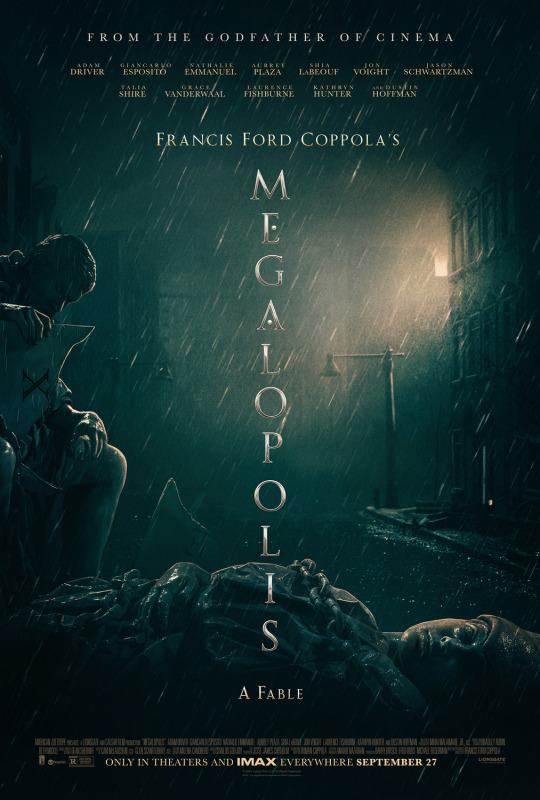
My brain is fried.
Plot: A conflict between Cesar, a genius artist who seeks to leap into a utopian, idealistic future, and his opposition, Mayor Franklyn Cicero, who remains committed to a regressive status quo, perpetuating greed, special interests, and partisan warfare.
Going into Megalopolis all I knew about the movie thanks to its marketing and early reception is that it’s directed by Francis Ford Coppola. Now having seen it, I still only know that this movie is directed by Francis Ford Coppola. I am power phrasing of course, but essentially this thing is us stepping into the crazy mind of Mr Coppola and getting lost in his nonsense. For nonsense is what this epic is. You can argue that there are some bold philosophical discussions within it and the theme of drawing parallels between the fall of Rome and the future of the United States is an interesting one, however at the end of the day this is an old man yapping a lot and wanting to be heard when he can’t even formulate a full sentence.
Speaking of sentences, let’s start with the script. FFC has juiced this baby up with Tommy Wiseau levels of herbs and spices, with characters spilling out lines of dialogue that are so outlandish and bizarre in both the delivery and context that for the most part you cannot help but laugh, even though I don’t believe that was Coppola’s intention. I mean really, someone needs to make a count of how many times Adam Driver says the word “time” in this movie. Then there are moments where characters are literally quoting Shakespeare, Marcus Aurelius and Plutarch and other philosophers as if the movie is trying to make a statement, except that it doesn’t have anything of significance to say. We jump from one bizarre scene to other, often being given narrative plot points that are completely forgotten about and never referred to again from the next scene onwards. The whole piece feels like a massive cheesy fever dream, and without a shadow of a doubt I can say I’ve never seen another film like it before nor will I ever.
The stacked ensemble cast also does not fair too well. For one they don’t really play characters, but more so their roles, though they have names, are more so walking metaphors/ideologies, which only adds to the confusion. Adam Driver I believe essentially plays Francis Ford Coppola himself, with Driver as an architect wanting to create his own unique dream city of Megalopolis a reflection of Coppola’s filmmaking passion to direct a unique movie that he himself wants to make, and one that is entirely his vision that no studio interference can meddle with, for better or worse. Driver isn’t great, but I expect he was doing exactly what Coppola was asking him to do, even though it’s really wooden and lifeless. Nathalie Emmanuel as his girlfriend was actually atrocious, delivering each line as if she’s performing in a school play, over enunciating every single word. Giancarlo Esposito….I mean I guess he’s alright, but he’s just Gus from Breaking Bad who’s turned mayor. Jon Voight looks like a drunk Judi Dench, Laurence Fishburne is Adam Driver’s personal chauffeur who for some reason also narrates the whole darn thing even though his character has jack all to do with anything, and Dustin Hoffman walks around a lot looking really lost. We are too Dustin, we are too. The only two actors who seem to know what type of movie they are in are Aubrey Plaza and Shia LaBeouf. They are extremely over-the-top and feel like they are really self-aware of the unintentionally funny lines of the script, so they fully throw themselves into the ridiculousness of it all which results in them two actually being really entertaining to watch.
Visually Megalopolis stupefies me. On one side the world building is beautiful with so much unusual and special imagery that really pops, but at the same time it’s also extremely ugly and unappealing to look at. It feels like the special effects are super cheap and could have been done by a toddler, but also it’s a look that’s so different and out there that it’s also fantastical.
The movie is a bloated mess. It’s truly mad, pretentious and up its creator’s own arse. But at the same time I find it hard not to respect the heck out of Francis Ford Coppola’s ambition. The guy literally sold part of his winery business to fund this film, he has worked on it for 40 fricking years, gone through endless production issues and delays, then had issues finding a distributor and getting mixed to negative reviews at the Cannes film festival premiere, to then the botched marketing campaign from Lionsgate as well as that weird controversy about him kissing random women on set of Megalopolis and other inappropriate behaviour…. This movie’s behind the scenes shenanigans would make for a fascinating documentary which I’m certain a streamer such as Netflix will for sure bring to life some time down the road. But again, if there’s anything to take out of Megalopolis is that FFC is a massive cinematic pioneer with his own distinct vision and someone who’s strives to break the norms of filmmaking. In fact I only recently discovered through the Criterion Collection the 1980 samurai war epic Kagemusha by Akira Kurosawa, and the interesting aspect to that film (besides it being an absolute blast) is that it was partly funded by George Lucas and Francis Ford Coppola, both of whom wanted to support filmmakers who had something special and different to say, like Kurosawa. So Coppola is no stranger to big cinematic aspirations and has, throughout his entire career, been a leading figure in the evolvement of the film movement, and for good reason is considered as one of the greatest directors of all time. For that reason alone Megalopolis is worth going to see.
Again, I want to emphasise - Megalopolis is not a good movie. But in the current superhero saturated Hollywood climate it’s a different kind of cinematic event, so a perfect palette cleanser for true cinephiles. Even though, let’s be honest. Francis Ford Coppola really did just unload his load all over us and then some!
Overall score: 4/10
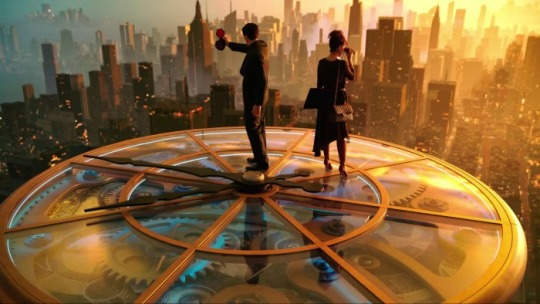
#megalopolis#movie#movie reviews#film#film reviews#drama#cinema#francis ford coppola#cinephile#time#adam driver#aubrey plaza#shia labeouf#jon voight#giancarlo esposito#laurence fishburne#dustin hoffman#nathalie emmanuel#jason schwartzman#kathryn hunter#imax#megalopolis a fable#science fiction#epic#roman empire#lionsgate#2024#2024 films#2024 in film#kagemusha
5 notes
·
View notes
Text
Shocker (1989)
Directed by: Wes Craven Genre: Horror, comedy
CW: Gore?? Mostly blood in excess at times but I can't really say it's that bad. Originally written 11/25/2022

So when this was originally written I had been in the process of watching this movie for the third time in two days. This film had and still does affect me. I love quoting it and sending this reaction gif from it.

GIF by vhs-ninja
Is it any good? Yes.... but it's complicated. A poster like this doesn't quite scream quality does it? I think Shocker boasts a unique experience, though I don't think its good by traditional standards.
So, part of the appeal for me with this film is it's issues. Not quite in the "so bad its good way" either, though that phenomenon has a bit of a roll to play here. There is this bizarre charm to it's wrong or weird choices. It has a sort of sincerity to it which I don't know how to explain without just sitting you in front of the movie and having you watch it.
The movie is absurd and self aware enough about this fact that the bizarre choices end up being very likeable. At the same time, parts of the movie's plot seem haphazard and confusing in their lack of sense. Silliness pervades every aspect of this film.
The movie is an intense cat and mouse thriller, but it's bad guy has electricity powers and says one liners like "Come on boy. Let's take a ride in my Voltswagon!"
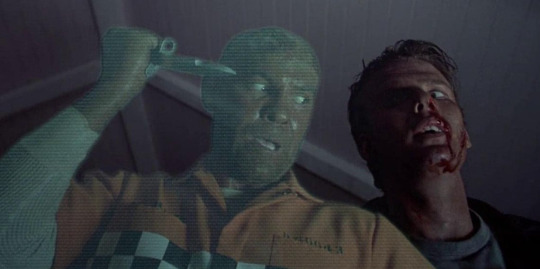
And I think it's this strange combination of high angst and on the nose puns that has gripped me so much. There is a certain delight in giggling away as the main character gets attacked by the bad guy who is now possessing a chair. Or a scene the bad guy is making a deal with the devil and the devil appears as a pair of giant lips and says, "You got it, baby".
Shocker fills a niche role where its possible for all these things to coincide. I mean where else will you have a big epic punching match through a series of tv channels?
So, I'm trying to be fair here but there is difficulty in rating this movie because I am very taken with this movie. It's not a great film, but it offers you a great time.
So our movie begins on the football field. Jonathan Parker is your average college football jock.. But is he!?!? Well yes, but he’s got a sordid past that he doesn’t remember (yet). Upon receiving a concussion at practice, he is imbued with psychic powers that activate when he sleeps.
His dreams show him the murders of Horace Pinker, a serial killer who has been killing local families. No one seems to be able to track him at all as he leaves virtually no trace, but Jonathan’s visions give him a pretty precise depiction and even lead him to active crime scenes. Though, confusingly (though frankly it does not matter) it seems as though Jonathan can interact with Pinker in the dreams as well.
Since Johnathan's father's a cop, Jonathan quickly convinces him that he can help the police catch this guy, and that is exactly what they manage to do, though not without a few officers getting brutally murdered along the way.
Well, now that we've caught him- it's time for the electric chair BABY LETS GOOOO and thus begins the meat and potatoes of this movie- the cat and mouse chase between Jonathan and the body hopping electricity wielding Horace.
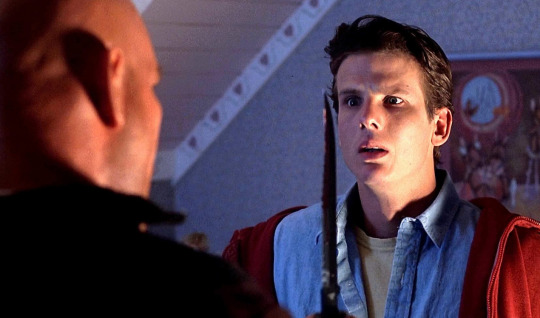
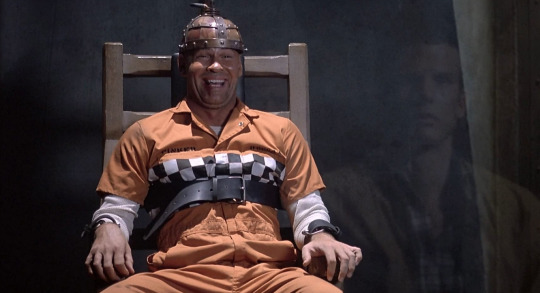
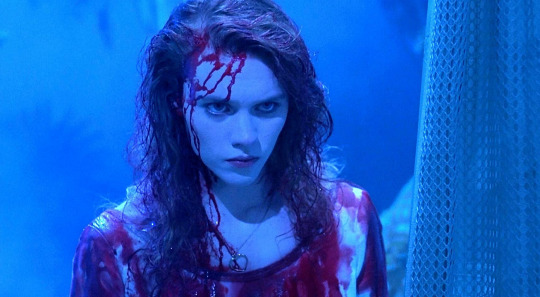
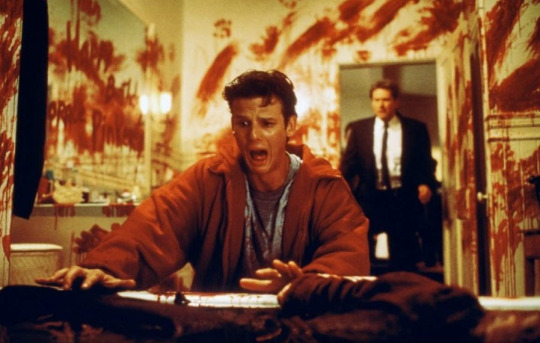
During all this we get some hilarious moments including my favorite chair scene. Horace posses a handful of people, including a little ten year old. She commandeers a bulldozer to try and kill Jonathan.
The goofiness is peak here.
But as I said, the movie lacks in other areas. Explanations are very short coming. There is no explanation for why Jonathan receives these powers from a concussion- after all this is football we're talking about. Surely every man out there has had at least one before.
Why is only Jonathan's dead girlfriend able to communicate with Horace? I think it's because of the power of love but there is no in universe logic that explains it.
And what about these visions? It seems unclear how much ability Jonathan has to interact with those within it. At some points it seems like they should think him legitimately there, and other times it feels like they couldn't possibly.
I must say though, while there are a plethora of inconsistencies and plot-holes, I was largely unbothered by them. Some how this is one of those movies that tickles my fancy in just the right way so as to get me to not care. It's immaterial and after seeing this movie a total of four times, I've never been left wanting more than I've already been given.
I think I am compelled to give this movie a rating in the 6-7 range, but closer to a six. That being said, I sort of wish everyone and their mothers would see it. That chair scene is a cinematic masterpiece.
2 notes
·
View notes
Note
💬!!!!!!! 💬💬💬!!!!!!!!!! And also 🖋️ for whichever OC you're feeling; I want to know all about them ❤️💖💕💝💘💓💗💖
i'll give you all four of the quotes, just because i want to (it's bc you're very excited and very sweet). im gonna drop a read more in though, bc this is gonna be a Long PostTM
💬"Confident, like part of him doesn’t feel like the ten-year-old that sat on the couch cushion next to Dad feeling the imperfection of the universe for the first time."
💬"Dad had looked at him, simply explaining Just because you grow up doesn’t mean you stop wanting your mom sometimes, Karu."
💬“Nothing,” Grandpa says immediately, looking up from Hikaru’s hand to make unusually intense eye contact. “You did nothing to deserve this, Hikaru.”
💬"Cars breeze past on the street in front of the house, their headlights occasionally catching a piece of the backyard. Dad hadn’t turned on the light over the steps when he came out, but he’s illuminated by the light from the window in the door back into the kitchen."
🖋️chosen oc: hyeon
i'm doing my best to do this sans-spoilers!
i picked hyeon bc he's probably the first oc i fully fleshed out for this fic, and possibly maybe a little bit my favorite. he's hikaru's dad, and as such plays a prominent role in hikaru!epic. he's very much a Family Guy (affectionate) and is deeply in love with his wife and loves being a dad. certified history nerd. is perpetually a little confused, but he's got the spirit. incredibly sweet but also a massive smart ass. incredibly protective over the people he loves. might be the same shape as a bean pole. i love him
5 notes
·
View notes
Text
Music Safari NYC, the final week . . .
[This post covers January 8, 9, 10, 11.]
Monday, January 8 . . . The Yes Trio at Dizzy's . . .
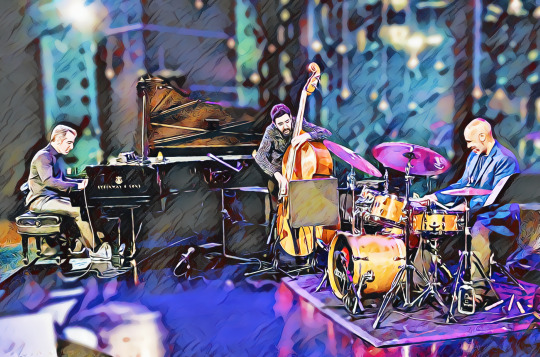
Aaron Goldberg at the piano, Omer Avital on bass, and Ali Jackson on percussion.

The playing was extraordinarily interactive and collaborative. There were remarkably few "solos."
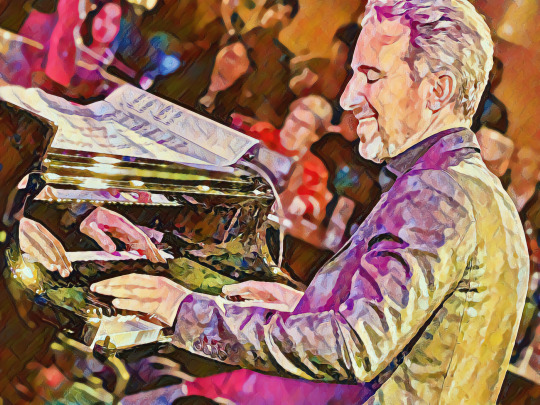
Frequently the instruments played in dialog, or trialog. It was obvious that these guys have played together for over 30 years.
Tuesdays in NYC are synonymous with Monas! On Tuesday, January 9, the house band was epic.
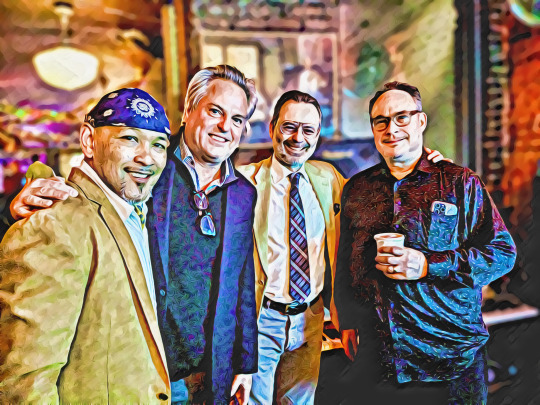
This is Evan Christopher, distinguished New Orleans visitor Duke Heitger, Rossano Sportiello and Jon-Erik Kellso. Also in the house band, birthday boy Tal Ronen and band leader pro tempore Josh Dunn.
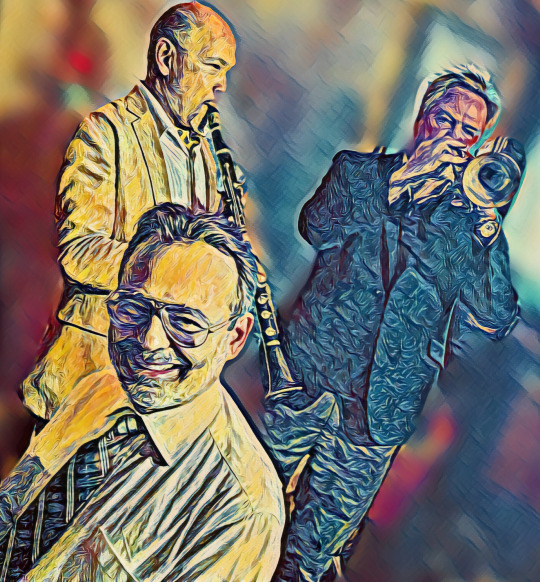
Rossano and I are good friends.
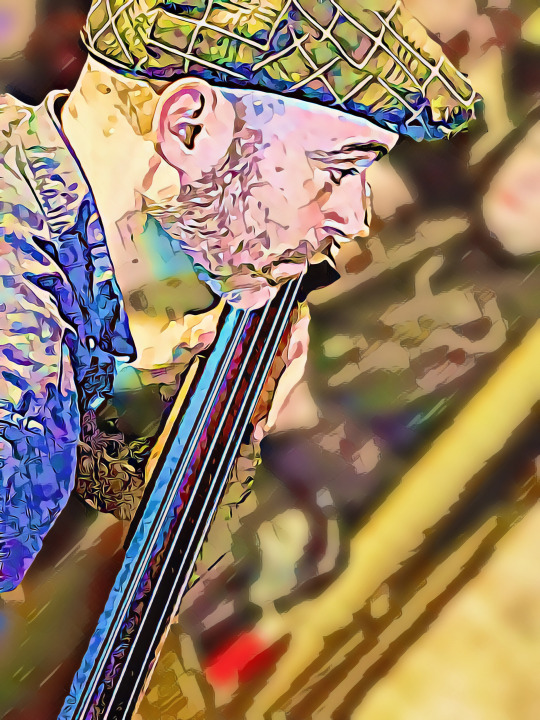
Bass player Tal turned 43 at that gig. Singing, cake, candles, and the whole works.
The music was extraordinary. Evan Christopher's clarinet was over the top, and with Kellso's trumpet, they rattled the roof. I spent most of the night looking at the back of Josh Dunn's head, but that did not diminish my appreciation for his subtle, well-rounded, imaginatively crafted guitar playing. Rossano's piano playing mostly stayed back, in a support role. He finally leaned into it for the last few songs. Tal's bass was excellent, as always.
Two essential people were missing from the festivities. Aidan Grant was out sick, and Dennis Lichtman was in New Orleans. I missed them.
On Wednesday, January 10, the biggest game was out in the Brooklyn jungle - The Big Lazy with special guest Katie Martucci were playing at LunÁtico.
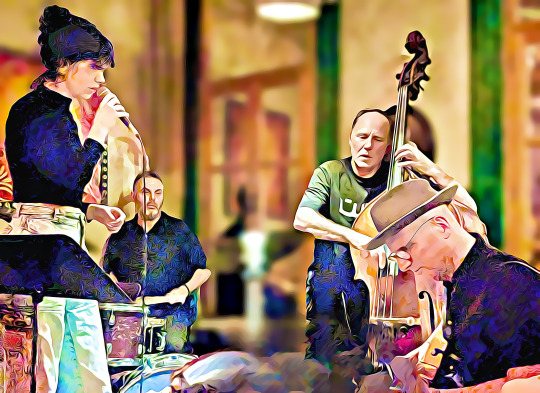
The Big Lazy. L to R, that's Katie Martucci on vocals, Yuval Lion on percussion, Andrew Hall on bass and band leader Steve Ulrich on guitar.
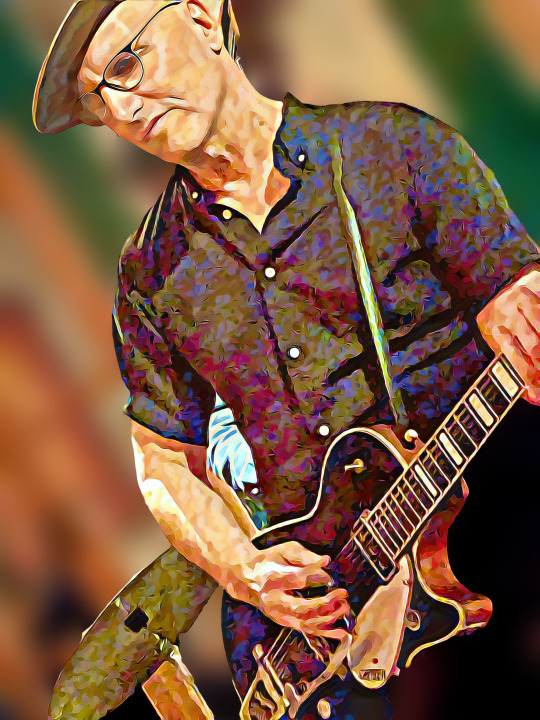
Imagine the music of Dick Dale and Duane Eddy transposed into the information age. Twang-on-twang. The guitar work of Steve Ulrich was remarkably captivating.

Josh Dunn , the leader of the Mona's jam last Tuesday, showed up at The Big Lazy's gig. I never got a good shot of him that night, but now, here he is!
On Thursday, January 11, at Neal's strong suggestion, we went to Sxip Shirey's Hour of Charm at Joe's Pub.
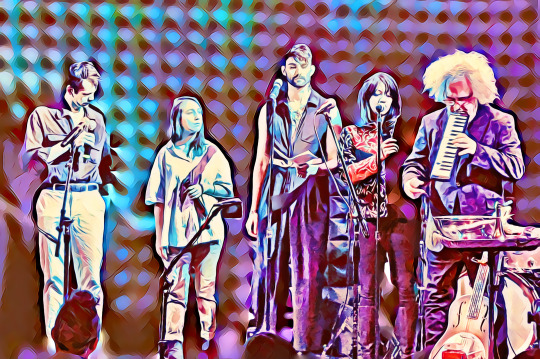
It was more than a set or a gig. It was a revue. In addition to Sxip (pronounced "skip" I think), included vocalist and composer Priya Darshini, cabaret power couple John Coons and Matta Aument, dancer Coco Karol, vocalist Aimee Curl, vocalist Raquel Klein, guitar innovator Asher Kuntz, John Altieri on tuba, etc., and Attis Clopton on drums.
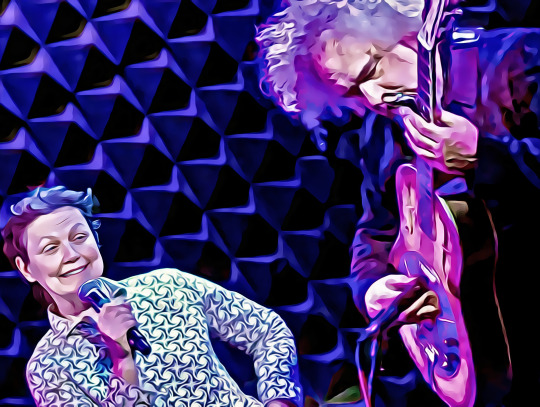
Aimee Curl has a voice I want to hear again!

There was too much going on for me to digest it all. So I'm going to quote from the Joe's Pub publicity.
Shirey tests the edge of music using his vast imagination to create playful and mischievous songs using familiar objects, mutant instruments, electronics and reconfigured sounds. He is a curious combination of composer/ sound designer/ performer meets storyteller/ curator.
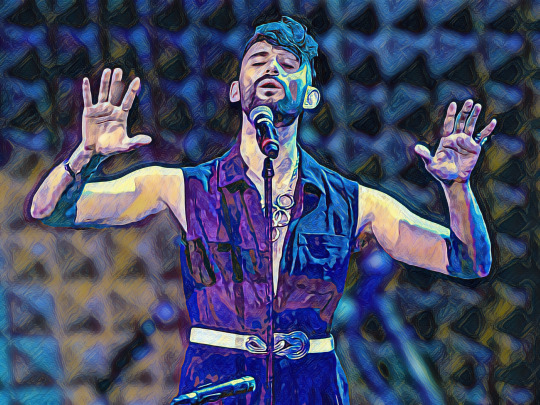
John Coons was channeling something I'm just not hip enough, or gay enough, or young enough, or urban enough to get. Mostly. What I could understand of his shtick/poetry/song/standup performance was, yeah, bang-on. Like, maybe, naughty Freddy Mercury playing a small room.

For the grand finale, Sxip did this piece with a harmonica played through a dozen pedals, a bullhorn that made siren and other cop-car noises, and a tuba. It was a caricature of New York City's sonic landscape that rang true. WOW. Or as Sxip might say, "Holy F**k."
"We're not done yet," said Neal. We hopped over to Foxtail, a quiet, upscale bar in the West Village. The house band was "old home."
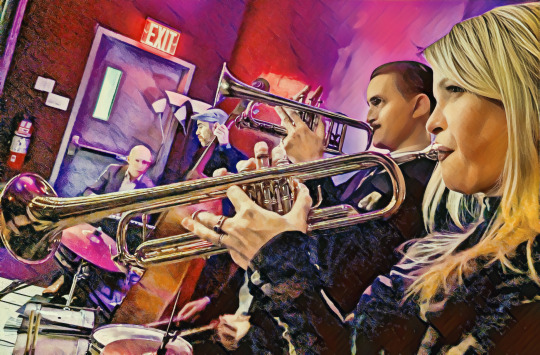
That's Bria Skonberg and Mike Davis on trumpets, with Conal Fowkes on piano and Tal Ronen on bass.

The master of understatement, Kevin Dorn on drums, Tal on bass, Conal on keys.

Mike Davis, Tal in background.

Bria, playing for Molly Ryan and Kayla Lewis at the bar.
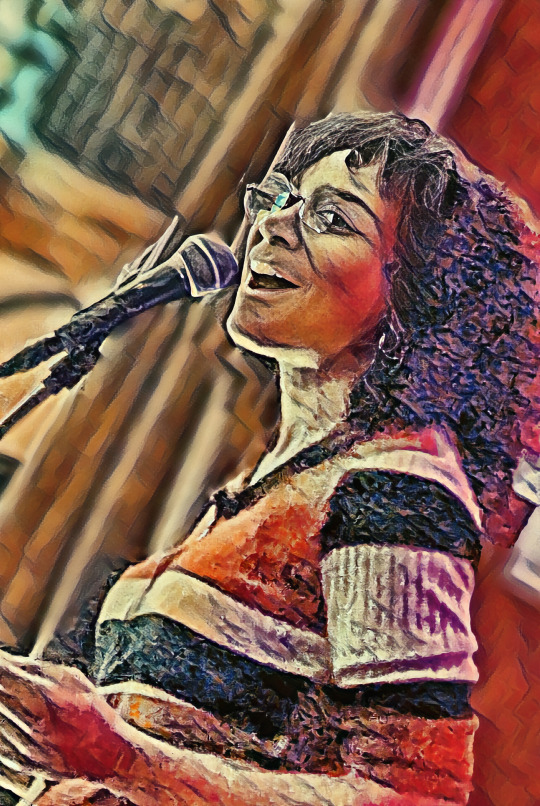
Kayla Lewis. When she sang, it felt like being in the presence of a Billie or an Ella. What a great singer. Kayla! Lewis! The Foxtail thing was simply, amazingly great. I felt like I'd been to church.
On Friday, January 12, the last day of my musical trek, Neal and I hit Joe's Pub for what was billed as a Bria Skonberg/Anat Cohen gig. It was actually two independent concerts, back to back.
Anat and her band were up first.

There were several choros and what sounded like a Monk tune. Each was merely a platform for Anat's incredible musical ideas. Each time I started to understand where she was going, she went off into a new, equally tantalizing dimension. I wish I had a recording.
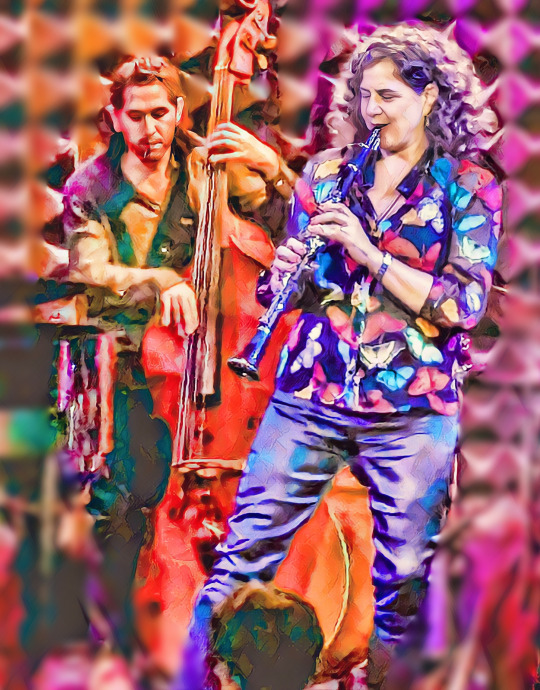
That's Tal Mashiach on bass. The band also included Vitor Gonçalves on piano and accordion (see below), and James Shipp on percussion and vibraphone.
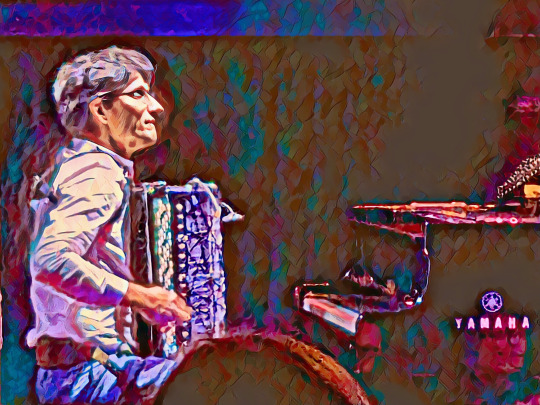
Vitor Gonçalves anchors an important corner of the Brazilian music community in NYC. His creative force complemented and spurred Anat's playing.
Up next, Bria Skonberg:
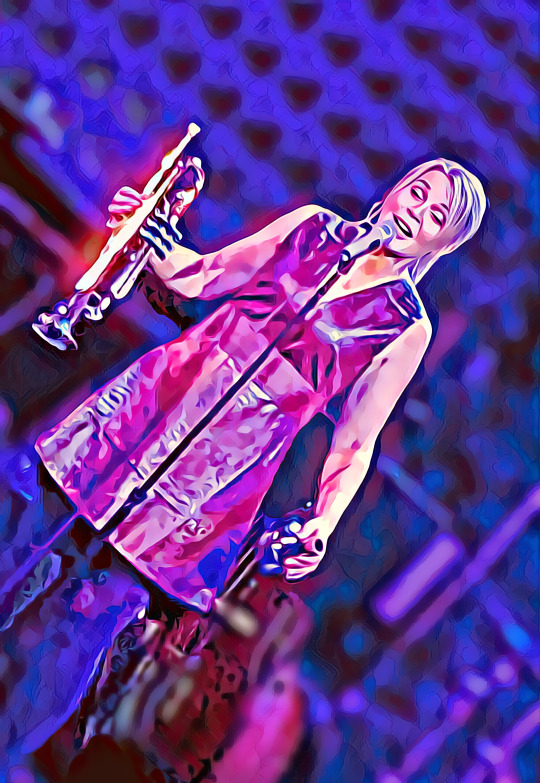
I only knew one other person in Bria's band - the awesome Mathis Picard on piano. I'll get you the other names . . . it was a killa band.
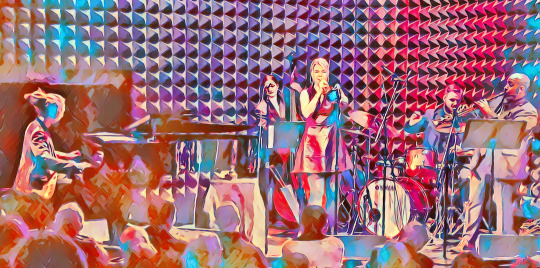
Mathis played one amazing solo.
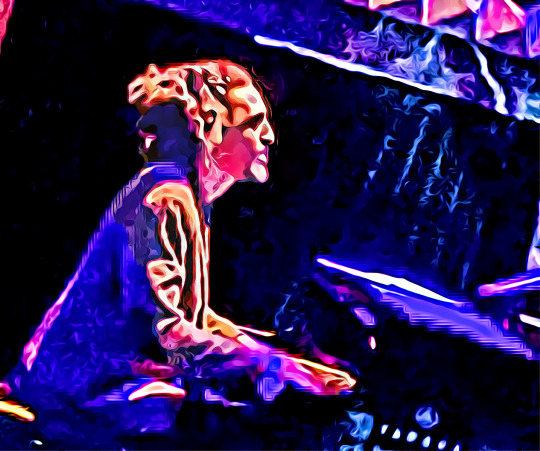
Now I am going home. It's time. But it has been one helluva ride!
This morning Anat sent me this:
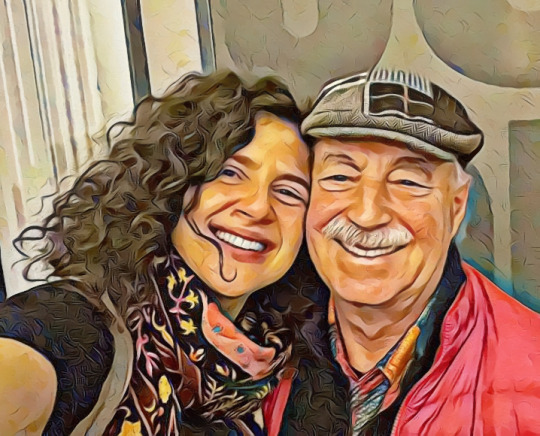
0 notes
Video
youtube
Epic roadtrip on the East of the Island of Mauritius.
Grand River South East (GRSE) is this incredible village in the southeast of Mauritius, right by the Indian Ocean. Back in the 17th century, the Dutch named it Groote River (Great River) because they used it to stock and ship ebony wood. Nowadays, the people in GRSE mostly make a living by fishing, and the village has cool local groups and things to check out. There's even a waterfall, and it's super popular with both tourists and locals.
Allow me to quote YAGNISHSING DAWOOR.
Now, there's this jungle, right? And these fancy villas pop up from it, all cool and covered in stucco. They kind of take up a bunch of space, especially the rich folks' part. A bit of where I'm from got covered up when they built these fancy houses and their even fancier twin, the Anahita. I got worried once during this big tide day when there was a massive earthquake in Sumatra in 2004. I thought the village might get washed away, and bits of our lives might end up in Africa, where most of our people are from. It felt like this weird reverse middle passage. Little did I know then that there are other ways places can disappear, like humans messing things up or making deals that change how a place looks or lives.
What I'm telling you about this place comes from a mix of real moments, things I've felt, stories I half-heard while half-asleep, and maybe some stuff I made up. I found old photos from ages ago, all sepia-toned and mysterious, hiding in drawers that lost their keys.
So, this fishing village is a big deal for me, especially because of my late grandmother, Devi Sri Manti. Imagine her porch with stone steps, and she's there, crouching and weeding with her hair all oily. You can see the sea from her yard, and it's like this ghost moving away with a huge, blue sheet between its strides. The Bambou Range and Mont Villars in the distance, with smoky shadows coming down at sundown. Lights from far-away houses. Some days, it still feels exactly like that.
Even though trees block the view of our house from the main road, it's just a short walk from the village milestone and not far from where we grab groceries. The house is a bit crumbly, but it's got this timeless sea-feel to it. My uncle's always in the backyard with his boat, fixing it up to keep the seawater out. He's got cool stories from the edges of unknown waters. "We come from India and Africa," he'd say, "we're all their sons and daughters." Sometimes, he talks about our memories scattered at sea, lost and unclaimed.
Past the street with speedboats and food vans, there's this sludgy strip where the Grand River meets the sea. Sadly, it took lives last year, including a two-year-old and a woman trying to save him. This old river mouth is magnetic, dangerous, and without its challenges, it might just disappear. It's like the heart of the place, you know? If it goes away, the village might lose its essence and vanish.
The fishermen of the east coast of Mauritius play a vital role in the local economy and culture. Fishing has been a traditional way of life in Mauritius for centuries, and the east coast, with its abundant marine resources, has a thriving community of fishermen. Here are some aspects of the fisherman's life on the east coast:
Lifestyle:
Fishing is not just an occupation; it's a way of life for many families on the east coast. The fishermen often follow a daily routine dictated by the tides, weather conditions, and the seasonal migration of fish.
Traditional Techniques:
Many fishermen on the east coast use traditional fishing techniques that have been passed down through generations. This includes using handcrafted wooden boats, nets, and lines. Traditional pirogues, a type of small canoe, are still commonly used for nearshore fishing.
Variety of Fish:
The east coast of Mauritius is known for its rich marine biodiversity. Fishermen here catch a variety of fish, including tuna, dorado, kingfish, grouper, and snapper. The abundance of fish contributes to the livelihoods of the fishing communities.
Fishing Villages:
The east coast is dotted with fishing villages where you can find colorful boats lined up along the shores. These villages often have a close-knit community, and fishing is not just a profession but a shared identity.
Fish Markets:
The catch from the east coast makes its way to local fish markets, providing fresh seafood to both locals and visitors. Markets in towns like Mahebourg and Flacq are vibrant places where you can experience the bustling trade of freshly caught fish.
Challenges:
Like fishermen worldwide, those on the east coast face challenges such as changing weather patterns, overfishing concerns, and environmental issues. They are also adapting to modern technology to enhance their fishing methods while maintaining a balance with sustainable practices.
Cultural Heritage:
Fishing on the east coast is not just an economic activity; it's deeply intertwined with the cultural heritage of the region. Many cultural events and festivals celebrate the fishing traditions, and the knowledge of the sea is passed down from one generation to the next.
Community Spirit:
The sense of community among the fishermen is strong. They often collaborate to share knowledge, resources, and assistance when needed. Community-based initiatives for sustainable fishing practices are also gaining traction.
Tourism and Fishing:
With the growth of tourism in Mauritius, some fishermen on the east coast may also engage in providing fishing experiences for tourists. This allows visitors to learn about traditional fishing methods and experience the daily life of a fisherman.
The fishermen of the east coast of Mauritius contribute not only to the local economy but also to the cultural richness of the region. Their way of life reflects a harmonious relationship with the sea and the traditions that have sustained communities for generations.
The roads on the east coast of Mauritius are pretty good – all smooth and well-kept. But, you know, there are some things you should watch out for when you're driving:
Traffic: Sometimes, the road can get pretty busy, especially during rush hours and holidays. You might find slow drivers, big buses, trucks, and people walking around. Just be patient and careful.
Road closures: Every now and then, a part of the road might be closed for fixing stuff or building things. It could mess up your plans, so it's a good idea to check if everything's clear before you head out.
Road signs: Most of the signs are easy to understand, but they might not always show the names of places in English. Some places have different names in English and French, so keep an eye out for both. Like Trou d’Eau Douce is also called Deux Frères, and Poste La Fayette is also called Poste de Flacq.
Road conditions: The road is usually smooth, but it can change depending on the weather. Sometimes it gets narrow, twisty, or hilly, so take it slow. Watch out for potholes, speed bumps, and maybe even some animals on the road.
Fort Hendrik was a small fort built by the Dutch in 1638 on the southeast coast of Mauritius, near the village of Vieux Grand Port. It was named after Frederik Hendrik, the stadtholder of the Netherlands and the brother of Prince Maurice, after whom Mauritius was named. The fort was destroyed by fire in 1695 and later rebuilt by the French, who also established a settlement around it. The site is now a historical museum that displays artifacts and ruins from the colonial era.
The first place where the Dutch landed in Mauritius was Grand Port. The Dutch were the first Europeans to arrive on the island in 1598. They named the island "Mauritius" in honor of Prince Maurice of Nassau, who was a key figure in the Dutch Republic.
Here are some key points about the Dutch landing in Grand Port:
Historical Context:
The Dutch East India Company, led by Admiral Wybrand Van Warwijck, made the first recorded landing on the island in 1598 during an expedition to the East Indies. However, their initial attempt to establish a settlement was not successful.
Abandonment and Rediscovery:
The Dutch abandoned Mauritius after their first attempt, and the island remained uninhabited by Europeans for several decades. It was later rediscovered by the Dutch in 1638 when they established a more permanent presence.
Grand Port:
Grand Port, located on the southeast coast of the island, played a significant role in the early Dutch exploration and colonization efforts. The natural harbor at Grand Port provided a strategic location for ships to anchor and replenish supplies.
Ebony Exploitation:
One of the primary reasons for the Dutch interest in Mauritius was the abundance of ebony trees. The Dutch exploited these ebony forests for their valuable wood, which was highly sought after in European markets.
Limited Settlement:
While the Dutch had a presence in Mauritius, their attempts at establishing a permanent settlement were limited. The harsh conditions, including cyclones and a lack of freshwater sources, made sustained colonization challenging.
Abandonment and Arrival of Other Colonizers:
The Dutch ultimately abandoned their efforts in Mauritius in the mid-17th century. Subsequently, the French and later the British arrived on the island, each leaving their mark on its history and culture.
Legacy:
Despite the relatively brief Dutch presence, their initial exploration and exploitation of resources, especially ebony, left a lasting impact on Mauritius. The island's history is a complex tapestry woven by various colonial powers.
While Grand Port was the first landing site for the Dutch in Mauritius, subsequent colonial powers contributed significantly to the island's development and cultural heritage. Today, Grand Port is known not only for its historical significance but also for its picturesque landscapes and rich marine life.
0 notes
Text
"It's okay to be hurt sometimes. It's how you learn about others and about yourself. The best qualities can come from those who are in pain - you learn to have empathy. You learn about kindness and love."
The words sounded extremely cheesy, but he knew he meant every word he was saying. Life itself was full of cheesy, happy moments. Caden loved life.
"Those who withdraw from others are cowards. They have so much they can give to others, and yet...they are selfish. No, refusing to share with others is more of a weakness than trust."
Hailey Rutherford 2012
#dat me#personal#oc#quote from an old and epic role play#Caden was a fun character and quite the opposite of my main guy Justyn#writing#philosophy
4 notes
·
View notes
Note
So I finally made it to the end of my The Borgias rewatch and DAMN that final scene really is so dark. The way Lucrezia responds to Cesare’s touch even with a literal bloody body next to her like WOW. They really remind me of that old Veronica Mars quote, “I thought our story was epic, you know. You and me. Spanning years and continents. Lives ruined and bloodshed. Epic.”
i didn't watch veronica mars but that absolutely fits!
oh my god, the ending scene, should we talk about it? let's talk about it.
it’s not really going to be a long response, i don’t think, but that doesn’t mean there aren’t many layers to the scene because i feel like so many things come full circle with that episode
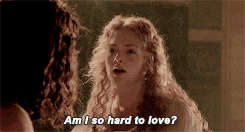
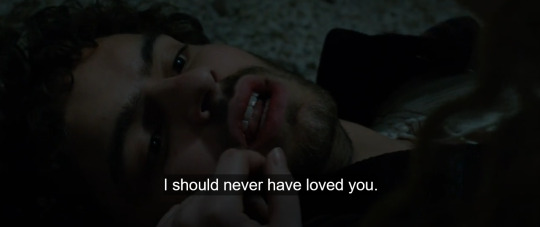
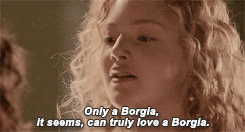
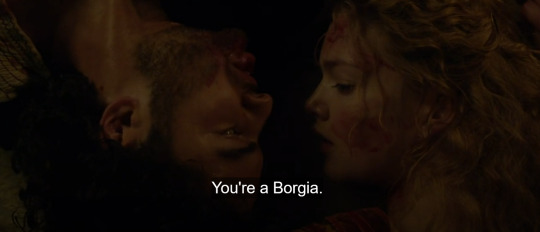
and therefore that moment. like can we talk about the characterization of their connection as this life-altering religious experience
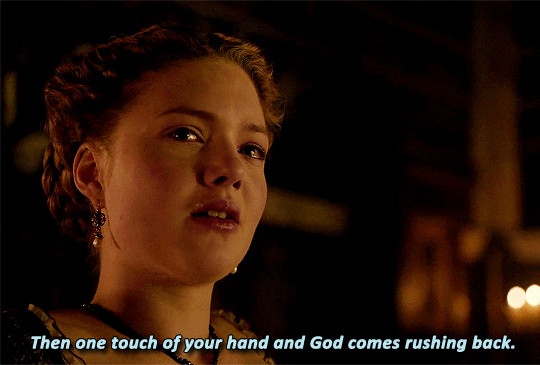
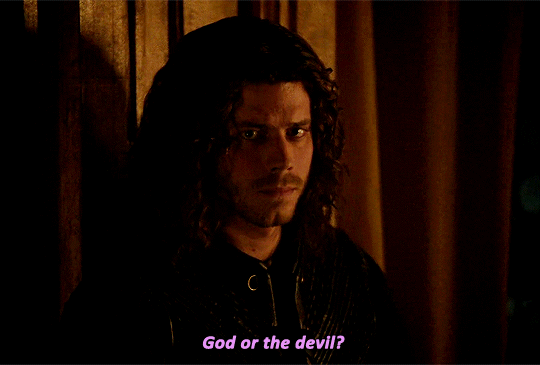
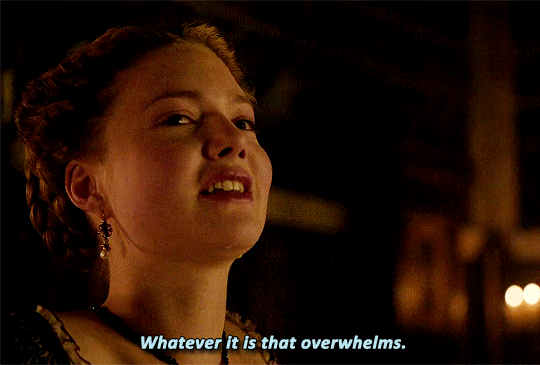
and then in the final scene it’s as if cesare effectively baptizes lucrezia?

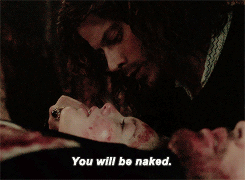
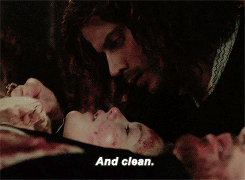
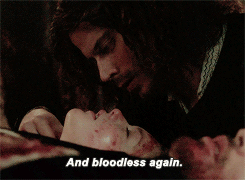
and more than that, previously they’d been attributing the feeling they get around each other to either God, something that’s meant to be divine and sacred and inherently good
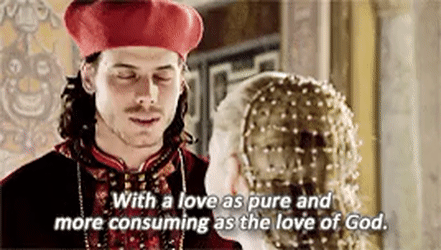
or The Devil, which is meant to be irresistible and seductive but fundamentally evil
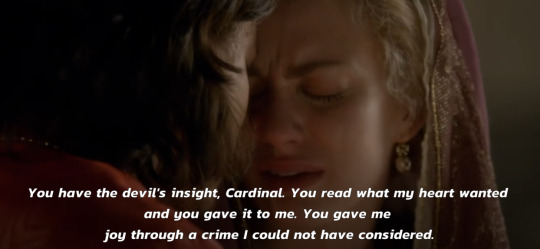
but by the end cesare doesn’t claim either, their connection is theirs, so he, like, baptizes her in their love?
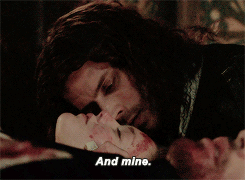
and she’s basking in it
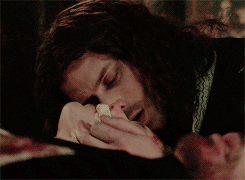
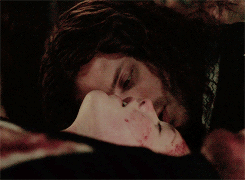
because despite what she may feel about alfonso and his death and her role in it, her and cesare are so undeniable that she naturally revels in him not running from her and finally “claiming” her and their connection beside the corpse of her husband who was destroyed by realizing he could never touch the connection she’s now rejoicing in? and the cesare and lucrezia “love theme” plays during this entire sequence pulling it all together?
this ship is ridiculously good.
#the borgias#cesare x lucrezia#lucrezia x cesare#cesare borgia#lucrezia borgia#francois arnaud#holliday grainger#the borgias 3x10
208 notes
·
View notes
Note
So... The Nevers. What's it all about? I've seen your gifsets and my interest is piqued. I 100% trust your taste in shows as you got me into Astrid and Raphaelle last year and am a keen follower of your wlw journeys haha
OMG where do I startttt. First, thank you for trusting me with your choice of shows to watch (and ships ^^). ♥ I always seem to choose the small fandom ships though :D
I call them Truedair but the fandom doesn’t seem to have come to a choice ... On twitter you have TruePenance you also have Trudair and that’s mostly the main ship names. I love “Truth and Dair” and ThunderCloud (when you see the scene in ep 3 you’ll know ^^)
No Ann it’s not Adue and no Laura it’s not Pamalia :D
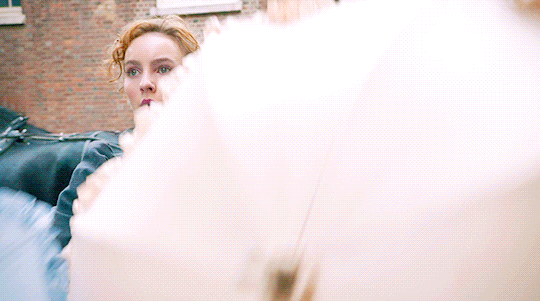
Everything under the cut ♥
---------- General ----------
Ok so now ... a general comment about what the show is. Took it from wiki tbh ^^
The series is set in Victorian London and follows a group of people, mostly women, known as the Touched, who suddenly manifest abnormal abilities. Among them are Amalia True, a mysterious and quick-fisted widow, and her best friend Penance Adair, a brilliant inventor.
The Nevers is described as "an epic science fiction drama about a gang of Victorian[s] who find themselves with unusual abilities, relentless enemies, and a mission that might change the world."
At first I'm not the kind of person who loves Victorian London settings BUT this show honestly made me like love it ^^ (sorry youtube for all the Victorian dresses making videos I watched lately and NO I do not plan on creating one it's just ... hyperfixation) I love fantasy, I love sci-fi... so that's why I might like this show. The sci-fi part is the powers but also the big TWIST. (Nope won't tell you about it and yep I was sadly spoiled about it ... I know I shouldn't have went through the tag :D) Oh and also ... SteamPunk energy. I swear, at the start of ep 6 you will be ... Is it the right show I’m watching ? :D
It’s HBO so ... yeah sex and nudity sometimes are a thing. Sometimes it’s kinda dark but it also has humor and amazing lines/quotes.
There’s some White Old Man™ talks especially in the first two eps where they discuss in their closed clubs about the fate of the Touched ... You know :D Boring talks where you wanna rip their throats when they’re talking about woman/Touched but it’s kinda necessary to get the feel of the situation they’re in.
It’s created by Josh Whedon but after what happened in other shows he decided to leave the show after ep 4 and Philippa Goslett took back the showrunner chair. Then you have Jane Espenson as a writer ... Buffy, OUAT, Jessica Jones, ...
youtube
---------- Soooo the characters ----------
You have Amalia True, the number one main char who has the ability to see glimpses of the future. She doesn’t control it, she doesn’t know when her glimpses will manifest themselves and she doesn’t know when she sees an event that will happen, when it will actually take place. "The most irresponsible, spontaneous, and psychologically broken hero of 19th-century London, and a danger to the British elite. She is dedicated to her cause and never turns down a drink."

So yeah, you've guessed it, she's the perfect anti-hero, absolutely badass (in a corset and dress nonetheless), dark soul/past character. Who ... weirdly (we all know it and love it in our ships) is all soft and loving when one Penance Adair is concerned. Shocker, right? :D I swear the hearteyes I’ve seen x_x She’s also very protective of Penance. She’s got PTSD and doesn’t like large crowds.
She runs the Orphanage where a great number of Touched are gathered and live as a community. She protects them, she helps some others to get to safety and so on.
She’s played by miss Laura Donnelly who’s perfect for the role and amazing at doing different sorts of accents because, you might have recognized her from Outlander (Jamie’s sister), she doesn’t talk the same way AT ALL in both series. Also I’m in love with her voice in the Nevers I don’t make the rules. She’s 40 but honestly looks way younger. MILF am I right? Also Amalia fighting scenes are amazing and Laura has done the majority of it by herself !
You might have guessed ... I immediately thought of Jessica Jones when I saw her face ^^ But that’s kinda irrelevant here. She’s beautiful and messy and my kinda gal.
Then you Have Miss Penance Adair “Amalia's best friend, and a Touched with the power of 'seeing' electrical energy patterns and a skill for inventing. She is both religious and heretically progressive.”
She’s an amazing inventor, creating all sorts of gadgets for Amalia to fight with :D Our own 007 ... She’s her BeSt FriEnD ... When you know, you know. (Xena flashback ^^) She’s her wife right hand man and goes in the field to help Amalia. They also have this cute dynamic where Penance name an invention and Amalia calls it another way (the right way) and they bicker about it lovingly.

She’s THE sunshine character. Amalia is the Sunshine protector of course. But we all know who’s the top in the relationship and it ain’t Mrs. True. All her interactions with Amalia are WIVES™. She’s the cutie, she’s the hope and compass of Amalia. She loves to touch Amalia too ♥ Amalia is her idiotic suicidal wife and Penance has to deal with that but she doesn’t love her less. Like Laura said, Amalia loves Penance more than she loves herself. We all know it’s because she doesn’t think highly of herself but also because who doesn’t love Penance.
She’s played by Ann Skelly and has an amazing, lovely, Irish accent (Laura is Irish too but not in the show). And OMG I just checked and she’s only 25 ? She’s 6 months younger than me and I’m kinda shocked because I thought she was at least 28 :D Listen to her saying ‘fabric of the world’ at the end of ep 1 and not fall in love with her I dare you. You’ll fall in love with Penance way before the end of ep 1 tbh.
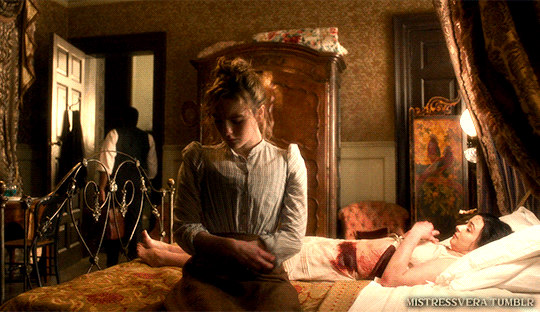
---------- Queer rep ??? ----------
They are not canon, I prefer saying it before anyone thinks that they are. (Like Astraëlle)
I honestly thought they would become canon until Laura Donnelly called them sisters in a IG live ... (Honestly the showrunner might make them canon who knows) but like Astraëlle even if they don't become canon I don't even care. Their interactions are magnificent and their relationship is everything that’s good in this world. Like I said, they have the WIFE™ energy, they’ve know each other when the show starts for about 3 years. “You’re supposed to be inseparable.” is an actually quote from ‘the bad guy girl’ (Maladie) or as I could say the misunderstood woman who’s kinda crazy too though don’t get me wrong ^^ But everybody is his own hero in his story. Maladie = Disease in French.
They both have what seems like male love interests too. One for Amalia who honestly I’m not a fan of. He’s cheating on her wife with Amalia so ... let’s not ship them. And then you have an adorable being as Penance’s LI aka Bird guy ^^ aka Augie. He’s a cutie like Penance and honestly if they go that way I won’t be mad.
Now ... the CANON queer rep ... I give them from the top of my head so if I forgot some sorry and please add them in the comments !
Amalia : She’s bi or pan ... given by an info in ep 6. Won’t spoil.
Hugo : pan man, of course we ship him with Augustus (Augie). Give them to me. They aren’t canon.
Won’t spoil it but there’s a repressed (kinda homophobic it feels like or at least not well in his shoes) gay man in the show too who’s as much as a main as Hugo and Augie. I personally am not a fan of him.
Nimble Jack is they/them (probs ?) not sure about it but the person playing them said this : “androgynous trans character” they’re not a big part of the show though so only a supporting char.
You have Bonfire Annie who looks kinda close to Maladie at some point so yeah probs not canon but she seems to be pan too. supporting char too
------------
It has for now 6 eps because it stopped in the middle because of covid but s1 will have 12 eps overall ... 6 more eps will prob come in april or summer 2022.
If you can’t tell, yes I’ve become obsessed with this show and this ship. I love them with all my heart ... They’re blonde x brunette, sunshine x sunshine protector, they’re wives your honor.
OH AND I ALMOST FORGOT ... You’ll see miss Claudia Black in ep 6 and let me tell you I so ship her with an other character ^^
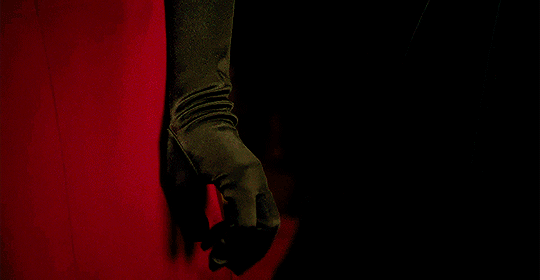
#The Nevers#Amalia x Penance#Truedair#Truepenance#Whatever you wanna call them even though I love Truedair#the nevers presentation#Nevers:S1#TheNevers*#Truedair*#TruePenance*#long text post#long post#text post#ask#phoneboxrock#Reblog to share awareness of the show ship please ? ;) tks
39 notes
·
View notes
Text
@mercuriallycooperative my initial thoughts are mostly all built around two largely unrelated ideas which are (oh, spoiler alert for the light novels if you’ve only consumed the anime/manga):
1. Larna is very strange and fascinating in a way that is technically different and yet also strangely similar to Katarina, namely that it seems she took one look at the highly privileged life fate and society had planned for her and went “lol nope”
2. The political backstory has SO MUCH POTENTIAL that seems like, completely wasted in the otome game, and also completely tonally disparate, like Jeord and Alan’s dad got up to some ten dimensional chess Game of Thrones shit to wind up on the throne and it BARELY comes up
So basically, the setup I have in mind is “what if Fortune Lover was (loosely?) based on a popular epic fantasy saga and Larna in a previous life HAD read that series but hadn’t played the game”
So for ten years she’s like, doing her best to navigate her way out of just being the underwritten female side character as imagined by some old white dude who thinks it’s more realistic for women to be murdered than to have personalities (*cough*grrm*cough*)
While every now and then being baffled by minor discrepancies like the king being named Orwen instead of Owen, or she’s like “wait this is supposed to be vague medieval times why are there light bulbs everywhere”
And just when she’s finally convinced she’s got all her ducks in a row everything suddenly starts being SO DIFFERENT WHY IS EVERYTHING SO DIFFERENT
Like she KNOWS that the third prince is supposed to fall in love with a powerful commoner and unwittingly make a ton of powerful enemies in doing so, including his vengeful fiancée who he never liked and never takes seriously as a threat
But when she asks Jeffrey about it he’s just like “oh Maria? Yeah Jeord said she was nice, they’re good friends, but then he complained that she was a bit TOO nice and she’s stealing his fiancee’s attention away from him and quote, ‘there was already far too much competition for that precious resource’” and Larna’s just like “…what.”
And she just has to learn more but the more she learns the more confused she gets and the more obsessed she becomes with getting to the bottom of it
Other things I’ve mostly settled on:
The book series Larna mistakenly thinks she’s in is a multi-generational political saga. The first third is about Jeord’s grandfather, the irresponsible philandering king who left behind no legitimate heirs and dozens of half-siblings to duke it out amongst themselves. The second third focuses on King Owen/Orwen, his initial reluctance to fight his siblings until he eventually realizes it’s the only way to restore stability to the kingdom, and the proliferation of Dark Magic amongst the shadier noble families. The final third follows Jeffrey, whose father is reluctant to name an heir outright and reignite another power struggle. In the original books, Owen’s reluctance is exploited by power-hungry nobles who step in to manipulate Jeffrey for their own ends. One by one, they destroy his brothers to pave his way to the throne, and Jeffrey realizes too late that he’s lost everyone he loves in order to get there.
Larna’s first and most significant move is to make sure Jeffrey realizes before it’s too late just how much he loves his brothers. She is…far more successful than she expects to be.
Larna Smith was her name in her previous life, and she’s very excited to be able to start using it again when she gets her Ministry position
She was a high school theater nerd, hence her mastery of disguises and assuming various roles
While she also died young, it was a slow illness and not a sudden accident. She spent a lot of time reading and rereading the book series in her final year or so, and taking about various theories and fan interpretations with her bff
So that’s…way more than a few initial thoughts, I guess. I really should just write it at this point lol, but in the meantime if anyone wants to send me asks about it I’d love to flesh stuff out more!
#thanks for asking!#felt good to finally get it all out of my head and down somewhere#hamefura#my next life as a villainess#larna smith
23 notes
·
View notes
Text
a twenty-five thousand word post about a twenty-three year old “debate”
As time goes on, I’m baffled that it remains a commonly held opinion that:
The LTD remains unresolved
SE is deliberately playing coy, and are (or have been) afraid to resolve it.
To me, the answer is as clear as day, and yet seeing so many people acting as if it’s a question that remains unanswered makes me wonder if I’m the crazy one.
So I am going to try to articulate my thought process here, not because I expect to change any hearts and minds, but more to get these thoughts out of my head and onto a page so I can finally read a book and/or watch reruns of Shark Tank in peace.
To start off, there are two categories of argument (that are among, if not the most widely used lines of argument) that I will try NOT to engage with:
1) Quotes from Ultimania or developer interviews - while they’re great for easter eggs and behind-the-scenes info, if a guidebook is required to understand key plot points, you have fundamentally failed as a storyteller. Now the question of which character wants to bone whom is often something that can be relegated to a guidebook, but in the case of FF7, you would be watching two very different stories play out depending on who Cloud ends up with.
Of course, the Ultimanias do spell this out clearly, but luckily for us, SE are competent enough storytellers that we can find the answer by looking at the text alone.
2) Arguments about character actions/motivations — specifically, I’m talking about stuff like “Cloud made this face in this scene, which means be must be [insert whatever here].”
Especially when it comes to the LTD, these tend to focus on individual actions, decontextualizing them from their role in the narrative as a whole. LTDers often try to put themselves in the character’s shoes to suss out what they may be thinking and feeling in those moments. These arguments will be colored by personal experiences, which will inevitably vary.
Let’s take for example Cloud’s behavior in Advent Children. One may argue that it makes total sense given that he’s dying and fears failing the ones he loves. Another may argue that there’s no way that he would run unless he was deeply unhappy and pining after a lost love. Well, you’ll probably just be talking over each other until the cows come home. Such is the problem with trying to play armchair therapist with a fictional character. It’s not like we can ask Cloud himself why he did what he did (and even if we could, he’s not the exactly the most reliable narrator in the world). Instead, in trying to understand his motivations, we are left with no choice but to draw comparisons with our own personal experiences, those of our friends, or other works of media we’ve consumed. Any interpretation would be inherently subjective and honestly, a futile subject for debate.
There’s nothing wrong with drawing personal connections with fictional characters of course. That is the purpose of art after all. They are vessels of empathy. But when we’re talking about what is canon, it doesn’t matter what we take away. What matters is the creators’ intent.
Cloud, Tifa and Aerith are not your friends Bob, Alice and Maude. They are characters created by Square Enix. Real people can behave in a variety of different ways if they found themselves in the situations faced by our dear trio; however, FF7 characters are not sentient creatures. Everything they do or say is dictated by the developers to serve the story they are trying to tell.
So what do we have left then? Am I asking you, dear reader, to just trust me, anonymous stranger on the Internet, when I tell you #clotiiscanon. Well, in a sense, yes, but more seriously, I’m going to try to suss out what the creator’s intent is based on what is, and more importantly, what isn’t, on screen.
Instead of putting ourselves in the shoes of the characters, let’s try putting ourselves in the shoes of the creators. So the question would then be, if the intent is X, then what purpose does character Y or scene Z serve?
The story of FF7 isn’t the immutable word of God etched in a stone tablet. For every scene that made it into the final game, there are dozens of alternatives that were tossed aside. Let us also not forget the crude economics of popular storytelling. Spending resources on one particular aspect of the game may mean something entirely unrelated will have to be cut for time. Thus, the absence of a particular character/scenario is an alternative in itself. So with all these options at their disposal, why is the scene we see before us the one that made it into the final cut? — Before we dive in, I also want to define two broad categories of narrative: messy and clean.
Messy narratives are ones I would define as stories that try to illuminate something about the human condition, but may not leave the audience feeling very good by the end of it. The protagonists, while not always anti-heroes, don’t always exhibit the kind of growth we’d like, don’t always learn their lessons, probably aren’t the best role models. The endings are often ambivalent, ambiguous, and leaves room for the audience to take away from it what they will. This is the category I would put art films and prestige cable dramas.
Clean narratives are where I would categorize most popular forms of entertainment. Not that these characters necessarily lack nuance, but whatever flaws are portrayed are something to be overcome by the end of story. The protagonists are characters you’re supposed to want to root for
Final Fantasy as a series would fall under the ‘clean’ category. Sure, many of the protagonists start out as jerks, but they grow through these flaws and become true heroes by the end of their journey. Hell, a lot of the time even the villains are redeemed. They want you to like the characters you’re spending a 40+ hr journey with. Their depictions can still be realistic, but they will become the most idealized versions of themselves by the end of their journeys.
This is important to establish, because we can then assume that it is not SE’s intent to make any of their main characters come off pathetic losers or unrepentant assholes. Now whether or not they succeed in that endeavor is another question entirely.
FF7 OG or The dumbest thought experiment in the world
With that one thousand word preamble out of the way, let’s finally take a look at the text. In lieu of going through the OG’s story beat by beat, let’s try this thought experiment:
Imagine it’s 1996, and you’re a development executive at what was then Squaresoft. The plucky, young development team has the first draft of what will become the game we know as Final Fantasy VII. Like the preceding entries in the series, it’s a world-spanning action adventure RPG, with a key subplot being the epic tragic romance between its hero and heroine, Cloud and Aerith.
They ask you for your notes.
(For the sake of your sanity and mine, let’s limit our hypothetical notes to the romantic subplot)
Disc 1 - everything seems to be on the right track. Nice meet-cute, lots of moments developing the relationship between our pair. Creating a love triangle with this Tifa character is an interesting choice, but she’s a comparatively minor character so she probably won’t be a real threat and will find her happiness elsewhere by the end of the game. You may note that they’re leaning a bit too much into Tifa and Cloud’s past. Especially the childhood promise flashback early in the game — cute scene, but a distraction from main story and main pairing — fodder for the chopping block. You may also bump on the fact that Aerith is initially attracted to Cloud because he reminds her of an ex, but this is supposed to be a more mature FF. That can be an obstacle they overcome as Aerith gets to know the real Cloud.
Aerith dies, but it is supposed to be a tragic romance after all. Death doesn’t have to be the end for this relationship, especially since Aerith is an Ancient after all.
It’s when Disc 2 starts that things go off the rails. First off, it feels like an awfully short time for Cloud to be grieving the love of his life, though it’s somewhat understandable. This story is not just a romance. There are other concerns after all, Cloud’s identity crisis for one. Though said identity crisis involves spending a lot of time developing his relationship with another woman. It’s one thing for Cloud and Tifa to be from the same hometown, but does she really need to play such an outsized role in his internal conflict? This might give the player the wrong impression.
You get to the Northern Crater, and it just feels all wrong. Cloud is more or less fine after the love of his life is murdered in front of his eyes but has a complete mental breakdown to the point that he’s temporarily removed as a playable character because Tifa loses faith in him??? Shouldn’t it be the other way around?
Oh, but it only gets worse from here. With Cloud gone, the POV switches to Tifa and her feelings for him and her desire to find him. The opening of the game is also recontextualized when you learn the only reason that Cloud was part of the first Reactor mission that starts the game is because Tifa found him and wanted to keep an eye on him.
Then you get to Mideel and the alarm bells are going off. Tifa drops everything, removing her from the party as well, to take care of Cloud while he’s a catatonic vegetable? Not good. Very not good. This level of selfless devotion is going to make Cloud look like a total asshole when he rejects her in favor of Aerith. Speaking of Aerith, she uh…hasn’t been mentioned for some time. In fact, her relationship with Cloud has remained completely static after Disc 1, practically nonexistent, while his with Tifa has been building and building. Developing a rival relationship that then needs to be dismantled rather than developing the endgame relationship doesn’t feel like a particularly valuable use of time and resources.
By the time you get to the Lifestream scene, you’re about ready to toss the script out of the window. Here’s the emotional climax of the entire game, where Cloud’s internal conflict is finally resolved, and it almost entirely revolves around Tifa? Rather than revisiting the many moments of mental anguish we experienced during the game itself — featuring other characters, including let’s say, Aerith — it’s about a hereto unknown past that only Tifa has access to? Not only that, but we learn that the reason Cloud wanted to join SOLDIER was to impress Tifa, and the reason he adopted his false persona was because he was so ashamed that he couldn’t live up to the person he thought Tifa wanted him to be? Here, we finally get a look into the inner life of one half of our epic couple and…it entirely revolves around another woman??
Cloud is finally his real self, and hey, it looks like he finally remembers Aerith, that’s at least a step in the right direction. Though still not great. With his emotional arc already resolved, any further romantic developments is going to feel extraneous and anticlimactic. It just doesn’t feel like there’s enough time to establish that:
Cloud’s romantic feelings for Tifa (which were strong enough to launch his hero’s journey) have transformed into something entirely platonic in the past few days/weeks
Cloud’s feelings for Aerith that he developed while he was pretending to be someone else (and not just any someone, but Aerith’s ex of all people) are real.
This isn’t a romantic melodrama after all. There’s still a villain to kill and a world to save.
Cloud does speak of Aerith wistfully, and even quite personally at times, yet every time he talks about her, he’s surrounded by the other party members. A scene or two where he can grapple with his feelings for her on his own would help. Her ghost appearing in the Sector 5 Church feels like a great opportunity for this to happen, but he doesn’t interact with it at all. What gives? Missed opportunity after missed opportunity.
The night before the final battle, Cloud asks the entire party to find what they��re fighting for. This feels like a great (and perhaps the last) opportunity to establish that for Cloud, it’s in Aerith’s memory and out of his love for her. He could spend those hours alone in any number of locations associated with her — the Church, the Temple of the Ancients, the Forgotten City.
Instead — none of those happens. Instead, once again, it’s Cloud and Tifa in another scene where they’re the only two characters in the scene. You’re really going to have Cloud spend what could very well be the last night of his life with another woman? With a fade to black that strongly implies they slept together? In one fell swoop, you’re portraying Cloud as a guy who not only betrays the memory of his lost love, but is also incredibly callous towards the feelings of another woman by taking advantage of her vulnerability. Why are we rooting for him to succeed again?
Cloud and the gang finally defeat Sephiroth, and Aerith guides him back into the real world. Is he finally explicitly stating that he’s searching for her (though they’ve really waited until the last minute to do so), but again, why is Tifa in this scene? Shouldn’t it just be Cloud and Aerith alone? Why have Tifa be there at all? Why have her and her alone of all the party members be the one waiting for Cloud? Do you need to have Tifa there to be rejected while Cloud professes his unending love for Aerith? It just feels needlessly cruel and distracts from what should be the sole focus of the scene, the love between Cloud and Aerith.
What a mess.
You finish reading, and since it is probably too late in the development process to just fire everyone, you offer a few suggestions that will clarify the intended romance while the retaining the other plot points/general themes of the game.
Here they are, ordered by scale of change, from minor to drastic:
Option 1 would be to keep most of the story in tact, but rearrange the sequence of events so that the Lifestream sequence happens before Aerith’s death. That way, Cloud is his true self and fully aware of his feelings for both women before Aerith’s death. That way, his past with Tifa isn’t some ticking bomb waiting to go off in the second half of the game. That development will cease at the Lifestream scene. Cloud will realize the affection he held for her as a child is no longer the case. He is grateful for the past they shared, but his future is with Aerith. He makes a clear choice before that future is taken away from him with her death. The rest of the game will go on more or less the same (with the Highwind scene being eliminated, of course) making it clear, that avenging the death of his beloved is one of, if not the, primary motivation for him wanting to defeat Sephiroth.
The problem with this “fix” is that a big part of the reason that Aerith gets killed is because of Cloud’s identity crisis. If said crisis is resolved, the impact of her death will be diminished, because it would feel arbitrary rather than something that stems from the consequences of Cloud’s actions. More of the story will need to be reconceived so that this moment holds the same emotional weight.
Another problem is why the Lifestream scene needs to exist at all. Why spend all that time developing the backstory for a relationship that will be moot by the end of the game? It makes Tifa feel like less of a character and more of a plot device, who becomes irrelevant after she services the protagonist’s character development and then has none of her own. That’s no way to treat one of the main characters of your game.
Option 2 would be to re-imagine Tifa’s character entirely. You can keep some of her history with Cloud in tact, but expand her backstory so she is able to have a satisfactory character arc outside of her relationship with Cloud. You could explore the five years in her life since the Nibelheim incident. Maybe she wasn’t in Midgar the whole time. Maybe, like Barret, she has her own Corel, and maybe reconciling with her past there is the climax of her emotional arc as opposed to her past with Cloud. For Cloud too, her importance needs to be diminished. She can be one of the people who help him find his true self in the Lifestream, but not the only person. There’s no reason the other people he’s met on his journey can’t be there. Thus their relationship remains somewhat important, but their journeys are not so entwined that it distracts from Cloud and Aerith’s romance.
Option 3 would be to really lean into the doomed romance element of Cloud and Aerith’s relationship. Have her death be the cause of his mental breakdown, and have Aerith be the one in the Lifestream who is able to put his mind back together and bring him back to the realm of consciousness. After he emerges, he has the dual goal of defeating Sephiroth and trying to reunite with Aerith. In the end, in order to do the former, he has to relinquish the latter. He makes selfless choice. He makes the choice that resonates the overall theme of the game. It’s a bittersweet but satisfying ending. Cloud chooses to honor her memory and her purpose over the chance to physically bring her back. In this version of the game, the love triangle serves no purpose. There’s no role for Tifa at all.
Okay, we can be done with this strained counterfactual. What I’ve hopefully illustrated is that while developers had countless opportunities to solidify Cloud/Aerith as the canon couple in Discs 2 and 3 of the game, they instead chose a different route each and every time. What should also be clear is that the biggest obstacle standing in their way is not Aerith’s death, but the fact that Tifa exists.
At least in the form she takes in the final game, as a playable character and at the very least, the 3rd most important character in game’s story. She is not just another recurring NPC or an antagonist. Her love for Cloud is not going to be treated like a mere trifle or obstacle. If Cloud/Aerith was supposed to be the endgame ship, there would be no need for a love triangle and no need to include Tifa in the game at all. Death is a big enough obstacle, developing Cloud’s relationship with Tifa would only distract from and diminish his romance with Aerith.
I think this is something the dead enders understand intuitively, even more so than many Cloti shippers. Which is why some of them try to dismiss Tifa’s importance in the story so that she becomes a minor supporting character at best, or denigrate her character to the point that she becomes an actual villain. The Seifer to a Squall, the Seymour to a Tidus, hell even a Quistis to a Rinoa, they know how to deal with, but a Tifa Lockhart? As she is actually depicted in Final Fantasy VII? They have no playbook for that, and thus they desperately try to squeeze her into one of these other roles.
Let’s try another thought experiment, and see what would to other FF romances if we inserted a Tifa Lockhart-esque character in the middle of them.
FFXV is a perfect example because it features the sort of tragic love beyond death romance that certain shippers want Cloud and Aerith to be. Now, did I think FFXV was a good game? No. Did I think Noctis/Luna was a particularly well-developed romance? Also no. Did I have any question in my mind whatsoever that they were the canon relationship? Absolutely not.
Is this because they kiss at the end? Well sure, that helps, but also it’s because the game doesn’t spend the chapters after Luna’s death developing Noctis’ relationship with another woman. If Noctis/Luna had the same sort of development as Cloud/Aerith, then after Luna dies, Iris would suddenly pop in and play a much more prominent role. The game would flashback to her past and her relationship with Noctis. And it would be through his relationship with Iris that Noctis understands his duty to become king or a crystal or whatever the fuck that game was about. Iris is by Noctis’ side through the final battle, and when he ascends the throne in that dreamworld or whatever. There, Luna finally shows up again. Iris is still in the frame when Noctis tells her something like ‘Oh sorry, girl, I’ve been in love with Luna all along,” before he kisses Luna and the game ends.
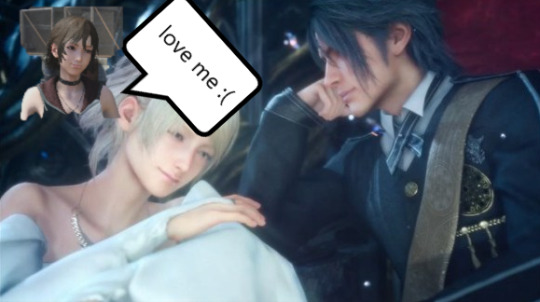
(a very real scene from a very good game)
Come on. It would be utterly ludicrous and an utter disservice to every character involved, yet that is essentially the argument Cloud/Aerith shippers are making. SE may have made some pretty questionable storytelling decisions in the past, but they aren’t that bad at this.
Or in FFVIII, it would be like reordering the sequence of events so that Squall remembers that he grew up in an orphanage with all the other kids after Rinoa falls into a coma. And while Rinoa is out of commission, instead of Quistis gracefully bowing out after realizing she had mistaken her feelings of sisterly affection for love, it becomes Quistis’ childhood relationship with Squall that allows him to remember his past and re-contextualizes the game we’ve played thus far, so that the player realizes that it was actually Quistis who was his motivation all along. Then after this brief emotional detour, his romance with Rinoa would continue as usual. Absolutely absurd.
The Final Fantasy games certainly have their fair share of plot holes, but they’ve never whiffed on a romance this badly.
A somewhat more serious character analysis of the OG
What then is Tifa’s actual role in the story of FFVII? Her character is intricately connected to Cloud’s. In fact, they practically have the same arc, though Tifa’s is rather understated compared to his. She doesn’t adopt a false persona after all. For both of them, the flaw that they must learn to overcome over the course of the game is their fear of confronting the truth of their past. Or to put it more crudely, if they’re not lying, they’re at the very least omitting the truth. Cloud does so to protect himself from his fear of being exposed as a failure. Tifa does so at the expense of herself, because she fears the truth will do more harm than good. They’re two sides of the same coin. Nonetheless, their lying has serious ramifications.
The past they’re both afraid to confront is of course the Nibelheim Incident from five years ago. Thus, the key points in their emotional journeys coincide with the three conflicting Nibelheim flashbacks depicted in the game: Cloud’s false memory in Kalm, Sephiroth’s false vision in the Northern Crater, and the truth in the Lifestream.
Before they enter the Lifestream, both Cloud and Tifa are at the lowest of their lows. Cloud has had a complete mental breakdown and is functionally a vegetable. Tifa has given up everything to take care of Cloud as she feels responsible for his condition. If he doesn’t recover, she may never find peace.
With nothing left to lose, they both try to face the past head on. For Cloud, it’s a bit harder. At the heart of all this confusion, is of course, the Nibelheim Incident. How does Cloud know all these things he shouldn’t if Tifa doesn’t remember seeing him there? The emotional climax for both Cloud and Tifa, and arguably the game as a whole, is the moment the Shinra grunt removes his helmet to reveal that Cloud was there all along.
Tifa is the only character who can play this role for Cloud. It’s not like she a found a videotape in the Lifestream labeled ‘Nibelheim Incident - REAL’ and voila, Cloud is fixed. No, she is the only one who can help him because she is the only person who lived through that moment. No one else could make Cloud believe it. You could have Aerith or anyone else trying to tell him what actually happened, but why would he believe it anymore than the story Sephiroth told him at the Northern Crater?
With Tifa, it’s different. Not only was she physically there, but she’s putting as much at risk in what the truth may reveal. She’s not just a plot device to facilitate Cloud’s character development. The Lifestream sequence is as much the culmination of her own character arc. If it goes the wrong way, “Cloud” may find out that he’s just a fake after all, and Tifa may learn that boy she thought she’d been on this journey with had died years ago. That there’s no one left from her past, that it was all in her head, that she’s all alone. Avoiding this truth is a comfort, but in this moment, they’re both putting themselves on the line. Being completely vulnerable in front of the person they’re most terrified of being vulnerable with.
The developers have structured Cloud and Tifa’s character arcs so that the crux is a moment where the other is literally the only person who could provide the answer they need. Without each other, as far as the story is concerned, Cloud and Tifa would remain incomplete.
Aerith’s character arc is a different beast entirely. She is the closest we have to the traditional Campbellian Hero. She is the Chosen One, the literal last of her kind, who has been resisting the call to adventure until she can no longer. The touchstones of her character arc are the moments she learns more about her Cetra past and comes to terms with her role in protecting the planet - namely Cosmo Canyon, the Temple of the Ancients and the Forgotten City.
How do hers and Cloud’s arcs intersect? When it comes to the Nibelheim incident, she is a merely a spectator (at least during the Kalm flashback, as for the other two, she is uh…deceased). Cloud attacking her at the Temple of the Ancients, which results in her running to the Forgotten City alone and getting killed by Sephiroth, certainly exacerbates his mental deterioration, but it is by no means a turning point in his arc the way the Northern Crater is.
As for Cloud’s role in Aerith’s arc, their meeting is quite important in that it sets forth the series of events that leads her to getting captured by Shinra and thus meeting “Sephiroth” and wanting to learn more about the Cetra. It’s the inciting incident if we’re going to be really pedantic about it, yet Aerith’s actual character development is not dependent on her relationship with Cloud. It is about her communion with her Cetra Ancestry and the planet.
To put it in other terms, all else being the same, Aerith could still have a satisfying character arc had Cloud not crashed down into her Church. Sure, the game would look pretty different, but there are other ways for her to transform from a flirty, at times frivolous girl to an almost Christ-like figure who accepts the burden of protecting the planet.
Such is not the case for Cloud and Tifa. Their character arcs are built around their shared past and their relationship with one another. Without Tifa, you would have to rewrite Cloud’s character entirely. What was his motivation for joining SOLDIER? How did he get on that AVALANCHE mission in the first place? Who can possibly know him well enough to put his mind back together after it falls apart? If the answer to all these questions is the same person, then congratulations, you’ve just reverse engineered Tifa Lockhart.
Tifa fares a little better. Without Cloud, she would be a sad, sweet character who never gets the opportunity to reconcile with the trauma of her past. Superficially, a lot would be the same, but she would ultimately be quite static and all the less interesting for it.
Let’s also take a brief gander at Tifa’s role after the Lifestream sequence. At this point in the game, both Tifa and Cloud’s emotional arcs are essentially complete. They are now the most idealized versions of themselves, characters the players are meant to admire and aspire to. However they are depicted going forward, it would not be the creator’s intent for their actions to be perceived in a negative light.
A few key moments standout, ones that would not be included if the game was intended to end with any other romantic pairing or with Cloud’s romantic interest left ambiguous:
The Highwind scene, which I’ve gone over above. It doesn’t matter if you get the Low Affection or High Affection version. It would not reflect well on either Cloud or Tifa if he chose to spend what could be his last night alive with a woman whose feelings he did not reciprocate.
Before the final battle with Sephiroth, the party members scream out the reasons they’re fighting. Barret specifically calls out AVALANCHE, Marlene and Dyne, Red XIII specifically calls out his Grandpa, and Tifa specifically calls out Cloud. You are not going to make one of Tifa’s last moments in the game be her pining after a guy who has no interest in her. Not when you could easily have her mention something like her past, her hometown or hell even AVALANCHE and Marlene like Barret. If Tifa’s feelings for Cloud are meant to be unrequited, then it would be a character flaw that would be dealt with long before the final battle (see: Quistis in FF8 or Eowyn in the Lord of the Rings). They would not still be on display at moment like this.
Tifa being the only one there when Cloud jumps into the Lifestream to fight Sephiroth for the last time, and Tifa being the only one there when he emerges. She is very much playing the traditional partner/spouse role here, when you could easily have the entire party present or no one there at all. There is clearly something special about her relationship with Cloud that sets her apart from the other party members.
Once again, let’s look at the “I think I can meet her there moment.” And let’s put side the translation (the Japanese is certainly more ambiguous, and it’s not like the game had any trouble having Cloud call Aerith by her name before this). If Cloud was really expressing his desire to reunite with Aerith, and thus his rejection of Tifa, then the penultimate scene of this game is one that involves the complete utter and humiliation of one of its main characters since Tifa’s reply would indicate she’s inviting herself to a romantic reunion she has no part in. Not only that, but to anyone who is not Cl*rith shipper, the protagonist of the game is going to come off as a callous asshole. That cannot possibly be the creator’s intention. They are competent enough to depict an act of love without drawing attention to the party hurt by that love.
What then could possibly be the meaning? Could it possibly be Cloud trying to comfort Tifa by trying to find a silver lining in what appears to be their impending death? That this means they may get to see their departed loved ones again, including their mutual friend, Aerith? (I will note that Tifa talks about Aerith as much, if not even more than Cloud, after her death). Seems pretty reasonable to me, this being an interpretation of the scene that aligns with the overall themes of the game, and casts every character in positive light during this bittersweet moment.
Luckily enough, we have an entire fucking Compilation to find out which is right.
But before we get there, I’m sure some of you (lol @ me thinking anyone is still reading this) are asking, if Cloti is canon, then why is there a love triangle at all? Why even hint at the possibility of a romance between Cloud and Aerith? Wouldn’t that also be a waste of time and resources if they weren’t meant to be canon?
Well, there are two very important reasons that have nothing to do with romance and everything to do with two of the game’s biggest twists:
Aerith initially being attracted to Cloud’s similarities to Zack/commenting on the uncanniness of said similarities is an organic way to introduce the man Cloud’s pretending to be. Without it, the reveal in the Lifestream would fall a bit flat. The man he’s been emulating all along would just be some sort of generic hero rather than a person whose history and deeds already encountered during the course of the game. Notably for this to work, the game only has to establish Aerith’s attraction to Cloud.
To build the player’s attachment to Aerith before her death/obscure the fact that she’s going to die. With the technological limitations of the day, the only way to get the player to interact with Aerith is through the player character (AKA Cloud), and adding an element of choice (AKA the Gold Saucer Date mechanic) makes the player even more invested. This then elevates Aerith’s relationship with Cloud over hers with any other character. At the same time, because her time in the game is limited, Cloud ends up interacting with Aerith more than any of the other characters, at least in Disc 1. The choice to make many of these interactions flirty/romantic also toys with player expectations. One does not expect the hero’s love interest to die halfway through the game. The game itself also spends a bit of time teasing the romance, albeit, largely in superficial ways like other characters commenting on their relationship or Cait Sith reading their love fortune at the Temple of the Ancients. Yet, despite the quantity of their personal interactions, Cloud and Aerith never display any moments of deep love or devotion that one associates with a Final Fantasy romance. They never have the time. What the game establishes then is the potential of a romance rather than the romance itself. Aerith’s death hurts because of all that lost potential. There so many things she wanted to do, so many places she wanted to see that will never happen because her life is cut short. Part of what is lost, of course, is the potential of her romance with Cloud.
This creative choice is a lot more controversial since it elevates subverting audience expectations over character, and understandably leads to some player confusion. What’s the point of all this set up if there’s not going to be a pay off? Well, that is kind of the point. Death is frustrating because of all the unknowns and what-ifs. But, I suppose some people just can’t accept that fact in a game like this.
One last note on the OG before we move on: Even though this from an Ultimania, since we’re talking about story development and creator intent, I thought it was relevant to include: the fact that Aerith was the sole heroine in early drafts of the game is not the LTD trump card so people think it is. Stories undergo radical changes through the development process. More often than not, there are too many characters, and characters are often combined or removed if their presence feels redundant or confusing.
In this case, the opposite happened. Tifa was added later in the development process as a second heroine. Let’s say that Aerith was the Last Ancient and the protagonist’s sole love interest in this early draft of Final Fantasy VII. In the game that was actually released, that role was split between two characters (and last I checked, Tifa is not the last of a dying race), and Aerith dies halfway through the game, so what does that suggest about how Aerith’s role may have changed in the final product? Again, if Aerith was intended to be Cloud’s love interest, Tifa simply would not exist.
A begrudging analysis of our favorite straight-to-DVD sequel
Let’s move onto the Compilation. And in doing so, completely forget about the word vomit that’s been written above. While it’s quite clear to me now that there’s no way in hell the developers would have intended the last scene in the game to be both a confirmation of Cloud’s love for Aerith and his rejection of Tifa, in my younger and more vulnerable years, I wasn’t so sure. In fact, this was the prevailing interpretation back in the pre-Compilation Dark Ages. Probably because of a dubious English translation of the game and a couple of ambiguous cameos in Final Fantasy Tactics and Kingdom Hearts were all we had to go on.
How then did the official sequel to Final Fantasy VII change those priors?
Two years after the events of the game, Cloud is living as a family with Tifa and two kids rather than scouring the planet for a way to be reunited with Aerith. Shouldn’t the debate be well and over with that? Obviously not, and it’s not just because people were being obstinate. Part of the confusion stems from Advent Children itself, but I would argue that did not come from an intent to play coy/keep Cloud’s romantic desires ambiguous, but rather a failure of execution of his character arc.
Now I wasn’t the biggest fan of the film when I first watched a bootlegged copy I downloaded off LimeWire in 2005, and I like it even less now, but I better understand its failures, given its unique position as a sequel to a beloved game and the cornerstone of launching the Compilation.
The original game didn’t have such constraints on its storytelling. Outside of including a few elements that make it recognizable as a Final Fantasy (Moogles, Chocobos, Summons, etc.) and being a good enough game to be a financial success, the developers pretty much had free rein in terms of what story they wanted to tell, what characters they would use to tell it, and how long it took for them to tell said story.
With Advent Children, telling a good story was not the sole or even primary goal. Instead, it had to:
Do some fanservice: The core audience is going to be the OG fanbase, who would be expecting to see modern, high-def depictions of all the memorable and beloved characters from the game, no matter if the natural end point of their stories is long over.
Set up the rest of the Compilation - Advent Children is the draw with the big stars, but also a way to showcase the lesser known characters from from the Compilation who are going to be leading their own spinoffs. It’s part feature film/part advertisement for the rest of the Compilation. Thus, the Turks, Vincent and Zack get larger roles in the film than one might expect to attract interest to the spinoffs they lead.
Show off its technical prowess: SE probably has enough self awareness to realize that what’s going to set it apart from other animated feature films is not its novel storytelling, but its graphical capabilities. Thus, to really show off those graphics, the film is going to be packed to the brim with big, complicated action scenes with lots of moving parts, as opposed to quieter character driven moments.
These considerations are not unique to Advent Children, but important to note nonetheless:
As a sequel, the stakes have to be just as high if not higher than those in the original work. Since the threat in the OG was the literal end of the world, in Advent Children, the world’s gotta end again
The OG was around 30-40 hours long. An average feature-length film is roughly two hours. Video games and films are two very different mediums. As many TV writers who have tried to make the transition to film (and vice-versa) can tell you, success in one medium does not translate to success in another.
With so much to do in so little time, is it any wonder then that it is again Sephiroth who is the villain trying to destroy the world and Aerith in the Lifestream the deus ex machina who saves the day?
All of this is just a long-winded way to say, certain choices in the Advent Children that may seem to exist only to perpetuate the LTD were made with many other storytelling considerations in mind.
When trying to understand the intended character arcs and relationship dynamics, you cannot treat the film as a collection of scenes devoid of context. You can’t just say - “well here’s a scene where Cloud seems to miss Aerith, and here’s another scene where Cloud and Tifa fight. Obviously, Cloud loves Aerith.” You have to look at what purpose these scenes serve in the grander narrative.
And what is this grander narrative? To put it in simplistic terms, Aerith is the obstacle, and Tifa is goal. Cloud must get over his guilt over Aerith’s death so that he can return to living with Tifa and the children in peace.
The scenes following the prologue are setting up the emotional stakes of film - the problem that will be resolved by the film’s end. The problem being depicted here is not Aerith’s absence from Cloud’s life, but Cloud’s absence from his family. We see Tifa walking through Seventh Heaven saying “he’s not here anymore,” we see Denzel in his sickbed asking for Cloud, we see a framed photo of the four of them on Cloud’s desk. We see Cloud letting Tifa’s call go to voicemail.
What we do not see is Aerith, who does not appear until almost halfway through the film.
Cloud spends the first of the film avoiding confrontation with the Remnants/dealing with the return of Sephiroth. It’s only when Tifa is injured, and Denzel and Marlene get kidnapped that he goes to face his problems head on.
Before the final battle, when Cloud has exorcised his emotional demons and is about to face his physical demons, what do we see? We see Cloud telling Marlene that it’s his turn to take care of her, Denzel and Tifa the way they’ve taken care of him. We see Cloud telling Tifa that he ‘feels lighter’ and tacitly confirming that she was correct when she called him out earlier in the film. We see Cloud confirming to Denzel that he’s going home after this is all over.
What we do not see is Cloud telepathically communicating with Aerith to say, “Hey boo, can’t wait to beat Sephiroth so I can finally reunite with you in the Promised Land. Xoxoxo.” Aerith doesn’t factor in at all. Returning to his family is his goal, and his fight with Bahamut/the Remnants/Sephiroth/whatever the fuck is the final obstacle he has to face before reaching this goal.
This is reiterated again when Cloud is shot by Yazoo and seemingly perishes in an explosion. What is at stake with his “death”? We see Tifa calling his name while looking out the airship. We see Denzel and Marlene waiting for him at Seventh Heaven. We do not see Aerith watching over him in the Lifestream.
Now, Aerith does play an important role in Cloud’s arc when she shows up at about the midpoint of the film. You could fairly argue that it’s the turning point in Cloud’s emotional journey, the moment when he finally decides to confront his problems. But even if it’s only Cloud and Aerith in the scene, it’s not really about their relationship at all.
Let’s consider the context before this scene happens. Denzel and Marlene have been kidnapped by the Remnants; Tifa was nearly killed in a fight with another. This is Cloud at his lowest point. It’s his worst fears come to pass. His guilt over Aerith’s death is directly addressed at this moment in the film because it is not so much about his feelings for Aerith as it is about how Cloud fears the failures of his past (one of the biggest being her death) would continue into the present. If it was just about Aerith, we could have seen Cloud asking for her forgiveness at any other time in the film. It occurs when it does because this when his guilt over Aerith’s death intersects with his actual conflict, his fear that he’ll fail the the ones he loves. She appears when he’s at the Forgotten City where he goes to save the children. The same location where he had failed two year before.
This connection is made explicit when Cloud has flashes of Zack and Aerith’s deaths before he saves Denzel and Tifa from Bahamut. Again, Cloud’s dwelling on the past is directly related to his fears of being unable to protect his present.
Aerith is a feminine figure who is associated with flowers. That combined with the players’ memory of her and her relationship with Cloud in the OG, I can see how their scenes can be construed as romantic, but I really do not think that it is the creators’ intent to portray any romantic longing on Cloud’s part.
If they wanted to suggest that Cloud was still in love with Aerith or even leave his romantic interest ambiguous, there is no way in hell they would have had Cloud living with Tifa and two kids prior to the film’s events. To say nothing of opening the film by showing the pain his absence brings.
A romantic reading of Cloud’s guilt over Aerith’s death would suggest that he entered into a relationship with Tifa and started raising two children with her while still holding a torch for Aerith and hoping for a way to be reunited with her. The implication would be that Tifa is his second choice, and he is settling. Now, is this a dynamic that occurs in real life? Absolutely. Is this something that is often depicted in some films and television? Sure - in fact this very premise is at the core of one my favorite films of the last decade - 45 Years — and spoiler alert — the guy does not come off well in this situation. But once again, Cloud is not a real person, and Final Fantasy VII: Advent Children is not a John Cassavettes film or an Ingmar Bergman chamber drama. It is a 2-hour long straight to DVD sequel for a video game made for teens. This kind of messy, if realistic, relationship dynamic is not what this particular work is trying to explore.
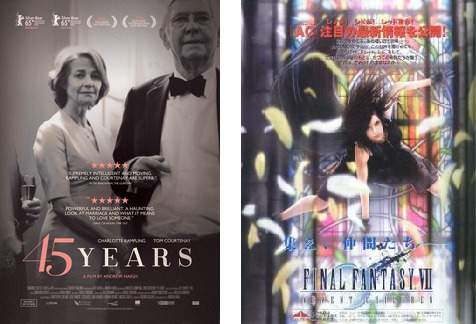
(one of these is a good film!)
By the end of Advent Children, Cloud is once again the idealized version of himself. A hero that the audience is supposed to like and admire. We are supposed to think that his actions in the first half of the movie (wallowing in his guilt and abandoning his family) were bad. These are the flaws that he must overcome through the course of the film, and by the end he does. If he really had been settling and treating his Seventh Heaven family as a second choice prior to the events of the film, that too would obviously be a character flaw that needs to be addressed before the end of the film. It isn’t because this is a dynamic that only exists in certain people’s imaginations.
If the creators wanted to leave the Cloud & Aerith relationship open to a romantic interpretation, they didn’t have to write themselves into such a corner. They wouldn’t have to change the final film much at all, merely adjust the chronology a bit. Instead of Cloud already living as a family with Tifa, Marlene and Denzel prior to the beginning of the film, you would show them on the precipice of becoming a family, but with Cloud being unable to take the final step without getting over his feelings for Aerith first. This would leave space for him to love both women without coming off as an opportunistic jerk.
This is essentially the dynamic with Locke/Rachel/Celes in FFVI. Locke is unable to move on with Celes or anyone else until he finally finds closure with Rachel. It’s a lovely scene that does not diminish his relationships with either woman. He loved Rachel. He will love Celes. What the game does not have him do is enter into a relationship into Celes first and then when the party arrives at the Phoenix Cave, have him suddenly remember ‘Oh shit, I’ve gotta deal with my baggage with Rachel before I can really move on.’ That would not paint him in a particularly positive light.
Speaking of other Final Fantasies, let’s take a look another sequel in the series set two years after the events of the original work, one that is clearly the story of its protagonist searching for their lost love. And guess what? Final Fantasy X-2 does not begin with Yuna shacked up and raising two kids with another dude. And it certainly doesn’t begin with his perspective of the whole situation when Yuna decides to search for Tidus.
Square Enix knows how to write these kind of stories when they want to, and it’s clearly not their intent for Cloud and Aerith. Again, the biggest obstacle in the way of a Cloud/Aerith endgame isn’t space and time or death, it’s the existence of Tifa Lockhart.
A reasonable question to ask would be, if SE is not trying to ignite debate over the love triangle, why make Cloud’s relationship with Aerith a part of Advent Children at all? Why invite that sort of confusion? Well, the answer here, like the answer in the OG, is that Aerith’s role in the sequel is much more than her relationship with Cloud.
In the OG, it wasn’t Cloud and the gang who managed to stop Sephiroth and Meteor in the end, it was Aerith from the Lifestream. In a two-hour long film, you do not have the time to set up a completely new villain who can believably end the world, and since you pretty much have to include Sephiroth, the main antagonist can really only be him. No one else in the party has been established to have any magical Cetra powers, and again, since that’s not something that can be effectively established in a two-hour long film, and since Aerith needs to appear somehow, it again needs to be her who will save the day.
Given the time constraints, this external conflict has to be connected with Cloud’s internal conflict. In the OG, Cloud’s emotional arc is in resolved in the Lifestream, and then we spend a few more hours hunting down the Huge Materia/remembering what Holy is before resolving the external conflict of stopping Meteor. In Advent Children, we do not have that luxury of time. These turning points have to be one and same. It is only after Aerith is “introduced” in the film when Cloud asks her for forgiveness that she is able to help in the fight against the Remnants. Thus the turning point for Cloud’s character arc and the external conflict are the same. It’s understandably economical storytelling, though I wouldn’t call it particularly good storytelling.
As much as Cloud feels guilt over both Zack and Aerith’s deaths, it’s only Aerith who can play this dual role in the film. Zack can appear to help resolve Cloud’s emotional arc, but since he has no special Cetra powers or anything, there’s little he can do to help in Cloud’s fight against the Remnants. More time would need to be spent contriving a reason why Cloud is able to defeat the Remnants now when he wasn’t before or explaining why Aerith can suddenly help from the Lifestream when she had been absent before. (I still don’t think the film does a particularly good job of explaining this part, but that is a conversation for another time).
Another reason why Zack could not play this role is because at the time of AC’s original release, all we knew of Cloud and Zack’s relationship was contained in an optional flashback at the Shinra mansion after Cloud returns from the Lifestream. If it was Zack who suddenly showed up at Cloud’s lowest point, most viewers, even many who played the original game, would probably have been confused, and the moment would have fallen flat. On the other hand, even the most casual fan would have been aware of Aerith and her connection to Cloud, with her death scene being among the most well-known gaming moments of all time. Moreover, Aerith’s death is directly connected to Sephiroth, who is once again the threat in AC, whereas Zack was killed by Shinra goons. Aerith serves multiple purposes in a way that Zack just cannot.
Despite all this, though Aerith is more important to the film as a whole, many efforts are made to suggest that Zack and Aerith are equally important to Cloud. One of the first scenes in the film is Cloud moping around Zack’s grave (And unlike the scene with Aerith in the Forgotten City, it isn’t directly connected with Cloud’s present storyline in any way). We have the aforementioned scene where Cloud has flashes of both Aerith’s and Zack’s deaths when he saves Tifa and Denzel. Cloud has a scene where he’s standing back to back with Zack, mirroring his scene with in the Forgotten City with Aerith, before the climax of his fight with Sephiroth. In the Lifestream, after Cloud “dies,” it’s both Aerith and Zack who are there to send him back. Before the film ends, Cloud sees both Aerith and Zack leaving the church.
Now, were all these Zack appearances a way to promote the upcoming spin-off game that he’s going to lead? Of course. But the creators surely would have known that having Zack play such a similar role in Cloud’s arc would make Cloud’s relationship with Aerith feel less special and thus complicating a romantic interpretation of said relationship. If they wanted to encourage a romantic reading of Cloud’s lingering feelings for Aerith, they would have given Zack his own distinct role in the film. Or rather, they wouldn’t have put Zack in the film at all, and they certainly wouldn’t have him lead his own game, but we’ll get to the Zack of it all later.
The funny thing is, in a way, Zack is portrayed as being more special to Cloud. Zack only exists in the film to interact with Cloud and encourage him. Meanwhile. Aerith also has brief interactions with Kadaj, the Geostigma children and even Tifa before the film’s end. Aerith is there to save the whole world. Zack is there just for Cloud. If it’s Cloud’s relationship with Aerith that’s meant to be romantic, shouldn’t it be the other way around?
Let’s take a look at Tifa Lockhart. What role did she have to play in the FF7 sequel film? If, like some, you believed FF7 to be the Cloud/Aerith/Sephiroth show, then Tifa could have easily had a Barret-sized cameo in Advent Children. And honestly, she’s just a great martial artist. She has no special powers that would make her indispensable in a fight against Sephiroth. You certainly would not expect her to be the 2nd billed character in the film. Though of course, if you actually played through the Original Game with your eyes open, you would realize that Tifa Lockhart is instrumental to any story about Cloud Strife.
Unlike Aerith’s appearances, almost none of the suggestive scenes and dynamics between Cloud and Tifa had to be included in the film. As in, they serve no other plot related purpose and could have easily been cut from the final film if the creators weren’t trying to encourage a romantic interpretation of their relationship.
It feels inevitable now, but no one was expecting Cloud and Tifa to be living together and raising two kids. In the general consciousness, FF7 is Cloud and Sephiroth and their big swords and Aerith’s death. At the time, in the eyes of most fans and casual observers, Cloud and Tifa being together wasn’t a necessary part of the FF7 equation the way say, an epic fight between Cloud and Sephiroth would be. In fact, I don’t think even the biggest Cloti fans at the time would have imagined Cloud and Tifa living together would be their canon outcome in the sequel film.
Now can two platonic friends live together and raise two children together? Absolutely, but again Cloud and Tifa are not real people. They are fictional characters. A reasonable person (let’s use the legal definition of the term) who does not have brainworms from arguing over one of the dumbest debates on the Internet for 23 years would probably assume that two characters who were shown to be attracted to each other in the OG and who are now living together and raising two kids are in a romantic relationship. This is a reasonable assumption to make, and if SE wanted to leave Cloud’s romantic inclinations ambiguous, they simply would not be depicting Cloud and Tifa’s relationship in this manner. Cloud’s disrupted peace could have been a number of different things. He could have been a wandering mercenary, he could have been searching for a way to be reunited with Aerith. It didn’t have to be the family he formed with Tifa, but, then again, if you were actually paying attention to the story the OG was trying to tell, of course he would be living with Tifa.
Let’s also look at the scene where Cloud finds Tifa in the church after her fight with Loz. All the plot related information (who attacked her, Marlene being taken) is conveyed in the brief conversation they have before Cloud falls unconscious from Geostigma. What purpose do all the lingering shots of Cloud and Tifa in the flower bed in a Yin-Yang/non-sexual 69ing position serve if not to be suggestive of the type of relationship they have? It’s beautifully rendered but ultimately irrelevant to both the external and internal conflicts of the film.

Likewise, there is no reason why Cloud and Tifa needed to wake up in their children’s bedroom. No reason to show Cloud waking up with Tifa next to him in a way that almost makes you think they were in the same bed. And there is absolutely no reason whatsoever for a close-up of Tifa’s hand with the Wolf Ring on her ring finger while she is admonishing Cloud during what sounds like a domestic argument (This ring again comes into focus when Tifa leads Denzel to Cloud at the church at the end - there are dozens of ways this scene could have been rendered, but this is the one that was chosen.) If it wasn’t SE’s intent to emphasize the family dynamic and the intimate nature of Cloud and Tifa’s relationship, these scenes would not exist.
Let’s also take a look at Denzel, the only new character in the AC (give or take the Remnants). Again, given the film’s brief runtime, the fact that they’re not only adding a new character but giving him more screen time than almost every other AVALANCHE member must mean that he’s pretty important. While Denzel does have an arc of his own, especially in ACC, he is intricately connected to Cloud and Tifa and solidifies the family unit that they’ve been forming in Edge. Marlene still has Barret, but with the addition of Denzel, the family becomes something more real albeit even more tenuous given his Geostigma diagnosis. Without Denzel in the picture, it’s a bit easier to interpret Cloud’s distance from Tifa as romantic pining for another woman, but now it just seems absurd. The stakes are so much higher. Cloud and Tifa are at a completely different stage in their lives from the versions of these characters we met early on in the OG who were entangled in a frivolous love triangle. And yet some people are still stuck trying to fit these characters into a childish dynamic that died at the end of disc one along with a certain someone.
All this is there in the film, at least the director’s cut, if you really squint. But since SE preferred to spend its time on countless action sequences that have aged as well as whole milk in lieu of spending a few minutes showing Cloud’s family life before he got Geostigma to establish the emotional stakes, or a beat or two more on his reconciliation with Tifa and the kids, people may be understandably confused about Cloud’s arc. Has Cloud just been a moping around in misery for the two years post-OG? The answer is no, though that can only really be found in the accompanying novellas, specifically Case of Tifa.
Concerning the novellas, which we apparently must read to understand said DVD sequel
I really don’t know how you can read through CoT and still think there is anything ambiguous about the nature of Cloud and Tifa’s relationship. The “Because I have you this time,” Cloud telling Tifa he’ll remind her how to be strong when they’re alone, Cloud confidently agreeing when Marlene adds him to their family. Not to mention Barret and Cid’s brief conversation about Cloud and Tifa’s relationship in Case of Barret, after which Cid comments that “women wear the pants,” which Barret then follows by asking Cid about Shera. Again, a reasonable person would assume the couple in question are in a romantic relationship, and if this wasn’t the intent, these lines would not be present. Especially not in a novella about someone else.
Some try to argue that CoT just shows how incompatible Cloud and Tifa are because it features a few low points in their relationship. I don’t think that’s Nojima’s intent. Even if it was, it certainly wouldn’t be to prove that Cloud loves Aerith. This isn’t how you tell that story. Why waste all that time disproving a negative rather than proving a positive? We didn’t spend hours in FF8 watching Rinoa’s relationship with Seifer fall apart to understand how much better off she is with Squall. If Cloud and Aerith is meant to be a love story, then tell their love story. Why tell the story of how Cloud is incompatible with someone else?
Part of the confusion may be because CoT doesn’t tell a complete story in and of itself. The first half of the story (before Cloud has to deliver flowers to the Forgotten City) acts as a sort of epilogue to the OG, while the second half of the story is something of a prologue to Advent Children (or honestly its missing Act One). And to state the obvious, conflict is inherent to any story worth telling. It can’t just be all fluff, that’s what the fanfiction is for.
Tifa’s conflict is her fear that the fragile little family they’ve built in Edge is going to fall apart. Thus we see her fret about Cloud’s distance, the way this affects Marlene, and Denzel’s sickness. There are certainly some low moments here --- Tifa telling Cloud to drink in his room, asking if he loves her -- all ways for the threat to seem more real, the outcome more uncertain, yet there’s only one way this conflict can be resolved. One direction to which their relationship can move.
Again, by the end of this story, both characters are supposed to be the best versions of themselves, to find their “happy” endings so to speak. Tifa could certainly find happiness outside of a relationship with Cloud. She could decide that they’ve given it a shot, but they’re better off as friends. She’s grateful for this experience and she’s learned from this, but now she’s ready to make a life for herself on her own. It would be a fine character arc, though not something the Final Fantasy series has been wont to do. However, that’s obviously not the case here as there’s no indication whatsoever that Tifa considers this as an option for herself. Nojima hasn’t written this off ramp into her journey. For Tifa, they’ll either become a real family or they won’t. Since this is a story that is going to have a happy ending, so of course they will, even if there are a lot of bumps along the way.
Unfortunately, with the Compilation being the unwieldy beast that this is, this whole arc has to be pieced together across a number of different works:
Tifa asking herself if they’re a real family in CoT
Her greatest fear seemingly come to life when Cloud leaves at the end of CoT/beginning of AC
Tifa explicitly asking Cloud if the reason they can’t help each other is because they’re not a real family during their argument in AC. Notably, even though Cloud is at his lowest point, he doesn’t confirm her fear. Instead he says he that he can’t help anyone, not even his family. Instead, he indirectly confirms that yes he does think they’re a family, even if is a frustrating moment still in that he’s too scared to try to save it.
The ending of AC where we see a new photo of Cloud smiling surrounded by Tifa and the kids and the rest of the AVALANCHE, next to the earlier photo we had seen of the four of them where he was wearing a more dour expression.
The ending of The Kids Are All Right, where Cloud, Tifa, Denzel and Marlene meet with Evan, Kyrie and Vits - and Cloud offers, unsolicited, that even if they’re not related by blood, they’re a family.
The ending of DVD extra ‘Reminiscence of FFVII’ where Cloud takes the day off and asks Tifa to close the bar so they can spend time together as a family as Tifa had wanted to do early in CoT
Cloud fears he’ll fail his family. Tifa fears it’ll fall apart. Cloud retreats into himself, pushing others away. Tifa neglects herself, not being able to say what she needs to say. In Advent Children, Tifa finally voices her frustrations. It’s then that Cloud finally confronts his fears. Like in the OG, Cloud and Tifa’s conflicts and character arcs are two sides of the same coin, and it’s only by communicating with each other are they able to resolve it. Though with the Compilation being an inferior work, it’s much less satisfying this time around. Such is the problem when you’re writing towards a preordained outcome (Cloud and Sephiroth duking it once again) rather than letting the story develop organically.
Some may ask, why mention Aerith so much (Cloud growing distant after delivering flowers to the Forgotten City, Cloud finding Denzel at Aerith’s church) if they weren’t trying to perpetuate the LTD? Well, as explained above, Aerith had to be in Advent Children, and since CoT is the only place where we get any insight into Cloud’s psyche, it’s here where Nojima expands on that guilt.
Again, this is a story that requires conflict, and what better conflict than the specter of a love rival? Notably, despite us having access to Tifa’s thoughts and fears, she never explicitly associates Cloud’s behavior with him pining after Aerith. Though it’s fair to say this fear is implied, if unwarranted.
If Cloud had actually been pining after Aerith this whole time, we would not be seeing it all unfold through Tifa’s perspective. You can depict a romance without drawing attention to the injured third party. We’re seeing all of this from Tifa’s POV, because it’s about Tifa’s insecurities, not the great tragic romance between Cloud and Aerith. Honestly, another reason we see this from Tifa’s perspective is because it’s dramatically more interesting. Because she’s insecure, she (and we the reader) wonder if there’s something else going on. Meanwhile, from Cloud’s perspective it would be straightforward and redundant, given what we see in AC. He’s guilty over Aerith’s death and thinks he doesn’t deserve to be happy.
Not to mention, the first time we encounter Aerith in CoT, Tifa is the one breaking down at her grave while Cloud is the one comforting her. Are we supposed to believe that he just forgot he was in love with Aerith until he had to deliver flowers to the Forgotten City?
And Aerith doesn’t just serve as a romantic obstacle. She’s also a symbol of guilt and redemption for both Cloud and Tifa. Neither think they have the right to be happy after all that’s happened (Aerith’s death being a big part of this), and through Denzel, who Cloud finds at Aerith’s church, they both see a chance to atone.
I do want to address Case of Lifestream: White because it’s only time in the entire Compilation where I’ve asked myself — what are they trying to achieve here? Now, I’d rather drink bleach than start debating the translation of ‘koibito’ again, but I did think it was a strange choice to specify the romantic nature of Aerith’s love for Cloud. I suppose it could be a reference her obvious attraction to Cloud in the OG, though calling it love feels like a stretch.
But nothing else in CoLW really gives me pause. It might be a bit jarring to see how much of it is Aerith’s thoughts of Cloud, but it makes sense when you consider the context in which it’s meant to be consumed. Unlike Case of Tifa or Case of Denzel, CoLW isn’t meant to be read on its own. It’s a few scant paragraphs in direct conversation with Case of Lifestream: Black. In CoLB, Sephiroth talks about his plan to return and end the world or whatever, and how Cloud is instrumental to his plan. Each segment of CoLW mirrors the corresponding segment of CoLB. Thus, CoLW has to be about Aerith’s plan to stop Sephiroth and the role Cloud must play in that. In both of these stories, Cloud is the only named character. It doesn’t mean that thoughts of Cloud consume all of Aerith’s afterlife. Case of Lifestream is only a tiny sliver of the story, a halfassed way to explain why in Advent Children the world is ending again and why Cloud has to be at the center of it all.
Notably, there is absolutely nothing in CoLW about Cloud’s feelings for Aerith. Even if it’s just speculation on her part as we see Sephiroth speculate about Cloud’s reactions in CoLB. Aerith can see what’s going on in the real world, but she says nothing about Cloud’s actions. If Cloud is really pining after her, trying to find a way to be reunited with her, wouldn’t this be the ideal story to show such devotion?
But it’s not there, because not only does it not happen, but because this story is not about Aerith’s relationship with Cloud. It is about how Aerith needs to see and warn Cloud in order to stop Sephiroth. By the end of Advent Children, that goal is fulfilled. Cloud gets his forgiveness. Aerith gets to see him again and helps him stop Sephiroth. There’s no suggestion that either party wants more. We finally have the closure that the OG lacked, and at no point does it confirm that Cloud reciprocated Aerith’s romantic feelings, even though there were plenty of opportunities to do so.
I don’t really know what else people were expecting. Advent Children isn’t a romantic drama. There’s not going to be a moment where Cloud explicitly tells Tifa, ‘I’ve never loved Aerith. It’s only been you all along.” This is just simply not the kind of story it is.
Though one late scene practically serves this function. When Cloud “dies” and Aerith finds him in the Lifestream, if there were any lingering romantic feelings between the two of them, this would be a beautiful bittersweet reunion. Maybe something about how as much as they want to be together, it’s not his time yet. Instead, it’s almost played off as a joke. Cloud calls her ‘Mother’, and Zack is at Aerith’s side, joking about how Cloud has no place there. This would be the perfect opportunity to address the romantic connection between Cloud and Aerith, but instead, the film elides this completely. Instead, it’s a cute afterlife moment between Aerith and Zack, and functionally allows Cloud to go back to where he belongs, to Tifa and the kids. Whatever Cloud’s feelings for Aerith were before, it’s transformed into something else.
Crisis Core -- or how Aerith finally gets her love story
The other relevant part of the Compilation is Crisis Core, which I will now touch on briefly (or at least brief for me). In the OG, Zack Fair was more plot device than character. We knew he was important to Cloud — enough that Cloud would mistake Zack’s memories for his own -- we knew he was important to Aerith — enough that she is initially drawn to Cloud due to his similarities to Zack — yet the nature of these relationships is more ambiguous. Especially his relationship with Aerith. From the little we learn of their relationship, it could have been completely one-sided on her part, and Zack a total cad. At least that’s the implication she leaves us with in Gongaga. We get the sense that she might not be the most reliable narrator on this point (why bring up an ex so often, unsolicited, if it wasn’t anything serious?) but the OG never confirms this either way.
Crisis Core clears this up completely. Not only is Zack portrayed as the Capital H Hero of his own game, but his relationships with Cloud and Aerith are two of the most important in the game. In fact, they are the basis for his heroic sacrifice at the game’s end: he dies trying to save Cloud’s life; he dies trying to return to Aerith.
Zack’s relationship with Aerith is a major subplot of the game. Not only that, but the details of said relationship completely recontextualizes what we know about the Aerith we see in the OG. Many of Aerith’s most iconic traits (wearing pink, selling flowers) are a direct product of this relationship, and more importantly, so many of the hallmarks of her early relationship with Cloud (him falling through her church, one date as a reward, a conversation in the playground) are a direct echo of her relationship with Zack.
A casual fling this was not. Aerith’s relationship with Zack made a deep impact on the character we see in the OG and clearly colored her interactions with Cloud throughout.
Crisis Core is telling Zack’s story, and Tifa is a fairly minor supporting character, yet it still finds the time to expand upon Cloud and Tifa’s relationship. Through their interactions with Zack, we learn just how much they were on each others’ minds during this time, and how they were both too shy to own up to these feelings. We also get a brief expansion on the moment Cloud finds Tifa injured in the reactor.
Meanwhile, given the point we are in the story’s chronology, Cloud and Aerith are completely oblivious of each other’s existence.
One may try to argue that none of this matters since all of this is in the past. While this argument might hold water if we arguing about real lives in the real world, FF7 is a work of fiction. Its creators decided that these would be events we would see, and that Zack would be the lens through which we’d see them. Crisis Core is not the totality of these characters’ lives prior to the event of the OG. Rather, it consists of moments that enhance and expand upon our understanding of the original work. We learn the full extent of Hojo’s experimentation and the Jenova project; we learn that Sephiroth was actually a fairly normal guy before he was driven insane when he uncovers the circumstances of his birth. We learn that Aerith was a completely different person before she met Zack, and their relationship had a profound impact on her character.
A prequel is not made to contradict the original work, but what it can do is recontexualize the story we already know and add a layer of nuance that may have not been obvious before. Thus, Sephiroth is transformed from a scary villain into a tragic figure who could have been a hero were it not for Hojo’s experiments. Aerith’s behavior too invites reinterpretation. What once seemed flirty and perhaps overtly forward now looks like the tragic attempts of a woman trying to recapture a lost love.
If Cloud and Aerith were meant to be the official couple of the Compilation of FF7, you absolutely would not be spending so much time depicting two relationships that will be moot by the time we get to the original work. You especially would not depict Zack and Aerith’s relationship in a way that makes Aerith’s relationship with Cloud look like a copy of the moments she had with her ex.
Additionally, with Zack’s relationship with Angeal, we can see, that within the universe of FF7, a protagonist being devastated over the death of a beloved comrade isn’t something that’s inherently romantic. Neither is it romantic for said dead comrade to lend a helping hand from the beyond.
SE would also expect some people to play Crisis Core before the OG. If Cloud and Aerith are the intended endgame couple, then SE would be asking the player to root for a guy to pursue the girlfriend of the man who gave his life for him. The same man who died trying to reunite with her. This is to say nothing of Cloud’s treatment of Tifa in this scenario. How could this possibly be the intent for their most popular protagonist in the most popular entry of their most popular franchise?
What Crisis Core instead offers is something for fans of Aerith who may be disappointed that she was robbed of a great romance by her death. Well, she now gets that epic, tragic romance. Only it’s with Zack, not Cloud.
If SE intended for Cloud and Aerith to be the official couple of FF7, neither Zack nor Tifa would exist. They would not spend so much time developing Zack and Tifa into the multi-dimensional characters they are, only to be treated as nothing more than collateral damage in the wake of Cloud and Aerith’s great love. No, this is a Final Fantasy. SE want their main characters to have something of a happy ending after all of the tribulations they face. Cloud and Tifa find theirs in life. Zack and Aerith, as the ending of AC suggests, find theirs in death.
Cloud and Aerith’s relationship isn’t a threat to the Zack/Aerith and Cloud/Tifa endgame, nor is it a mere obstacle. Rather, it’s a relationship that actually deepens and strengthens the other two. Aerith is explicitly searching for her first love in Cloud, revealing just how deep her feelings for Zack ran. Cloud gets to live out his heroic SOLDIER fantasy with Aerith, a fantasy he created just to impress Tifa.
There are moments between Cloud and Aerith that may seem romantic when taken on its own, but viewed within the context of the whole narrative, ultimately reveal that they aren’t quite right for each other, and in each other, they’re actually searching for someone else.
This quadrangular dynamic reminds me a bit of one of my favorite classic films, The Philadelphia Story. (Spoilers for a film that came out in 1940 ahead) — The single most romantic scene in the film is between Jimmy Stewart’s and Katherine Hepburn’s characters, yet they’re not the ones who end up together. Even as their passions run, as the music swells, and we want them to end up together, we realize that they’re not quite right for each other. We know that it won’t work out.
More relevantly, we know this is true due to the existence of Cary Grant’s and Ruth Hussey’s characters, who are shown to carry a torch for Hepburn and Stewart, respectively. Grant and Hussey are well-developed and sympathetic characters. With the film being the top grossing film of the year, and made during the Code era, it’s about as “clean” of a narrative as you can get. There’s no way Grant and Hussey would be given such prominent roles just to be left heartbroken and in the cold by the film’s end.
Hepburn’s character (Tracy) pretty much sums it herself after some hijinks lead to a last minute proposal from Stewart’s character (Mike):
Mike: Will you marry me, Tracy?
Tracy: No, Mike. Thanks, but hmm-mm. Nope.
Mike: l've never asked a girl to marry me. l've avoided it. But you've got me all confused now. Why not?
Tracy: Because l don't think Liz [Hussey’s character] would like it...and l'm not sure you would...and l'm even a little doubtful about myself. But l am beholden to you, Mike. l'm most beholden.
Despite the fact that the film spends more time developing Hepburn and Stewart’s relationship than theirs with their endgame partners, it’s still such a satisfying ending. That’s because, even at the peak of their romance, we can see how Stewart needs someone like Hussey to ground his passionate impulses, and how Hepburn needs Grant, someone who won’t put her on a pedestal like everyone else. Hepburn and Stewart’s is a relationship that might feel right in the moment, but doesn’t quite work in the light of day.
I don’t think Cloud and Aerith share a moment that is nearly as romantic in FF7, but the same principle applies. What may seem romantic in the moment actually reveals how they’re right for someone else.
Even if Aerith lives and Cloud decides to pursue a relationship with her, it’s not going to be all puppies and roses ahead for them. Aerith would need to disentangle her feelings for Zack from her attraction to Cloud, and Cloud would still need to confront his feelings for Tifa, which were his main motivator for nearly half his life, before they can even start to build something real. This is messy work, good fodder for a prestige cable drama or an Oscar-baity indie film, but it has no place in a Final Fantasy. There simply isn’t the time. Not when the question on most players’ minds isn’t ‘Cloud does love?’ but ‘How the hell are they going to stop that madman and his Meteor that’s about to destroy the world?’
With Zerith’s depiction in Crisis Core, there’s a sort of bittersweet poetry in how the two relationships rhyme but can’t actually coexist. It is only because Zack is trying to return to Midgar to see Aerith that Cloud is able to reunite with Tifa, and the OG begins in earnest. In another world, Zack and Aerith would be the hero and heroine who saved the world and lived to tell the tale. They are much more the traditional archetypes - Zack the super-powered warrior who wants to be a Capital-H Hero, and Aerith, the last of her kind who reluctantly accepts her fate. Compared to these two, Cloud and Tifa aren’t nearly so special, nor their goals so lofty and noble. Cloud, after all, was too weak to even get into SOLDIER, and only wanted to be one, not for some greater good, but to impress the girl he liked. Tifa has no special abilities, merely learning martial arts when she grew wise enough to not wait around for a hero. On the surface, Cloud and Tifa are made of frailer stuff, and yet by luck or by fate, they’re the ones who cheat death time and time again, and manage to save the world, whereas the ones who should have the role, are prematurely struck down before they can finish the job. Cloud and Tifa fulfill the roles that they never asked for, that they may not be particularly suited for, in Zack and Aerith’s stead. There’s a burden and a beauty to it. Cloud and Tifa can live because Zack and Aerith did not.
All of this nuance is lost if you think Cloud and Aerith are meant to be the endgame couple. Instead, you have a pair succumbing to their basest desires, regardless of the selfless sacrifices their other potential paramours made for their sake. Zack and Tifa, and their respective relationships with Aerith and Cloud, are flattened into mere romantic obstacles. The heart wants what it wants, some may argue. While that may be true in real life, that is not necessarily the case in a work of fiction, especially not a Final Fantasy. The other canon Final Fantasy couples could certainly have had previous romantic relationships, but unless they have direct relevance to the their character arcs (e.g., Rachel to Locke), the games do not draw attention to them because they would be a distraction from the romance they are trying to tell. They’ve certainly never spent the amount of real estate FF7 spends in depicting Cloud/Tifa and Zack/Aerith’s relationships.
At last…the Remake, and somehow this essay isn’t even close to being over
Finally, we come to the Remake. With the technological advancements made in the last 23 years and the sheer amount of hours they’re devoting to just the Midgar section this time around, you can almost look at the OG as an outline and the Remake as the final draft. With the OG being overly reliant on text to do its storytelling, and the Remake having subtle facial expressions and a slew of cinematic techniques at its disposal, you might almost consider it an adaptation from a literary medium to a visual one. Our discussions are no longer limited to just what the characters are saying, but what they are doing, and even more importantly, how the game presents those actions. When does the game want us to pay attention? And what does it want us to pay attention to?
Unlike most outlines, which are read by a small handful of execs, SE has 23 years worth of reactions from the general public to gauge what works and what doesn’t work, what caused confusion, and what could be clarified. While FF7 is not a romance, the LTD remains a hot topic among a small but vocal part of the fanbase. It certainly is an area that could do with some clarifying in the Remake.
Since the Remake is not telling a new story, but rather retelling an existing story that has been in the public consciousness for over two decades, certain aspects that were treated as “twists” in the OG no longer have that same element of surprise, and would need to approached differently. For example, in the Midgar section of the OG, Shinra is treated as the main antagonist throughout. It’s only when we get to the top of the Shinra tower that Sephiroth is revealed as the real villain. Anyone with even a passing of knowledge of FF7 would be aware of Sephiroth so trying to play it off like a surprise in the Remake would be terribly anticlimactic. Thus, Sephiroth appears as early as Ch. 2 to haunt Cloud and the player throughout.
Likewise, many players who’ve never even touched the OG are probably aware that Aerith dies, thus her death can no longer be played for shock. While SE would still want the player to grow attached to Aerith so that her death has an emotional impact, there are diminishing returns to misdirecting the player about her fate, at least not in the same way it was done in the OG.
How do these considerations affect the how the LTD is depicted in the Remake? For the two of the biggest twists in the OG to land in the Remake — Aerith’s death and Cloud’s true identity in the Lifestream — the game needs to establish:
Aerith’s attraction to Cloud, specifically due to his similarities to Zack. This never needs to go past an initial attraction for the player to understand that the man whose memory Cloud was “borrowing” is Zack. Aerith’s feelings for Cloud can evolve into something platonic or even maternal by her end without the reveal in the Lifestream losing any impact.
Cloud’s love for Tifa. For the Lifestream sequence to land with an “Ooooh!” rather than a “Huh!?!?”, the Remake will need to establish that Cloud’s feelings for Tifa were strong enough to 1) motivate him to try to join SOLDIER in the first place 2) incentivize him to adopt a false persona because he fears that he isn’t the man she wants him to be 3) call him back to consciousness from Make poisoning twice 4) help him put his mind back together and find his true self. That’s a lot of story riding on one guy’s feelings!
The player’s love for Aerith so that her death will hurt. This can be done by making them invested in Aerith as a character by her own right, but also extends to the relationships she has with the other characters (not only Cloud).
What is not necessary is establishing Cloud’s romantic feelings for Aerith. Now, would their doomed romance make her death hurt even more? Sure, but it could work just as well if Cloud if is losing a dear friend and ally, not a lover. Not to mention, her death also cuts short her relationships with Tifa, Barret, Red XII, etc. Bulking those relationships up prior to her death, would also make her loss more palpable. If anything, establishing Cloud’s romantic feelings for Aerith would actually undermine the game’s other big twist. The game needs you to believe that Cloud’s feelings for Tifa were strong enough to drive his entire hero’s journey. If Cloud is shown falling in love with another woman in the span of weeks if not mere days, then the Lifestream scene would be much harder to swallow.
Cloud wavering between the two women made sense in the OG because the main way for the player to get to know Aerith was through her interactions with Cloud. That is no longer the case in the Remake. Cloud is still the protagonist, and the player character for the vast majority of the game, but there are natural ways for the player to get to know Aerith outside of her dialogue exchanges with Cloud. Unless SE considers the LTD an integral part of FF7’s DNA, then for the sake of story clarity, the LTD doesn’t need to exist.
How then does the Remake clarify things?
I’m not going go through every single change in the Remake — there are far too many of them, and they’ve been documented elsewhere. Most of the changes are expansions or adaptations (what might make sense for super-deformed chibis would look silly for realistic characters, e.g., Cloud rolling barrels in the Church has now become him climbing across the roof support). What is expanded and how it’s adapted can be telling, but what is more interesting are the additions and removals. Not just for what takes place in the scenes themselves, but how their addition or removal changes our understanding of the narrative as a whole vis-a-vis the story we know from the OG.
Notably, one of the features that is not expanded upon, but rather diminished, is player choice. In the OG, the player had a slew of dialogue options to choose from, especially during the Midgar portion of the game. Not only did it determine which character would go on a date with Cloud at the Gold Saucer, but it also made the player identify with Cloud since they’re largely determining his personality during this stage. Despite the technological advances that have made this level of optionality the norm in AAA games, the Remake gives the player far fewer non-gameplay related choices, and only really the illusion of choice as a nod to the OG, but they don’t affect the story of the game in any meaningful way. You get a slightly different conversation depending on the choice, but you have to buy the Flower, Tifa has to make you a drink.
So much of what fueled the LTD in the OG came from this mechanic, which is now largely absent in the Remake. Almost every instance where there was a dialogue branch in the OG has become a single, canon scenario in the Remake that favors Tifa (e.g., having the choice of giving the flower to Tifa or Marlene in the OG, to Cloud giving the flower to Tifa in the Remake). Similarly, for the only meaningful choice you make in the Remake — picking Tifa or Aerith in the sewers — Cloud is now equidistant to both girls, whereas in the OG, his starting point was much closer to Aerith. In the OG, player choice allowed you to largely determine Cloud’s personality, and the girl he favored — and seemingly encouraged you to choose Aerith in many instances. In the Remake, Cloud is now his own character, not who the player wants him to be. And this Cloud, well, he sure seems to have a thing for Tifa.
In fact, one of the first changes in the Remake is the addition of Jessie asking Cloud about his relationship with Tifa, and Cloud’s brief flashback to their childhood together. In the OG, Tifa isn’t mentioned at all during the first reactor mission, and we don’t see her until we get to Sector 7.
Not only does this scene reveal Tifa’s importance to Cloud much earlier on than in the OG, but it sets up a sort of frame of reference that colors Cloud’s subsequent interactions. Even as Jessie kind of flirts with him throughout the reactor mission, even with his chance meeting Aerith in Sector 8, in the back of your mind, you might be thinking — wait what about his relationship with this Tifa character? What if he’s already spoken for?
Think about how this plays out in the OG. Jessie is pretty much a non-entity, and Cloud has his meet-cute with the flower girl before we’re even aware that Tifa exists. It’s hard to get too invested in his interactions with Tifa, when you know he has to meet the flower girl again, and you’re waiting for that moment, because that’s when the game will start in earnest.
After chapter 1 of the Remake, a new player may be asking — who is this Tifa person, and, echoing Jessie’s question, what kind of relationship does she have with Cloud? It’s a question that’s repeated when Barret mentions her before they set the bomb, and again when Barret specifies Seventh Heaven is where Tifa works — and the game zooms in on Cloud’s face — when they arrive in Sector 7.
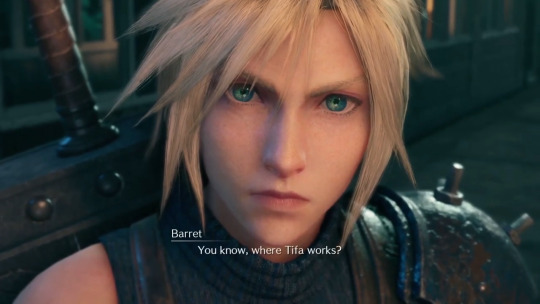
It’s when we finally meet her at Seventh Heaven in Ch. 3 that we feel, ah now, this game has finally begun.
It’s also interesting how inorganically this question is introduced in the Remake. Up until that moment, the dialogue and Cloud are all business. Then, as they’re waiting for the gate to open, Jessie asks about Tifa completely out of the blue, and Cloud, all of a sudden, is at a lost for words, and has the first of many flashbacks. That this moment is a bit incongruous shows the effort SE made to establish Tifa’s importance to the game and to Cloud early on.
One of the biggest changes in the Remake is the addition of the events in Ch. 3 and 4. Unlike what happens in Ch. 18, Ch. 3 and 4 feel like such a natural extension of the OG’s story that many players may not even realize that SE has added an whole day’s and night’s worth of events to the OG’s story. While not a drastic change, it does reshape our understanding of subsequent events in the story, namely Cloud’s time spent alone with Aerith.
In the OG, we rush from one reactor mission to the next, with no real time to explore Cloud’s character or his relationships with any of the other characters in between. When he crashes through the church, he gets a bit of a breather. We see a different side of him with Aerith. Since we have nothing else to compare it to, many might assume that his relationship with Aerith is special. That she brings something out of him that no one else can.
That is no longer the case in the Remake. While Cloud’s time in Sector 5 with Aerith remains largely unchanged though greatly expanded, it no longer feels “special.” So many of the beats that seemed exclusive to his relationship with Aerith in the OG, we’ve now already seen play out with both Tifa and the other members of AVALANCHE long before he meets Aerith.
Cloud tells the flowers to listen to Aerith; he’s told Tifa he’s listening if she wants to talk; told Bigg’s he wants to hear the story of Jessie’s dad. Cloud offers to walk Aerith back home; he offered the same to Wedge. Cloud smiles at Aerith; he’s already smiled at Tifa and AVALANCHE a number of times.
Now, I’m under no illusion that SE added these chapters solely to diminish Aerith’s importance to Cloud (other than the obvious goal of making the game longer, I imagine they wanted the player to spend more time in Sector 7 and more time with the other AVALANCHE members so that the collapse of the Pillar and their deaths have more weight), but they certainly must have realized that this would be one effect. If pushing Cloud/Aerith’s romance had been a goal with the Remake, this would be a scenario they would try to avoid. Notably, the other place where time has been added - the night in the Underground Shinra Lab, and the day helping other people out around the slums — are also periods of time when Aerith is absent.
Home Sweet Slums vs. Budding Bodyguard
Since most of the events in Ch. 3 were invented for the Remake, and thus we have nothing in the OG to compare it to (except to say that something is probably better than nothing), I thought it would be more interesting to compare it to Ch. 8. Structurally, they are nearly identical — Cloud doing sidequests around the Sectors with one of the girls as his guide. Extra bits of dialogue the more sidequests you complete, with an optional story event if you do them all. Do Cloud’s relationships with each girl progress the same way in both chapters? Is the Remake just Final Waifu Simulator 2020 or are they distinct, reflecting their respective roles in the story as a whole?
A lot of what the player takes away from these chapters is going to be pretty subjective (Is he annoyed with her or is he playing hard to get), yet the vibes of the two chapters are quite different. This is because in Ch. 3, the player is getting to know Tifa through her relationship with Cloud; in Ch. 8; the player is getting to know Aerith as a character on her own.
What do I mean by this? Let’s take Cloud’s initial introduction into each Sector. In Ch. 3, it’s a straight shot from Seventh Heaven to Stargazer Heights punctuated by a brief conversation where Tifa asks Cloud about the mission he was just on. We don’t learn anything new about Tifa’s character here. Instead we hear Cloud recount the mission we already saw play out in detail in Ch. 1 But it’s through this conversation that we get a glimpse of Cloud and Tifa’s relationship — unlike the reticent jerk he was with Avalanche, this Cloud is much more responsive and even tries to reassure her in his own stilted way. We also know that they have enough of a past together that Tifa can categorize him as “not a people person” — an assessment to which Cloud agrees. Slowly, we’re getting an answer to the question Jessie posed in Ch. 1 — just what kind of relationship does Cloud have with Tifa?
In Ch. 8, Aerith leads Cloud on a roundabout way through Sector 5, and stops, unprompted, to talk about her experiences helping at the restaurant, helping out the doctor, and helping with the orphans at the Leaf House. It’s not so much a conversation as a monologue. Cloud isn’t the one who inquires about these relationships, and more jarringly, he doesn’t respond until Aerith directly asks him a question (interestingly enough, it’s about the flower she gave him…which he then gave to Tifa). Here, the game is allowing the player to learn more about the kind of person Aerith is. Cloud is also learning about Aerith at the same time, but with his non-reaction, either the game itself is indifferent to Cloud’s feelings towards Aerith or it is deliberately trying to portray Cloud’s indifference to Aerith.
The optional story event you can see in each chapter after completing all the side quests is also telling. In Ch. 3, “Alone at Last” is almost explicitly about Cloud and Tifa’s relationship. It’s bookended by two brief scenes between Marle and Cloud — the first in which she lectures him about how he should treat Tifa almost like an overprotective in-law, the second after they return downstairs and Marle awards Cloud with an accessory “imbued with the fervent desire to be by one’s side for eternity” after he makes Tifa smile. In between, Cloud and Tifa chat alone in her room. Tifa finally gets a chance to ask Cloud about his past and they plan a little date to celebrate their reunion. There is also at least the suggestion that Cloud was expecting something else when Tifa asked him to her room.
In Ch. 8’s “The Language of Flowers,” Cloud and Aerith’s relationship is certainly part of the story — unlike earlier in the chapter, Cloud actually asks Aerith about what she’s doing and even supports her by talking to the flowers too, but the other main objective of this much briefer scene is to show Aerith’s relationship with the flowers and of her mysterious Cetra powers (though we don’t know about her ancestry just yet). Like a lot of Aerith’s dialogue, there’s a lot of foreshadowing and foreboding in her words. If anything, it’s almost as if Cloud is playing the Marle role to the flowers, as an audience surrogate to ask Aerith about her relationship with the flowers so that she can explain. Also, there’s no in-game reward that suggests what the scene was really about.
If there’s any confusion about what’s going on here, just compare their titles “Alone At Last” vs. “The Language of Flowers.”
I’ll try not to bring my personal feelings into this, but there’s just something so much more satisfying about the construction of Ch. 3. This is some real storytelling 101 shit, but I think a lot of it due to just how much set up and payoff there is, and how almost all of said payoff deepens our understanding of Cloud and Tifa’s relationship:
Marle: Cloud meets Tifa’s overprotective landlady towards the beginning of the chapter. She is dubious of his character and his relationship with TIfa. This impression does not change the second time they meet even though Tifa herself is there to mediate. It’s only towards the end of the chapter, after all the sidequests are complete, that this tension is resolved. Marle gives Cloud a lecture about how he should be treating Tifa, which he seems to take to heart. And Cloud finally earns Marle’s begrudging approval after he emerges from their rooms with a chipper-looking Tifa in tow.
Their past: For their first in-game interaction, Cloud casually brings up that fact that it’s been “Five years” since they’ve last, which seem to throw Tifa off a bit. As they’re replacing filters, Cloud asks Tifa what she’s been up to in the time since they’ve been apart, and Tifa quickly changes the subject. Tifa tries to ask Cloud about his life “after he left the village,” at the Neighborhood Watch HQ, and this time he’s the one who seems to be avoiding the subject. It’s only after all the Ch. 3 sidequests are complete, and they're alone in her room that Tifa finally gets the chance to ask her question. A question which Cloud still doesn’t entirely answer. This question remains unresolved, and anyone’s played the OG will know that it will remain unresolved for some time yet, as it is THE question of Cloud’s story as a whole.
The lessons: Tifa starts spouting off some lessons for life in the slums as she brings Cloud around the town, though it’s unclear if Cloud is paying attention or taking them to heart. After completing the first sidequest, Cloud repeats one of these sayings back to her, confirming that he’s been listening all along. By the end of the chapter, Cloud is repeating these lessons to himself, even when Tifa isn’t around. These lessons extend beyond this chapter, with Cloud being a real teacher’s pet, asking Tifa “Is this a lesson” in Ch. 10 once they reunite.
The drink: When Cloud first arrives at Seventh Heaven, Tifa plays hostess and asks him if he wants anything, but it seems he’s only interested in his money. After exploring the sector a bit, Tifa again tries to play the role of cheery bartender, offering to make him a cocktail at the bar, but Cloud sees through this facade, and they carry on. Finally, after the day’s work is done, to tide Cloud over while she’s meeting with AVALANCHE, Tifa finally gets the chance to make him a drink. No matter, which dialogue option the player chooses, Tifa and Cloud fall into the roles of flirty bartender and patron quite easily. Who would have thought this was possible from the guy we met in Ch. 1?
This dynamic is largely absent in Ch. 8, except perhaps exploring Aerith’s relationship with the flowers, which “pays off” in the “Language of Flowers” event, but again, that scene is primarily about Aerith’s character rather than her relationship with Cloud. The orphans and the Leaf House are a throughline of the chapter, but they are merely present. There’s no clear progression here as was the case with in Ch. 3. Sure, the kids admire Cloud quite a bit after he saves them, but it’s not like they were dubious of his presence before. They barely paid attention to him. In terms of the impact the kids have on Cloud’s relationship with Aerith, there isn’t much at all. Certainly nothing like the role Marle plays in developing his relationship with Tifa.
The thing is, there are plenty of moments that could have been set ups, only there’s no real follow through. Aerith introduces Cloud around town as her bodyguard, and some people like the Doctor express dubiousness of his ability to do the job, but even after we spend a whole day fighting off monsters, and defeating Rude, there’s no payoff. Not even a throwaway “Wow, great job bodyguarding” comment. Same with the whole “one date” reward. Other than a quick reference on the way to Sector 5, and Aerith threatening to reveal the deal to cajole Cloud into helping her gather flowers, it’s never brought up again, in this chapter, or the rest of the game.
Aerith also makes a big stink about Cloud taking the time to enjoy Elmyra’s cooking. This is after Cloud is excluded from AVALANCHE’s celebration in Seventh Heaven and after he misses out on Jessie’s mom’s “Midgar Special” with Biggs and Wedge. So this could have been have been the set up to Cloud finally getting to experience a nice, domestic moment where he feels like he’s part of a family. And this dinner does happen! Only…the Remake skips over it entirely. Which is quite a strange choice considering that almost every other waking moment of Cloud’s time in Midgar has been depicted in excruciating detail. SE has decided that either whatever happened in this dinner between these three characters is irrelevant to the story they’re trying to tell, or they’ve deliberately excluded this scene from the game so that the player wouldn’t get any wrong ideas from it (e.g., that Cloud is starting to feel at home with Aerith).
Speaking of home, the Odd Jobs in Ch. 3 feel a bit more meaningful outside of just the gameplay-related rewards because they’re a way for Cloud to improve his reputation as he considers building a life for himself in Sector 7. This intent is implicit as Tifa imparts upon him the life lessons for surviving the slums, and then explicit, when Tifa asks him if he’s going to “stick around a little longer” outside of Seventh Heaven and he answers maybe. (It is later confirmed when Cloud and Tifa converse in his room in Ch. 4 after he remembers their promise).
Despite Aerith’s endeavors to extend their time together, there’s no indication that Cloud is planning to put down roots in Sector 5, or even return. Not even after doing all the Odd Jobs. If anything, it’s just the opposite — after 3 Odd Jobs, Aerith, kind of jokingly tells Cloud “don’t think you can rely on me forever.” This is a line that has a deeper meaning for anyone who knows Aerith’s fate in the OG, but Cloud seems totally fine with the outcome. Similarly, at the end of the Chapter 8, Elmyra asks Cloud to leave and never speak to Aerith again — a request to which he readily agrees.
Adding to the different vibes of the Chapters are the musical themes that play in the background. In Ch. 3, it’s the “Main Theme of VII”, followed by “On Our Way” — two tracks that instantly recall the OG. While the Main Theme is a bit melancholy, it's also familiar. It feels like home. In Ch. 8, we have an instrumental version of ‘Hollow’ - the new theme written for the Remake. While, it’s a lovely piece, it’s unfamiliar and honestly as a bit anxiety inducing (as is the intent).
(A quick aside to address the argument that this proves ‘Hollow’ is about Cloud’s feelings for Aerith:
Which of course doesn’t make any damn sense because he hasn’t even lost Aerith at this point the story. Even if you want to argue that there is so timey-wimey stuff going on and the whole purpose of the Remake is to rewrite the timeline so that Cloud doesn’t lose Aerith around — shouldn’t there be evidence of this desire outside of just the background music? Perhaps, in Cloud’s actions during the Chapter which the song plays — shouldn’t he dread being parted from her, shouldn’t he be the one trying to extend their time together? Instead, he’s willing to let her go quite easily.
The more likely explanation as to why “Hollow” plays in Ch. 8 is that since the “Main Theme of FFVII” already plays in Ch. 3, the other “main theme” written for the Remake is going to play in the other chapter with a pseudo-open world vibe. If you’re going to say “Hollow” is about Cloud’s feelings for Aerith then you’d have to accept that the Main Theme of the entire series is about Cloud’s feelings for Tifa, which would actually make a bit more sense given that is practically Cloud’s entire character arc.)
Both chapters contain a scripted battle that must be completed before the chapter can end. They both contain a shot where Cloud fights side by side with each of the girls.
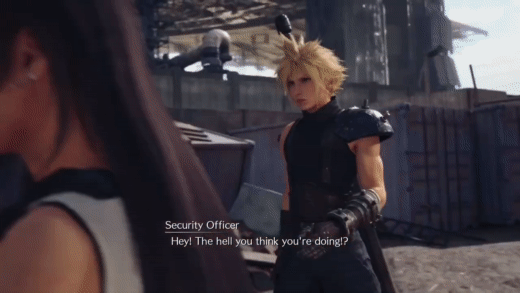
Here, Cloud and Tifa are both in focus during the entirety of this shot.
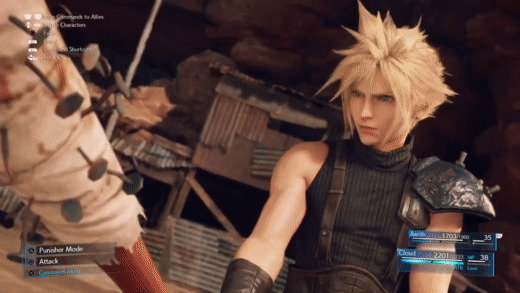
Here, the focus pulls away from Cloud the moment Aerith enters the frame.
I doubt the developers expected most players to notice this particular technique, but it reflects the subtle differences in the way these two relationships are portrayed. By the end of Ch. 3, Cloud and Tifa are acting as one unit. By the end of Ch. 8, even when they’re together, Cloud and Aerith are still apart.
A brief (lol) overview of some meaningful changes from the OG
One of the most significant changes in the Sector 7 chapters is how The Promise flashback is depicted. In the OG, Tifa is the one who has to remind Cloud of the Promise, in a rather pushy way, and whether Cloud chooses to join the next mission to fulfill his promise to her or because Barret is giving him a raise feels a bit more ambiguous.
In the Remake, the Promise has it’s own little mini-arc. It’s first brought up at the end of Ch. 3 when Cloud talks to Tifa about her anxieties about the upcoming mission. Tifa subtly references the Promise by mentioning that she’s “in a pitch” — a reference that goes over Cloud’s head. It’s only in Ch. 4, in the middle of a mission with Biggs and Wedge, where Tifa is no where in sight, that a random building fan reminds him of the Nibelheim water tower and the Promise he made to Tifa there. There’s also another brief flashback to that earlier moment in the bar when Tifa mentions she’s in a “pinch.” Again, the placement of this particular flashback at this particular moment feels almost jarring. And the flashback to the scene in the bar — a flashback to a scene we’ve already seen play out in-game — is the only one of its kind in the Remake. SE went out of the way to show that this particular moment is very important to Cloud and the game as whole. It’s when Cloud returns to his room, and Tifa asks him if he’s planning to stay in Midgar, that this mini-arc is finally complete. He brings up the Promise on his own, and makes it explicit that the reason he’s staying is for her. It’s to fulfill his Promise to her, not for money or for AVALANCHE — at this point, he’s not even supposed to be going on the next mission.
The Reactor 5 chapters are greatly expanded, but there aren’t really any substantive changes other than the addition of the rather intimate train roll scene between and Cloud and Tifa, which adds nothing to the story except to establish how horny they are for each other. We know this is the case, of course, because if you go out of your way to make Cloud look like an incompetent idiot and let the timer run out, you can avoid this scene altogether. But even in that alternate scene, Cloud’s concern for Tifa is crystal clear.
Ch. 8 also plays out quite similarly to the OG for the most part, though Cloud’s banter with Aerith on the rooftops doesn’t feel all that special since we’ve already seen him do the same with Tifa, Barret and the rest of AVALANCHE. The rooftops is the first place Cloud laughs in the OG. In the Remake, while Cloud might not have straight out laughed before, he’s certainly smiled quite a bit in the preceding chapters. Also, with the addition of voice acting and realistic facial expressions, that “laughter” in the Remake comes off much more sarcastic than genuine.
It’s also notable that in the Remake, Cloud vocally protests almost every time Aerith tries to extend their time together. In the OG, Cloud says nothing in these moments, which the player could reasonably interpret as assent.
One major change in the Remake is how Aerith learns of Tifa’s existence. In the OG, Cloud mentions that he wants to go back to Tifa’s bar, prompting Aerith to ask him about his relationship with her. In the Remake, Cloud calls Tifa’s name after having a random flashback of Child Tifa as he’s walking along with some kids. Again the insertion of said flashback is a bit jarring, prompting Aerith to understandably ask Cloud about just who this Tifa is. In the OG, this exchange served to show Aerith’s jealousy and her interest in Cloud. In the Remake, it’s all about Cloud’s feelings for Tifa and his inability to articulate them. As for Aerith, I suppose you can still read her reaction as jealous, though simple curiosity is a perfectly reasonable way to read it too. It plays out quite similarly to Aerith asking Cloud about who he gave the flower to. Her follow ups seem indicate that she’s merely curious about who this recipient might be rather than showing that she’s upset/jealous of the fact that said person exists.
For the collapsed tunnel segment, the Remake adds the recurring bit of Aerith and Cloud trying to successfully complete a high-five. While this is certainly a way to show them getting closer, it’s about least intimate way that SE could have done so. Just think about the alternatives — you could have Cloud and Aerith sharing brief tidbits of their lives after each mechanical arm, you could have them trying to reach for each other’s hand. Instead, SE chose an action that is we’ve seen performed between a number of different platonic buddies, and an action that Aerith immediately performs with Tifa upon meeting her. Not to mention, even while they are technically getting closer, Cloud still rejects (or at least tries to) Aerith’s invitations to extend their time together twice — at the fire and at the playground.
One aspect from these two Chapters that does has plenty of set up and a satisfying payoff is Aerith’s interest in Cloud’s SOLDIER background. You have the weirdness of Aerith already knowing that Cloud was in SOLDIER without him mentioning it first, followed by Elmyra’s antipathy towards SOLDIERs in general, not to mention Aerith actively fishing for information about Cloud’s time in SOLDIER. (For players who’ve played Crisis Core, the reason for her behavior is even more obvious, with her “one date” gesture mirroring Zack’s, and her line to Cloud in front of the tunnel a near duplicate of what she says to Zack — at least in the original Japanese).
Finally, at the playground, it’s revealed that the reason for all this weirdness is because Aerith’s first love was also a SOLDIER who was the same rank as Cloud. Unlike in the OG, Cloud does not exhibit any potential jealousy by asking about the nature of her relationship, and Aerith doesn’t try to play it off by dismissing the seriousness. In fact, with the emotional nuance we can now see on her face, we can understand the depth of her feelings even if she cannot articulate them.
This is the first scene in the Remake where Cloud and Aerith have a genuine conversation. Thus, finally, Cloud expresses some hesitation before he leaves her — and as far as he knows, this could be the last time they see each other. You can interpret this hesitation as romantic longing or it could just as easily be Cloud being a bit sad to part from a new friend. Regardless, it’s notable that scene is preceded by one where Aerith is talking about her first love who she clearly isn’t over, and followed by a scene where Cloud sprints across the screen, without a backwards glance at Aerith, after seeing a glimpse of Tifa through a tiny window in a Chocobo cart that’s about a hundred yards away.
The Wall Market segment in the Remake is quite explicitly about Cloud’s desire to save Tifa. In the OG, Aerith has no trouble getting into Corneo’s mansion on her own, so I can see how someone could misinterpret Cloud going through all the effort to dress as a woman to protect Aerith from the Don’s wiles (though of course, you would need to ask, why they trying to infiltrate the mansion in the first place?). In the Remake, Cloud has to go through herculean efforts to even get Aerith in front of the Don. Everyone who is aware of Cloud’s cause, from Sam to Leslie to Johnny to Andrea to Aerith herself, comments on how hard he’s working to save Tifa and how important she must be to him for him to do so. In case there’s any confusion, the Remake also includes a scene where Cloud is prepared to bust into the mansion on his own, leaving Aerith to fend for herself, after Johnny comes with news that Tifa is in trouble.
Both Cloud and Aerith get big dress reveals in the Remake. If you get Aerith’s best dress, Cloud’s reaction can certainly be read as one of attraction, but since the game continues on the same regardless of which dress you get, it’s not meant to mark a shift in Cloud and Aerith’s relationship. Rather, it’s a reward for the player for completing however many side quests in Ch. 8, especially since the Remake incentives the player to get every dress and thus see all of Cloud’s reactions by making it a Trophy and including it in the play log.
A significant and very welcome change from the OG to the Remake is Tifa and Aerith’s relationship dynamic. In the OG, the girls’ first meeting in Corneo’s mansion starts with them fighting over Cloud (by pretending not to fight over Cloud). In the Remake, the sequence of events is reversed so that it starts off with Cloud’s reunion with Tifa (again emphasizing that the whole purpose of the infiltration is because Cloud wants to save Tifa). Then when Aerith wakes, she’s absolutely thrilled to make Tifa’s acquaintance, hardly acknowledging Cloud at all. Tifa is understandably more wary at first, but once they start working together, they become fast friends.
Also interesting is that from the moment Aerith and Tifa meet, almost every instance where Cloud could be shown worrying about Aerith or trying to comfort Aerith is given to Tifa instead. In the OG, it’s Cloud who frets about Aerith getting involved in the plot to question the Don, and regrets getting her mixed up in everything once they land in the sewers. In the Remake, those very same reservations are expressed by Tifa instead. Tifa is the one who saves Aerith when the platform collapses in the sewer. Tifa is the one who emotionally comforts Aerith after they’re separated in the train graveyard. (Cloud might be the one who physically saves her, but he doesn’t even so much give her a second glance to check on her well-being before he runs off to face Eligor. He leaves that job for Tifa). It almost feels like the Remake is going out of its way to avoid any moments between Cloud and Aerith that could be interpreted as romantic. In fact, after Corneo’s mansion, unless you get Aerith’s resolution, there are almost no one-on-one interactions at all between Cloud and Aerith. Such is not the case with Cloud and Tifa. In fact, right after defeating Abzu in the sewers, Cloud runs after Tifa, and asks her if what she’s saying is one of those slum lessons — continuing right where they left off.
Ch. 11 feels like a wink-wink nudge-nudge way to acknowledge the LTD. You have the infamous shot of the two girls on each of Cloud’s arms, and two scenes where Cloud appears as if he’s unable to choose between them when he asks them if they’re okay. Of course, in this same Chapter, you have a scene during the boss fight with the Phantom where Cloud actually pulls Tifa away from Aerith, leaving Aerith to defend herself, for an extended sequence where he tries to keep Tifa safe. This is not something SE would include if their intention is to keep Cloud’s romantic interest ambiguous or if Aerith is meant to be the one he loves. Of course, Ch. 11 is not the first we see of this trio’s dynamic. We start with Ch. 10, which is all about Aerith and Tifa’s friendship. Ch. 11 is a nod to the LTD dynamic in the OG, but it’s just that, a nod, not an indication the Remake is following the same path. Halfway through Ch. 11, the dynamic completely disappears.
Ch. 12 changes things up a bit from the OG. Instead of Cloud and Tifa ascending the pillar together, Cloud goes up first. Seemingly just so that we can have the dramatic slow-mo handgrab scene between the two of them when Tifa decides to run after Cloud — right after Aerith tells her to follow her heart.
The Remake also shows us what happens when Aerith goes to find Marlene at Seventh Heaven — including the moment when Aerith sees the flower she gave Cloud by the bar register, and Aerith is finally able to connect the dots. After seeing Cloud be so cagey about who he gave the flower to, and weird about his relationship with Tifa, and after seeing how Cloud and Tifa act around each other. It finally makes sense. She’s figured it out before they have. It’s a beautiful payoff to all that set up. Any other interpretation of Aerith’s reaction doesn’t make a lick of sense, because if it’s to indict she’s jealous of Tifa, where is all the set up for that? Why did the Remake eliminate all the moments from the OG where she had been noticeably jealous before? Without this, that interpretation makes about as much sense as someone arguing Aerith is smiling because she’s thinking about a great sandwich she had the night before. In case anyone is confused, the scene is preceded by a moment where Aerith tells Tifa to follow her heart before she goes after Cloud, and followed by the moment where Cloud catches Tifa via slow-motion handgrab.
On the pillar itself, there are so many added moments of Cloud showing his concern for Tifa’s physical and emotional well-being. Even when they find Jessie, as sad as Cloud is over Jessie’s death, the game actually spends more time showing us Cloud’s reaction to Tifa crying over Jessie’s death, and Cloud’s inability to comfort her. Since so much of this is physical rather than verbal, this couldn’t have effectively been shown in the OG with its technological limitations.
After the pillar collapses, we start off with a couple of other moments showing Cloud’s concern over Tifa — watching over her as she wakes, his dramatic fist clench while he watches Barret comfort Tifa in a way he cannot. There is also a subtle but important change in the dialogue. In the OG, Tifa is the one who tells Barret that Marlene is safe because she was with Aerith. Cloud is also on his way to Sector 5, but it’s for the explicit purpose of trying to save Aerith, which we know because Tifa asks. In the Remake, Tifa is too emotionally devastated to comfort Barret about Marlene. Cloud, trying to help in the only way he can, is now the one to tell Barret about Marlene. Leading them to Sector 5 is no longer about him trying to help Aerith, but about him reuniting Barret with his daughter. Again, another moment where Cloud shows concern about Aerith in the OG is eliminated from the Remake.
Rather than going straight from Aerith’s house to trying to figure out a way into the Shinra building to find Aerith, the group takes a detour to check out the ruins of Sector 7 and rescue Wedge from Shinra’s underground lab. It’s only upon seeing the evidence of Shinra’s inhumane experimentation firsthand that Cloud articulates to Elmyra the need to rescue Aerith. In the OG, they never sought out Elmyra’s permission, and Tifa explicitly asks to join Cloud on his quest. Rescuing Aerith is framed as primarily Cloud’s goal, Tifa and Barret are just along for the ride.
In the Remake, all three wait until Elymra gives them her blessing, and it’s framed (quite literally) as the group’s collective goal as opposed to just Cloud’s.
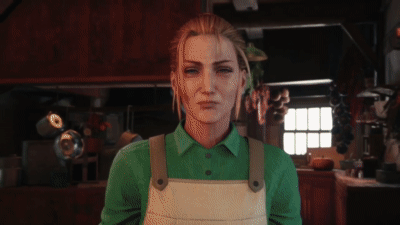
In the aptly named Ch. 14 resolutions, each marks the culmination of the character’s arc for the Part 1 of Remake. While their arcs are by no means complete, they do offer a nice preview of what their ultimate resolutions will be.
With the exception of Tifa’s, these resolutions are primarily about the character themselves. Their relationships with Cloud are secondary. Each resolution marks a change in the character themselves, but not necessarily a change in Cloud’s relationship with said character. Barret recommits to AVALANCHE’s mission and his role as a leader despite the deep personal costs. Aerith’s is full of foreshadowing as she accept her fate and impending death and decides to make the most of the time she has left. After trying to put aside her own feelings for the sake of others the whole time, Tifa finally allows herself to feel the full devastation of losing her home for the second time. Like her ultimate resolution in the Lifestream that we’ll see in about 25 years, Cloud is the only person she can share this sentiment with because he was the only person who was there.
Barret does not grow closer to Cloud through his resolution. Cloud has already proved himself to him by helping out on the pillar and reuniting him with Marlene. Barret resolution merely reveals that Barret is now comfortable enough with Cloud to share his past.
Similarly, Cloud starts off Aerith’s resolution with an intent to go rescue her, and ends with that intent still intact. Aerith is more open about her feelings here than before, it being a dream and all, but these feelings aren’t something that developed during this scene.
The only difference is during Tifa’s resolution. Cloud has been unable to emotionally comfort Tifa up until this point. It’s only when Tifa starts crying and rests her head upon his shoulder that he is able to make a change, to make a choice and hug her. Halfway through Tifa’s resolution, the scene shifts its focus to Cloud, his inaction and eventual action. Notably, the only time we have a close-up of any character during all three resolutions (I’ll define close-up here as a shot where a character’s face takes up half or more of the shot), are three shots of Cloud when he’s hugging/trying to hug Tifa. Tifa’s resolution is the only one where Cloud arcs.
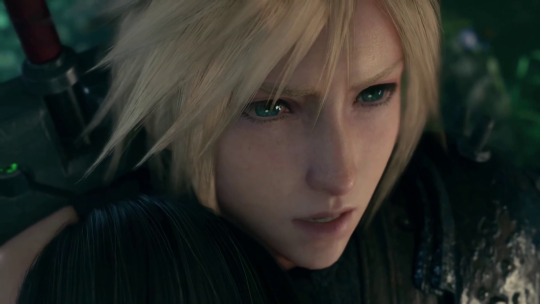
What of the whole “You can’t fall in love with me” line in Aerith’s resolution? Why would SE include that if not to foreshadow Cloud falling in love with Aerith? Or indicate that he has already? Well, you can’t just take the dialogue on its own, you how to look at how these lines are framed. Notably, when she says “you can’t fall in love with me,” Aerith is framed at the center of the shot, and almost looks like she’s directly addressing the player. It’s as much a warning for the player as it is for Cloud, which makes sense if you know her fate in the OG.
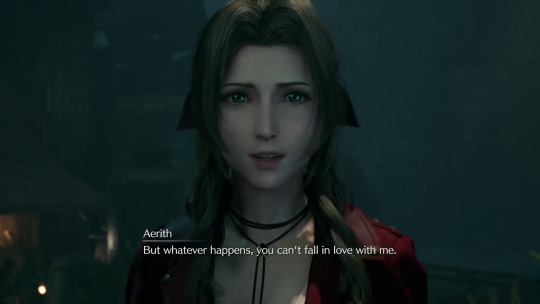
This is followed directly by her saying “Even if you think you have…it’s not real.” In this shot, it’s back to a standard shot/reverse shot where she is the left third of the frame. She is addressing Cloud here, which, again if you’ve played the OG, is another bit of heavy foreshadowing. The reason Clould would think he might be in love with Aerith is because he’s falsely assuming of the memories of a man who did love Aerith — Zack.
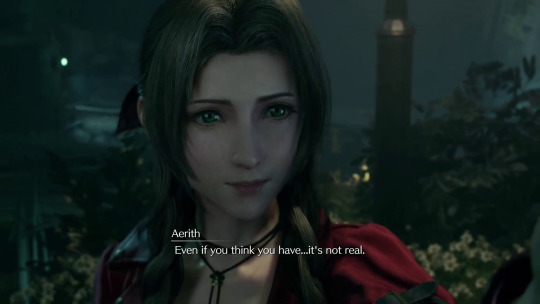
For Cloud’s response (”Do I get a say in all this?”/ “That’s very one-sided” depending on the translation), rather than showing a shot of his face, the Remake shows him with his back turned.
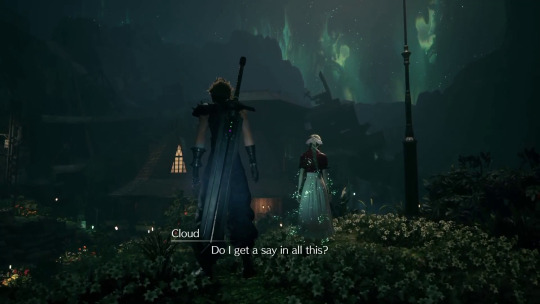
Whatever Cloud’s feelings may be for Aerith, the game seems rather indifferent to them.
What is more telling is the choice to include a bit with Cloud getting jealous over a guy trying to give Tifa flowers in Barret���s resolution. Barret also mentions both Jessie and Aerith in their conversation, but nothing else gets such a reaction from Cloud.
It also should go without saying that if Aerith’s resolution is meant to establish Cloud and Aerith’s romance, there should have been plenty of set-up beforehand and plenty of follow-through afterward. That obviously is not the case, because again, the Remake has gone out of its way to avoid moments where Cloud’s actions towards Aerith could be interpreted romantically.
Case in point, at around this time in the OG, Marlene tells Cloud that she thinks Aerith likes him and the player has the option to have Cloud express his hope that she does. This scene is completely eliminated from the Remake and replaced with a much more appropriate scene of father-daughter affection between Marlene and Barret while Tifa and Cloud are standing together outside.
The method by which they get up the plate is completely different in the Remake. Leslie is the one who helps them this time around, and though his quest to reunite with his fiance directly parallels with the trio’s desire to save Aerith, Leslie himself draws a comparison to earlier when Cloud was trying to rescue Tifa. Finally, when Abzu is defeated again, it is Barret who draws the parallel of their search for Aerith to Leslie’s search for his fiance, making it crystal clear that saving Aerith is a group effort rather than only Cloud’s.
Speaking of Barret, in the OG, he seems to reassess his opinion of Cloud in the Shinra HQ stairs when he sees Cloud working so hard to save Aerith and realizes he might actually care about other people. In the Remake, that reevaluation occurs after you complete all the Ch. 14 sidequests and help a bunch of NPCs. Arguably, this moment occurs even earlier in the Remake for Barret, after the Airbuster, when he realizes that Cloud is more concerned for his and Tifa’s safety than his own.
Overall, the entire Aerith rescue feels so anticlimactic in the Remake. In the OG, Cloud gets his big hero moment in the Shinra Building. He’s the one who runs up to Aerith when the glass shatters and they finally reunite. In the Remake, it’s unclear what the emotional stakes are for Cloud here. At their big reunion, all we get from him is a “Yep.” In fact, when you look at how this scene plays out, Aerith is positioned equally between Cloud and Tifa at the moment of her rescue. Cloud’s answer is again with his back turned to the camera. It’s Tifa who gets her own shot with her response.

Another instance of the Remake being completely indifferent to Cloud’s feelings for Aerith, and actually priotizing Tifa’s relationship with Aerith instead.
It is also Tifa who runs to reunite with Aerith after the group of enemies is defeated. Another moment that could have easily been Cloud’s that the Remake gives to Tifa.
Also completely eliminated in the Remake, is the “I’m your bodyguard. / The deal was for one date” exchange in the jail cells. In the Remake, after Ch. 8, the date isn’t brought up again at all; “the bodyguard” reference only comes up briefly in Ch. 11 and then never again.
In the Remake, the jail scene is replaced by the scene in Aerith’s childhood room. Despite the fact that this is Aerith’s room, it is Tifa’s face that Cloud first sees when he wakes. What purpose does this moment serve other than to showcase Cloud and Tifa’s intimacy and the other characters’ tacit acknowledgment of said intimacy?
(This is the second time where Cloud wakes up and Tifa is the first thing he sees. The other was at Corneo’s mansion. He comes to three times in the Remake, but in Ch. 8, even though Aerith is right in front of him, we start off with a few seconds of Cloud gazing around the church before settling on the person in front of him. Again, while not something that most players would notice, this feels like a deliberate choice.)
Especially since this scene itself is all about Aerith. She begins a sad story about her past, and Cloud, rather than trying to comfort her in any way, asks her to give us some exposition about the Ancients. When the Whispers surround her, even though Cloud is literally right there, it's Tifa who pulls her out of it and comforts her. Another moment that could have been Cloud that was given to Tifa, and honestly, this one feels almost bizarre.
Throughout the entire Shinra HQ episode, Cloud and Aerith haven’t had a single moment alone to themselves. The Drums scenario is completely invented for the Remake. The devs could have contrived a way for Cloud and Aerith to have some one-on-one time here and work through the feelings they expressed during Aerith’s resolution if they wanted. Instead, with the mandatory party configurations during this stage - Cloud & Barret on one side; Tifa & Aerith on the others, with Cloud & Tifa being the respective team leaders communicating over PHS, the Remake minimizes the amount of interaction Cloud and Aerith have with each other in this chapter.
On the rooftop, before Cloud’s solo fight with Rufus, even though Cloud is ostensibly doing all this so that they can bring Aerith to safety, the Remake doesn’t include a single shot that focuses on Aerith’s face and her reaction to his actions. The game has decided, whatever Aerith’s feelings are in this moment, they’re irrelevant to the story they’re trying to tell. Instead we get shots focusing solely on Barret and Tifa. While the Remake couldn’t find any time to develop Cloud and Aerith’s relationship at the Shinra Tower (even though the OG certainly did), it did find time to add a new scene where Tifa saves Cloud from certain death, while referencing their Promise.
A lot of weird shit happens after this, but it’s pretty much all plot and no character. We do get one more moment where Cloud saves Tifa (and Tifa alone) from the Red Whisper even though Aerith is literally right next to her. The Remake isn’t playing coy at all about where Cloud’s preferences lie.
The party order for the Sephiroth battle varies depending on how you fought the Whispers. All the other character entrances (whoever the 3rd party member is, then the 4th and Red) are essentially the exact same shots, with the characters replaced. It’s the first character entrance (which can only be Aerith or Tifa) that you have two distinct options.
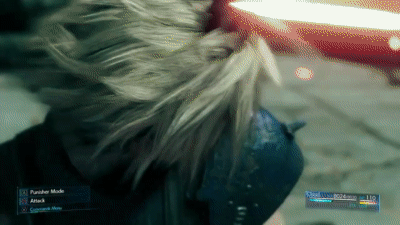
If Aerith is first, the camera pans from Cloud over to Aerith. It then cuts back to Cloud’s reaction, in a separate shot, as Aerith walks to join him (offscreen). It’s only when the player regains control of the characters that Cloud and Aerith ever share the frame.
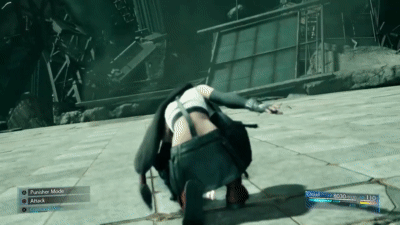
On the other hand, if Tifa is first, we see Tifa land from Cloud’s POV. Cloud then walks over to join Tifa and they immediately share a frame, facing Sephiroth together.
Again, this is not something SE would expect the player to notice the first or even second time around. Honestly, I doubt anyone would notice at all unless they watched all these variations back to back. That is telling in itself, that SE would go through all this effort (making these scenes unique rather than copy and pasting certainly takes more time and effort) to ensure that the depictions of Cloud’s relationships with these two women are distinct despite the fact that hardly anyone would notice. Even in the very last chapter of the game, they want us to see Cloud and Tifa as a pair and Cloud and Aerith as individuals.
Which isn’t to say that Aerith is being neglected in the Remake. Quite the opposite, in fact, when she has essentially become the main protagonist and the group’s spirtual leader in Ch. 18. Rather, her relationship with Cloud is no longer an essential part of her character. Not to mention, one of the very last shots of the Remake is about Aerith sensing Zack’s presence. Again, not the kind of thing you want to bring up if the game is supposed to show her being in love with Cloud.
What does it all mean????
Phew — now let’s step back and look and how the totality of these changes have reshaped our understanding of the story as a whole. Looking solely at the Midgar section of the OG, and ignoring everything that comes after it, it seems to tell a pretty straightforward story: Cloud is a cold-hearted jerk who doesn’t care about anyone else until he meets Aerith. It is through his relationship with Aerith that he begins to soften up and starts giving a damn about something other than himself. This culminates when he risks it all to rescue Aerith from the clutches of the game’s Big Bad itself, The Shinra Electric Company.
This was honestly the reason why I was dreading the Remake when I learned that it would only cover the Midgar segment. A game that’s merely an expansion of the Midgar section of the OG is probably going to leave a lot of people believing that Cloud & Aerith were the intended couple, and I didn’t want to wait years and perhaps decades for vindication after the Remake’s Lifestream Scene.
I imagine this very scenario is what motivated SE to make so many of these changes. In the OG, they could get away with misdirecting the audience for the first few hours of the game since the rest of the story and the reveals were already completed. The player merely had to pop in the next disc to get the real story. Such is not the case with the Remake. Had the the Remake followed the OG’s beats more closely, many players, including some who’ve never played the OG, would finish the Remake thinking that Cloud and Aerith were the intended couple. It would be years until they got the rest of the story, and at that point, the truth would feel much more like a betrayal. Like they’ve been cruelly strung along.
While they’ve gone out of their way to adapt most elements from the OG into the Remake, they’ve straight up eliminated many scenes that could be interpreted as Cloud’s romantic interest in Aerith. Instead, he seems much more interested in her knowledge as an Ancient than in her romantic affections. This is the path the Remake could be taking. Instead of Cloud being under the illusion of falling in love with Aerith, he’s under the illusion that the answer to his identity dilemma lies in Aerith’s Cetra heritage, when, of course, the answer was with Tifa all along.
Hiding Sephiroth’s existence during the Midgar arc isn’t necessary to telling the story of FF7, thus it’s been eliminated in the Remake. Similarly, pretending that Cloud and Aerith are going to end up together also isn’t necessary and would only confuse the player. Thus the LTD is no longer a part of the Remake.
If Aerith’s impact on Cloud has been diminished, what then is his arc in the Remake? Is it essentially just the same without the catalyst of Aerith? A cold guy at the start who eventually learns to care about others through the course of the game? Kind of, though arguably, this is who Remake!Cloud is all along, not just Cloud at the end of the Remake. Cloud is a guy who pretends to be a selfish jerk, but he deep down he really does care. He just doesn’t show this side of himself around people he’s unfamiliar with. So part of his arc in the Remake is opening up to the others, Barret, AVALANCHE and Aerith included, but these all span a chapter or two at most. They don’t straddle the entire game.
What is the throughline then? What is an area in which he exhibits continuous growth?
It’s Tifa. It’s his desire to fulfill his Promise to Tifa. Not just to protect her physically, but to be there for her emotionally, something that’s much harder to do. There’s the big moments like when he remembers the Promise in Ch. 4., his dramatic fist clench when he can’t stop Tifa from crying in Ch. 12, and in Ch. 13 when he watches Barret comfort Tifa. It’s all the flashbacks he has of her and the times he’s felt like he failed her. It’s the smaller moments where he can sense her nervousness and unease but the only thing he knows how to do is call her name. It’s all those times during battle, where Tifa can probably take care of herself, but Cloud has to save her because he can’t fail her again. All of this culminates in Tifa’s Resolution, where Tifa is in desperate need of comfort, and is specifically seeking Cloud’s comfort, and Cloud has no idea what to do. He hesitates because he’s clueless, because he doesn’t want to fuck it up, but finally, he makes the choice, he takes the risk, and he hugs her….and he kind of fucks it up. He hugs her too hard. Which is a great thing, because this arc isn’t anywhere close to being over. There’s still so much more to come. So many places this relationship will go.
We get a little preview of this when Tifa saves Cloud on the roof. Everything we thought we knew about their relationship has been flipped on its head. Tifa is the one saving Cloud here, near the end of this part of the Remake. Just as she will save Cloud in the Lifestream just before the end of the FF7 story as a whole. What does Tifa mean to Cloud? It’s one of the first questions posed in the Remake, and by the end, it remains unanswered.
Cloud’s character arc throughout the entire FF7 story is about his reconciling with his identity issues. This continues to develop through the Shinra Tower Chapters, but it certainly isn’t going to be resolved in Part 1 of the Remake. His character arc in the Remake — caring more about others/finding a way to finally comfort Tifa — is resolved in Ch. 14, well before rescuing Aerith, which is what makes her rescue feel so anticlimactic. The resolution of this external conflict isn’t tied to the protagonist’s emotional arc. This was not the case in the OG. I’m certainly not complaining about the change, but the Remake probably would have felt more satisfying as a whole if they hewed to the structure of the OG. Instead, it seems that SE has prioritized the clarity of the Remake series as a whole (leaving no doubt about where Cloud’s affections lie) over the effectiveness of the “climax” in the first entry of the Remake.
This is all clear if you only focus on the “story” of the Remake -- i.e., what the characters are saying and doing. If you extend your lens to the presentation of said story, and here I’m talking about who the game chooses to focus on during the scenes, how long they hold on these shots, which characters share the frame, which do not, etc --- it really could not be more obvious.
Does the camera need to linger for over 5 seconds on Cloud staring at the door after wishing Tifa goodnight? Does it need to find Cloud almost every time Tifa says or does anything so that we’re always aware of his watchfulness and the nature of his care? The answer is no until you realize this dynamic is integral to telling the story of Final Fantasy VII.
I don’t see how anyone who compares the Remake to the OG could come away from it thinking that the Remake series is going to reverse all of the work done in the OG and Compilation by having Cloud end up with Aerith.
Just because the ending seems to indicate that the events of the OG might not be set in stone, it doesn’t mean that the Remake will end with Aerith surviving and living happily ever after with Cloud. Even if Aerith does live (which again seems unlikely given the heavy foreshadowing of her death in the Remake), how do you come away from the Remake thinking that Cloud is going to choose Aerith over Tifa when SE has gone out of its way to remove scenes between Cloud and Aerith that could be interpreted as romantic? And gone out of its way to shove Cloud’s feelings for Tifa in the player’s face? The sequels would have to spend an obscene amount of time not only building Cloud and Aerith’s relationship from scratch, but also dismantling Cloud’s relationship with Tifa. It would be an absolute waste of time and resources, and there’s really no way to do so without making the characters look like assholes in the process.
Now could this happen? Sure, in the sense that literally anything could happen in the future. But in terms of outcomes that would make sense based on what’s come before, this particular scenario is about as plausible as Cloud deciding to relinquish his quest to find Sephiroth so that he can pursue his real dream of becoming at sandwich artist at Panera Bread.
It’s over! I promise!
Like you, I too cannot believe the number of words I’ve wasted on this subject. What is there left to say? The LTD doesn’t exist outside of the first disc of the OG. You'll only find evidence of SE perpetuating the LTD if you go into these stories with the assumption that 1) The LTD exists 2) it remains unanswered. But it’s not. We know that Cloud ends up with Tifa.
What the LTD has become is dissecting individual scenes and lines of dialogue, without considering the context of said things, and pretending as if the outcome is unknown and unknowable. If you took this tact to other aspects of FF7’s story, then it would be someone arguing that because there a number of scenes in the OG that seem to suggest that Meteor will successfully destroy the planet, this means that the question of whether or not our heroes save the world in the end is left ambiguous. No one does that because that would be utterly absurd. Individual moments in a story may suggest alternate outcomes to build tension, to keep us on our toes, but that doesn’t change the ending from being the ending. Our heroes stop Meteor. Cloud loves Tifa. Arguments against either should be treated with the same level of credulity (i.e., none).
It’s frustrating that the LTD, and insecurities about whether or not Cloud really loves Tifa, takes up so much oxygen in any discussion about these characters. And it’s a damn shame, because Cloud and Tifa’s relationship is so rich and expansive, and the so-called “LTD” is such a tiny sliver of that relationship, and one of the least interesting aspects. They’re wonderful because they’re just so damn normal. Unlike other Final Fantasy couples, what keeps them apart is not space and time and death, but the most human and painfully relatable emotion of all, fear. Fear that they can’t live up to the other’s expectations; fear that they might say the wrong thing. The fear that keeps them from admitting their feelings at the Water Tower, they’re finally able to overcome 7 years later in the Lifestream. They’re childhood friends but in a way they’re also strangers. Like other FF couples, we’re able to watch their entire relationship grow and unfold before our eyes. But they have such a history too, a history that we unravel with them at the same time. Every moment of their lives that SE has found worth depicting, they’ve been there for each other, even if they didn’t know it at the time. Theirs is a story that begins and ends with each other. Their is the story that makes Final Fantasy VII what it is.
If you’ve made it this far, many thanks for reading. I truly have no idea how to use this platform, so please direct any and all hatemail to my DMs at TLS, which I will then direct to the trash. (In all seriousness, I’d be happy to answer any specific questions you may have, but I feel like I’ve more than said my piece here.)
If there’s one thing you take away from this, I hope it’s to learn to ignore all the ridiculous arguments out there, and just enjoy the story that’s actually being told. It’s a good one.
376 notes
·
View notes
Text
Friday Night Stabby best quotes part 29 (10/09/21)
so Pearl is still filling in for Joker and yes I did watch seven out of eight POVs for this session, that’s why this quotes thing is so long :)
...
Evil: I forgot how to play this game. Endless: Go to electrical and die, Evil. That’s how you play the game.
...
Skizz, entering electrical: Look at all these idiots in here. Endless: Hey! That’s not very nice.
...
Endless: I remember how to fix wiring. It’s not that hard. Can I do [shields] from here? I can. I did it. I figured it out. Etho: Good job. Endless: Thanks. Thanks, Etho! Etho: I never stopped believing in you. Endless: Your praise means everything to me, dad. *pause as Endless walks away* Endless: He’s not my dad.
...
Impulse: *reports a body* Impulse: Okay just hold on, I can do this. Ready? Skizz’s voice in a clip: DANG IIIIT! Impulse: Did you guys hear that? Evil: Yes. Brody: What is that? Impulse: That was the last thing I heard when I caught Skizz red-handedly killing Mrs Tango. *people laugh, then pause* Skizz: I don’t like you.
...
Impulse: Tango wanted to die so he could fix his overlay. Tango, dead: I DID NOT! YOU’RE A LIAR! Impulse: Someone did him a favour, I think. Tango, dead: >:(
...
Evil, in a monotone: I have wires to do. Skizz, snorting: World’s most bored electrician. Evil, slightly less monotone: More wires.
...
Astro: I also want you to know that I didn’t kill you, on purpose. Cuz it’s your birthday. But that was your one round of- Endless: Not my birthday. My birthday was- Astro: It was yesterday. Endless: -hours and hours ago. Astro: It’s still technically your birthday somewhere. Endless: I don’t think that’s how time works, but okay.
...
*last round, Endless spent a long time with Astro but didn’t kill him despite being imposter* Astro: Alright, Endless. This time, you can kill me. Astro and Endless: *laugh* Astro: Don’t throw me off like that. I thought you were all i- Endless: *kills Astro* *pause* Astro: ...thanks, Endless. Thanks. *laughs* Well, I can’t complain; I DID ask for it.
...
Skizz: Now if I die, you know it’s Etho (pronouncing it Eh-tho). Etho: Hey now.
...
Impulse: Oh whoops, I was muted that whole meeting. Tango: Aha! Exactly what a killer would say.
...
Astro, a ghost: Hey Evil, did you know that Impulse’s bone is not- not well right now? Evil: *snickers* Astro, a ghost: See I KNEW you could hear me, you imposter!
...
Pearl: Did you have a neutral role? Impulse: Yeah, I was jester. Pearl: Ahhh. Cheeky nugget.
...
Brody: Tango. Two people saw you leave the corpse of your wife. Tango: So what? Where is the corpse of my wife? Brody: Where is the corpse? Two people saw you, are you really gonna try that? Tango: I just passed you in the hallway! Nothing was there! Pearl: He’s gonna play dumb, it’s okay. Impulse: He’s still mad that she threw out his spices when they moved. Tango: IT’S THE OLD BAY, MAN! IT’S THE OLD BAY!
...
Endless: It was Tango in O2 with the lead pipe- No, that’s not- Different game.
...
Etho: I was with Brody and Astro but I’m… invisible, apparently. Astro: I- I said there was somebody else! I just wasn’t going to say something that I thought might make you seem suspicious. Etho: It’s been happening a lot and it’s a little weird, but okay.
...
*after the meeting* Astro: I’ll notice you next time, Etho. Etho: Okay, thank you. That’s all I want.
...
Skizz: It’s the purple guy! Endless: It can’t be the purple guy! Evil: It CAN be the purple guy. *votes are revealed, Endless is ejected* Endless: D’aww, you guys don’t even know how- that’s… stupid. *everyone laughs* Skizz, laughing: “Your Honour, this is very dumb”
...
*everyone skipped except Endless who voted for Impulse* Endless: I got your number, Impulse. *pause* Astro: What’s his number? Four? Eight? Nine? Six? Evil: Two. Endless, at the same time: Seven.
...
*Etho claims Tango killed Evil but can’t say how he knows for fear of assassination* Endless: So you saw it on admin and then came down to report it? Is that what that was? *pause* Etho: Exactly. *animation of Etho shooting himself plays* Etho: DANGIT!!!
...
Etho: Where we going, Tango? What we doing? Tango: I’m going to my grave is where I think I’m going.
...
Astro: Hey, Mrs T? Mrs Tango: Hi? Astro: I need you to do something really suspicious. Mrs Tango: Okay.
...
*after Impulse crashed out of the game but his body is reported* Skizz: That was the most epic kill yet. It happened IRL.
...
Tango: Dead, disconnected. It’s all the same thing. Pearl: For one, you get cut in half, but the other, you just go “poof”.
...
*Etho is suspected of being executioner against Brody* Tango: So Etho, you’re saying there’s two imposters alive. Who do you think is the second one? *pause* Etho: That, I don’t know just yet. Tango: An executioner wouldn’t need to know that though, right? Etho: Maybe Astro. *long pause* Astro: What?! Why have you gone from Brody to me all of a sudden?!
...
Brody: Astro, please don’t kill me. Astro: I would’ve killed you long ago. Brody: That’s not true. You love me. Astro: Not after you accused me of- Brody, chuckling: I haven’t accused you of anything. Astro: You accused me of breathing heavily earlier and I’m offended by it. Brody: You did, though. Astro: I can’t help that the air quality here is… dog crap. Brody: I know you well enough. I know you well enough to know when you’re, like, concentrating. Astro: Not my fault that I can’t breathe here right now.
...
Etho: [Brody] killed Impulse on the first round. It made [Impulse] crash. And then [Brody] reported the body. Next round, he killed another person and did another report. He’s a- He’s a self-reporting… Brody. *everyone laughs* Evil: This is the best you’ve got, Etho?
...
Evil: So here’s the question for everybody: do I tell Skizz what his minor tell is or do I keep it to myself? Skizz: You zip it! You got nothing! Tango: Keep it to yourself. That’s part of the fun; we can all learn each other’s tells. Astro: You mean like when somebody has heavy breathing when they kill somebody, Brody? Brody: Oh. Astro: I’m gonna have extra heavy breathing when I kill you. Extra… EXTRA… heavy breathing. Brody: ...I’ll remember that.
...
Skizz: I finally kill the banana and instantly I hear him be all “you crashed my game!” Astro: Wait, so when I said that if Impulse rage-quit it was Skizz, I was actually correct on that? Skizz: You were right, yeah. Impulse: Wow… Endless: Skizz was like “if you’re not gonna rage quit, I’m gonna rage quit for you!” Skizz: I killed you so hard your game crashed. That’s a KILL right there.
...
Brody: Yeah, I’ve been actually watching her teleport. Like “wait, did she come out of that vent??” No, she’s teleporting around. Tango: Hacks! Pearl: Speedies! Astro: The hacks are Australian ping.
...
Astro: Hey, Evil. Evil: Hi. Are you gonna kill me? Astro: Do you want me to or do you want me to let you live? Evil: I’d like to live, thank you.
...
Evil: *runs into electrical and finds only Pearl in there* Pearl, singing: Rudolph the red nosed reindeer, had a very shiny nose. Evil: I’m done with my tasks. Pearl: *kills Evil immediately* Astro, a ghost: *laughs* You got killed to Christmas music, Evil.
...
Astro, dead: Hey Evil, how did it feel to get Christmas carolled as you were being killed? Evil, dead: She took the happiest time of the year and destroyed me with it!
...
Pearl: I’m gonna go kill Etho. Shhh. Giant Skizz, in a deep voice: You do it. Rock and roll.
...
Mrs Tango: My cooldown was so long and nobody was alone. Astro: It’s okay, Mrs Tango. Your speedy laggy Australian friend was killing all the people. Pearl: I literally told Skizz I was gonna kill Etho and I did exactly just that.
...
Brody: I cleaned [Etho] out of a vent and I didn’t know you could even do that but here we are. Endless: That’s awesome! Brody: I mean- I knew it, I knew you were in there, Etho. Sucker.
...
Endless: I know of one person who didn’t do the kill. Skizz: Who? Endless, whispering: Me. I was downloading in weapons. Skizz: You’re not gonna vouch for yourself. That’s not how justice works. Endless: Oh. My bad.
...
*Astro and Endless win as imposters* Endless: What did you do, Pearl? What happened there? Did you try to sheriff Skizz? Pearl: Yeah, I wanted to take a stab. I was the sheriff. I thought it might’ve been Skizz. Astro: Ohh, YOU got the last kill, Pearl? Pearl: Yeeaaahh. That was me. Skizz: THAT’s how we died? Cuz Pearl sheriffed the wrong person? Endless: It gets better than that. Pearl asked me to move away so she didn’t accidentally sheriff me. ...
Impulse: We getting double killed in here? Brody: Hopefully.
...
Brody: I’m voting for Tango; he’s having too much fun. Evil: Tango’s not allowed to have fun, we know that. Tango: Shut that down, yeah.
...
Pearl: *votes for Brody* Brody: Pearl. Why do you hate me? Pearl: I just have reasons. Skizz, to Brody: Don’t tug at THAT thread. Brody: Would you like to tell people about those reasons? Pearl: Not particularly.
...
Brody: Mrs Tango, do you want me to put like a poster of me in your new office? Of just me looking at you? Mrs Tango: Uhhh… Evil: Only if you’re wearing the pink hat. Brody: ONLY the pink hat. That’s it. *pause* Evil: Okay, that… that got awkward.
...
Astro: So would you like to know a good story? It’s a fun story. Etho: I would love to hear a good story right now, Astro. Astro: The fun story is that Mrs Tango thought that the comms were out and she wouldn’t get revealed walking away from her archnemesis, The Endless’s body. Tango: Well then I’m not voting for her at all, even if she did kill him, cuz that’s good by me. Etho: Ohoo… Evil: WOW.
...
Astro: Mrs Tango, you basically won the round; you killed Endless, so… *everyone laughs* Etho: That’s all we can hope for in the world, right? Tango: You kill Endless, you pretty much win, right? That doesn’t matter. *pause* Etho: Love you, Endless.
...
*Brody and Mrs Tango win as imposters after Brody framed Evil* Skizz: Evil, I’m so sorry, dude! Evil: No you’re not. Brody: I’m not sorry. I needed that in my heart. I’m not sorry. I’m not sorry whatsoever.
...
Impulse: Come watch me scan! Wanna watch me scan? C’mon! Watch this! It’s gonna be the best. Come watch. Astro: No, because I know what you’re gonna say and I’m not gonna stand for it. Impulse, hopping on the scanner: I’m not gonna do it, I’m not gonna do it. But that was- that’s legit. You saw that? Astro: You’re a little to the left. Impulse: I’m not gonna say it. But you’re gonna kill me anyway, so I might as well say it. Astro: You need to go to the right. Impulse: Did you watch me scan? Astro: You’re a little- You were- Impulse: Watch me nae nae. Astro, laughing: -a little far to the left.
...
Astro: I was coming from lab. Somebody was nae-naeing over there. Impulse: *giggles* Astro: Won’t say who, but somebody was. Impulse: There’s only one person here who does that.
...
Astro: I’m gonna come back cuz I don’t trust you. Brody: *scoffs* Okay. Astro: You murdered me last time! Brody, deadpan: I wouldn’t do that to you. That doesn’t sound like something I would do. Astro: Right in front of Evil and everything. I couldn’t get through the door. Brody, deadpan: I wouldn’t do that to you.
...
Endless: Hey, I’ve gotta fix the- I’m rebooting the wifi, sorry if it goes down. For a few minutes. Or A minute. Or until I come back here and, uh, reinitialise it. Brody, walking away: Endless, do you ever just stop talking? Etho, laughing: Ouch. Endless, following Brody: Hey, Brody. Let’s hang out, SIR. Brody: *laughs* Endless: How’ve you been, Brody? How’s your evening going? Brody: I’m fine. I’m fine. Are you gonna kill me? Endless: Are you always a jackass? Brody: Usually, yes. Are you gonna kill me or what? Endless: No, I don’t- I can’t kill you. But next time. Next time.
...
Endless: I’m definitely going to take a break so that I’m the last one back, and that’ll teach them to leave me here to entertain you. Pearl: Okay. Enjoy your water consumption. Endless: That’s very sweet of you. I appreciate that. You enjoy whatever consumption you’re doing as well.
...
Skizz, being ejected: You can’t be mayor and imposter, can you? Tango and Endless: No. Skizz: Well, I’m all sorts of twisted. Tango: You’re all sorts of dead.
...
*after Mrs Tango assassinated engineer Etho* Mrs Tango: I super appreciate you calling Etho out for being the engineer. Etho: I didn’t appreciate it.
...
Astro: I can tell you one thing: Etho’s not the engineer this round. Etho: You don’t know that for sure. Astro: Oh I think I do.
...
Astro: Hey Impulse. Impulse: Yeah? Astro: I just scanned. You know what else I did? Impulse: *gasps delightedly* You didn’t! Astro: I… *pause* Astro: Nah, I’m not gonna say it.
...
Impulse: *reports Astro’s body* Impulse: So. Astro scanned. But he did not nae nae. Just saying. Endless: I don’t think that’s how the song goes. Impulse: So I came to give him a stern talking to. But his body was dead.
...
Skizz: I’m doing my tasks. Tango: Your task is to assassinate. Skizz: That’s right, baby. And I’m coming for you next. Tango: Mhm. Bring it.
...
Astro: I can vouch for Evil cuz he watched me scan, Impulse watched me nae nae, and-. Impulse: Oh no. You’re gonna die now.
...
Skizz: Impulse sampled the Skizz! *pause* Impulse: Ew.
...
Brody: I’m not sorry I voted for you, Endless. Endless: Well, I’m glad that Mrs Tango didn’t. Brody: It’s cuz she doesn’t want to hurt your feelings. I will hurt your feelings.
...
Endless: I knew I got that wrong. Dangit. Simon Says- I blew it- I screwed it on the last… Brody: ...what? Endless: I feel like this should be the last game. I just… Tango: Are you having a nervous breakdown? What’s going on? Endless: Yeah, a little bit.
...
Endless: I voted for you, Brody. Cuz I hate everything about you. Brody: Thank you, buddy. I’ll vote for you also.
...
Pearl: Who we voting for? Brody: Endless. Endless: Brody. Tango: Why are we voting for Endless? Or Brody? Endless: Because Brody’s a jerk.
...
Pearl: This is awkward, cuz Tango was trying to get me to kill him. Tango: Do NOT pin that on me, my fair lady! Pearl: No no no, I’m not. Etho: Ooooh this is spicy :D Pearl: I’m pinning this on Skizz. Skizz just decided to walk by- Tango: Oh, okay. I’m good with that.
...
Brody: Etho, c’mere. Come here. That’s the second time you’ve ruined my fun. Etho: Were you sheriff? Brody: No. Don’t Starve- I say that and you ruin my fun and then Christmas music and you kill me. I just- Why do you hate me? Etho: I- I was just backing up my partner, y’know? Brody: Look, if you don’t wanna play Don’t Starve, you just say “hey man, I’m not into it”. That’s fine. See, you just say that. Etho: I like Don’t Starve. Brody: Evidently not with me.
...
Endless: It’s Brody’s fault for sussing me on that one. Brody: It’s not my fault you’re dumb.
...
Impulse: Keys or you’re sus! Brody: Keys or you’re… Impulse. Endless: Hey, I’M Impulse.
...
Astro, dead: Hey. Your wife killed me. Tango, dead: Good. Evil and Mrs Jerkface.
#friday night stabby quotes#friday night stabby#impulsesv#tangotek#skizzleman#etho#pearlescentmoon#astrozoan#mrstango#theendless#evilnotion#brodyman
37 notes
·
View notes
Photo
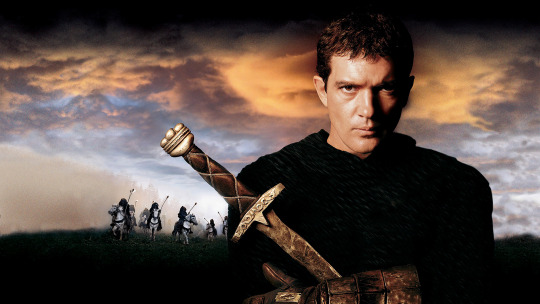
I’m going to start with pointing out that this:
“Lo there do I see my father. Lo there do I see my mother and my sisters and my brothers. Lo, there do I see the line of my people back to the beginning. Lo, they call out to me. They bid me take my place among them In the halls of Valhalla where the brave shall live forever.”
--is FROM this movie. I keep seeing it, or variations of it, circulated around media as if it’s a genuine historical prayer that Norsemen used in funerals. From well-meaning Tumblr users making gifsets to English white supremacist douchebags to freaking God of War this gets copied and pasted all the time and it makes me mad. One of those links goes into the history of the quote, which is derived from the book, which itself is derived from the historical record, but the words “Lo there do I see my father”? It’s not! I don’t mind that the movie uses this, but I hate that people, many of whom haven’t even seen this film, think it’s a piece of historical religion when it’s nothing of the sort.
STOP CLAIMING THIS IS HISTORY. IT ISN’T.
Anyway let’s actually talk about this movie.
Michael Crichton, on a bet from a colleague, wrote a book called Eaters of the Dead that’s a retelling of Beowulf from the point of view of Ibn Fadlan, a real life historical explorer who encountered Norsemen and is one of our early sources about Nordic culture in the medieval period. The book is meant to be read as a recently rediscovered historical document, but it’s also kind of a horror story, that strips away the overt supernatural elements of the original poem while still feeling like an epic fantasy quest and including other elements that are more speculative than historical, but still not outright magical.
It’s an interesting book, if you’re curious for something different.
A movie was made that was relatively faithful to the book, and then test audiences didn’t like it, so the director got fired and half of it was reshot by Crichton himself in the director’s chair and released. It didn’t do so well, costing the studio millions of dollars. But weirdly enough, I think the movie is seen fondly enough by casual audiences these days. It’s entered the culture somehow or another, if the prevalence of the “old Viking prayer” is anything to go by.
Basically, it goes like this: after falling in love with another man’s wife, Ibn Fadlan is reassigned from Baghdad to a far out post as an ambassador. He runs into some Norsemen, who are having a funeral for their king, and is there when they are called to go north and fight an unnamed evil by King Hrothgar. The soothsayer tells them that they need thirteen warriors, and that the thirteenth warrior must be a foreigner. So Ibn Fadlan, despite not being a fighter, gets roped into this adventure. He and his companions go on the journey and fight the wendol, a race of monsters that come with the mist and attack, taking people’s heads and eating corpses. They have to figure out how to kill these things and bring peace back to the land.
The main weakness with this movie, in my opinion, is that I don’t know who most of these people are. A good chunk of them aren’t named on screen in the film, despite the fact that there are thirteen of them. Vladimir Kulich, who plays Buliwyf, had his own ideas as to how to fix that in a short amount of time--have a scene during the trip where the camera goes through the entire crew, pausing on each member and showing their traits, but this never happened.
But the main Norseman in the group that Ibn Fadlan hangs out with? I could not tell you his name. According to things I’ve looked up, it's ‘Herger’ but I couldn’t be sure that’s accurate. That’s frustrating. I don’t need all of their backstories (although why one of them is apparently a Scotsman would be nice to know), but I would like to know at least a handful of their names so I cared what happened to them. Oddly, the credits give them a quick descriptor, but not all of those descriptors actually match, and it isn’t as if there’s indicators before some of them are killed off.
What I can tell you is that Antonio Banderas plays Ibn Fadlan. He does pretty well considering he’s not Arab. Yes, it would have been better to get an Arabic performer, but Banderas isn’t bad in the role. He’s a lot more of an action hero in the movie than in the book, but not so much that I ever felt like it was too much of a stretch.
Dennis Storhoi is Herger, the one Norseman who gets the most personality. He’s clearly having fun in the role, playing a Norseman who acts like he doesn’t take anything seriously but has a better grasp of what the others are thinking and how they’re going to act than he lets on. I liked him.
I mentioned Vladimir Kulich earlier plays Buliwyf, this story’s Beowulf. He plays it very stoically, which I felt worked for the character they’re portraying. However, I can understand if some viewers found it a boring performance. I didn’t think so--I thought he came across as thoughtful and calm despite his situation, very rarely having to raise his voice and yet still commanding respect.
The action scenes are alright--I can’t say there were amazing fight sequences, but they do feel like appropriately epic battles, and there aren’t any annoying camera tricks, and absolutely no CGI at all that I can find.
So yes, it’s a bit corny as a historical epic movie, but I think it holds up well enough. It’s a bit of fun, and if you’re familiar with the original poem, it’s an enjoyable movie. I think it’s worth seeing. I can understand that it’s not for everyone, but for me it worked.
I’m just tired of seeing that “traditional Viking prayer” all over the place.
21 notes
·
View notes